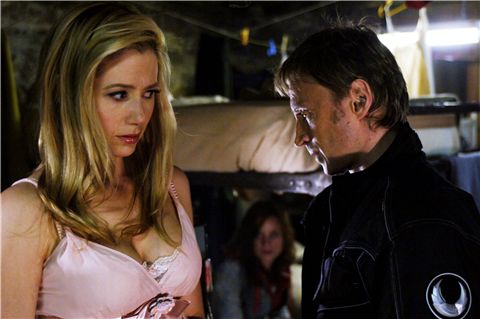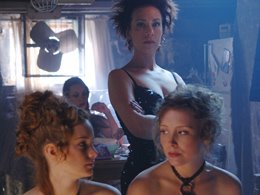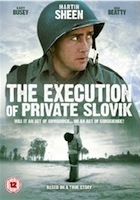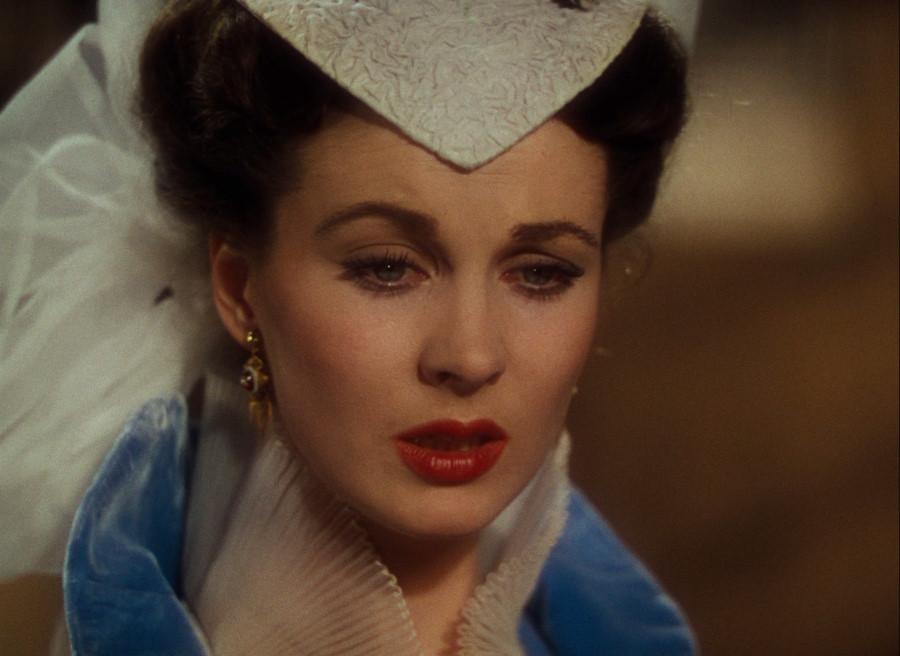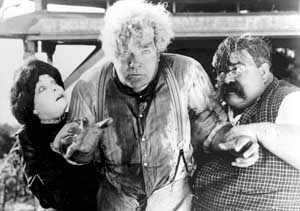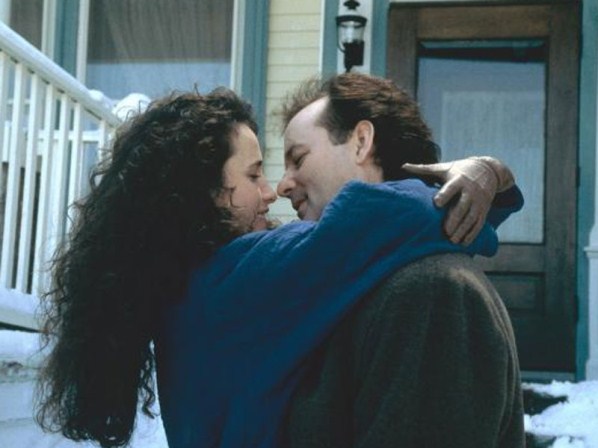Each Dawn I Die**** 1940
VIDEO
http://www.tcm.com/mediaroom/video/247514/Each-Dawn-I-Die-Movie-Clip-Parole-Board.html
http://www.tcm.com/mediaroom/video/247515/Each-Dawn-I-Die-Movie-Clip-Bum-Rap.html
http://en.wikipedia.org/wiki/Each_Dawn_I_Die
Otis Ferguson has said of Each Dawn I Die that "the story is of the kind you would have to see to disbelieve." And to be sure, the film is
nothing more than a sampler of '30s prison-film conventions. But with the brilliant acting by James Cagney and the fast-paced and
hard-edged direction of William Keighley, the film clatters past like an express train. Cagney plays Frank Ross, an innocent
newspaperman who is railroaded into prison by a corrupt district attorney. In prison, he meets hardened-con Stacey (George Raft).
Frank, at first, doesn't want to associate with Stacey and the other prisoners, but trapped in the hellhole prison, he more and more
turns into a bitter con. Finally granted a hearing from the parole board, Frank pleads his innocence, but the parole board is headed
by Grayce (Victor Jury), the man responsible for his imprisonment, and his parole is denied, and Frank becomes more hardened
and embittered. By this point, Stacey has befriended him and agrees to help Frank prove his innocence. ~ Paul Brenner, Rovi
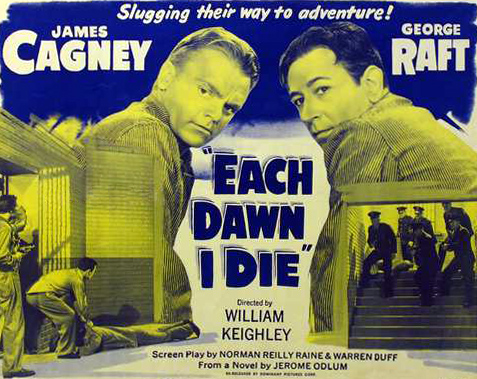
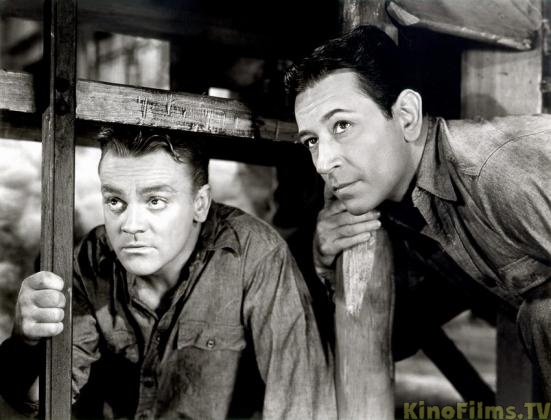
_03.jpg?timestamp=1344988333272)
Easiest Way, The****1/2 1931
VIDEO
http://www.tcm.com/mediaroom/video/551262/Easiest-Way-The-Movie-Clip-Money-s-All-That-Counts.html
http://en.wikipedia.org/wiki/The_Easiest_Way
http://laurasmiscmusings.blogspot.ca/2009/02/tonights-movie-easiest-way-1931.html
Brought up to date with considerable skill, the play that created a sensation on the stage some twenty years ago emerges as a rather
interesting film. Time has, however, robbed it of its daring. You will find the heroine, Laura Murdock, one of the familiar sisterhood who
exchange poverty in the tenements for the luxury of modernistic apartments with all convienences, including a duplicate key in the hands
of a rich man. But instead of the modern accompainment of wisecracks Laura goes in for old-fashioned suffering.
Realistically the squalor of Laura’s home life is pictured to excuse her choice of the easiest way to escape it. Then she meets a young man
who offers her love instead of money and they plan to marry with the knowledge of Laura’s cher ami. But her fiance is ordered to South
America and she promises to wait for him. No longer a kept woman, she shifts for herself and makes a bad job of it. Her discarded friend
waits, sure that she will return. She does, when everything is pawned. Joyfully her young man returns to claim her and learns the truth.
He flings at her a bitter invective and leaves for good, while she wanders brokenly in the snow to her sister’s home on Christmas Eve.
All this is related with movement, deftness of characterization, some suspence, and little emotional reaction. Constance Bennett is
symapthetic as Laura, though she fails to make you believe that she is swept into her troubles without calculation. She does, however,
convince you that she thinks and that is saying a lot. Adolphe Menjou is brilliantly successful as the pseudo-villain, who is so much a
human being and a gentleman that he is no villain at all. Robert Montgomery returns to form as the young lover and makes us forget his
defection in “Inspiration.” Minor roles are admirably performed by Anita Page, Clark Gable and Marjorie Rambeau.
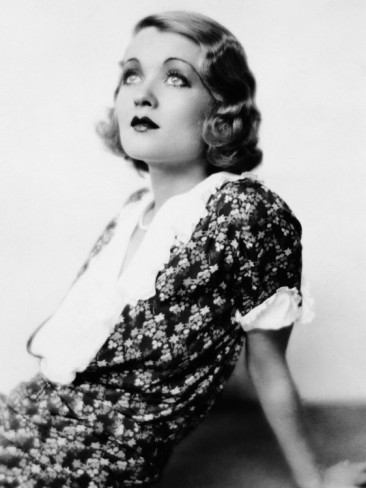
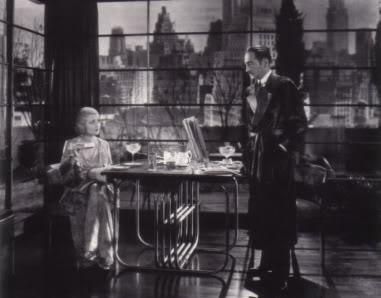
East Side, West Side**** 1949
http://www.classicfilmguide.com/index7e6e.html
http://www.tcm.com/mediaroom/video/464029/East-Side-West-Side-Movie-Clip-Character-Witness.html
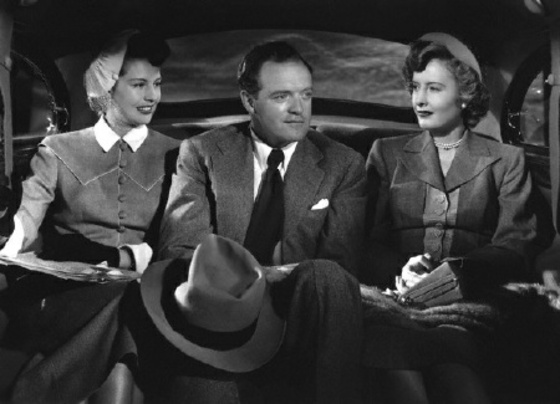
All Movie Guidabeth****1/2 2007e
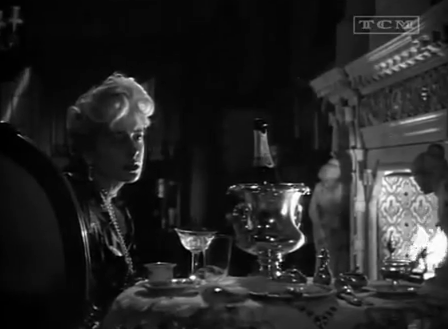
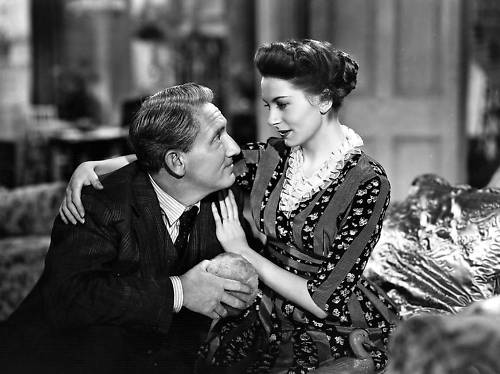
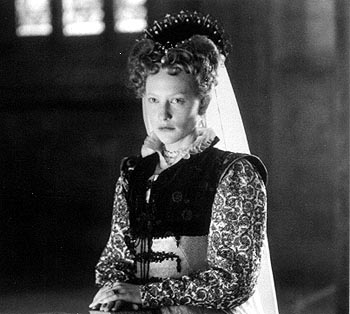
In 1558, the Roman Catholic Mary I of England dies of a cancerous tumour in her uterus, leaving her Protestant half-sister Elizabeth as queen. Elizabeth had
previously been jailed for a supposed conspiracy to murder Mary but has now been freed for her coronation. The film shows Elizabeth being courted by suitors
(including Henri, Duc d'Anjou, the future King Henry III of France, whom she rejects) and urged by William Cecil, 1st Baron Burghley to marry, which, as he states,
would secure her throne. Instead, she has a secret affair with her childhood sweetheart, Robert Dudley, Earl of Leicester. The affair is, however, no secret from Cecil—
who makes it clear that a monarch has no private life.Elizabeth deals with various threats to her reign, including The Duke of Norfolk; her Catholic cousin, Mary, Queen
of Scots, who conspires to have her murdered; and the regent of Scotland, Mary of Guise, who allies with France to attack England's forces. At the end of the film,
Norfolk is executed for his conspiracy and Mary is assassinated by Elizabeth's advisor, Francis Walsingham. Elizabeth permanently banishes Dudley from her private
presence when she finds out that he is married; as depicted in the sequel, Elizabeth then gives up ever having sex again, feeling that such relations could give a man
too much power over her. Moreover, cutting off her relations with Dudley is part of the process by which she becomes increasingly tough and assertive—in one scene
she carefully prepares and rehearses the speech she would deliver to a recalcitrant Parliament and force through her religious reforms.
She also becomes capable of occasional ruthless behaviour—as in unflinchingly ordering the execution of those who she considers dangerous to her rule, as well as
taking up as her right-hand man the Machiavellian Walsingham, who thinks nothing of torturing people or killing with his own hands. All this is a considerable change
from the warm-hearted, rather romantic girl which Elizabeth was in the early parts of the film; remaining such would have been incompatible with being a queen who
actually ruled and dominated the men around her, and her transformation is a major theme of the film.
The film ends with Elizabeth assuming the white-faced and -gowned persona of 'The Virgin Queen', and initiating England's
Ella Cinders is one of those Jazz Era waifs, a classic flapper with big eyes, a bob hair-do, and moxie to spare! She'll need that moxie to surmount the obstacles in her path, from wicked stepsisters (you got the wordplay of the title, right?) to the leering leches of Hollywood, as she makes her way from destitution to stardom.
This journey took place not only on the comics page, but in real life, as well. Only a year after her 1925 comic debut, Ella Cinders was adapted into a successful silent film(sadly out of print), starring the appropriately delectable Colleen Moore. The film and the strip were both hits, and Ella remained in the funnies until 1961, while Colleen Moore continued to enjoy fame in the silents.
It's easy to see why Ella is so beloved, she's cute as a bug and her speech patterns are a treat to read! Every line of dialog from her mouth is packed with vintage vernacular and sassy similes. The art is as great as the writing, with character designs that just pop off the page, especially as the strip gets into high gear and Ella journeys to Hollywood. I'm often reminded of Will Elder's contorted faces and distended postures as I peruse these strips, and that's high praise from this Mad Mag Maniac!
O-gee-gosh!
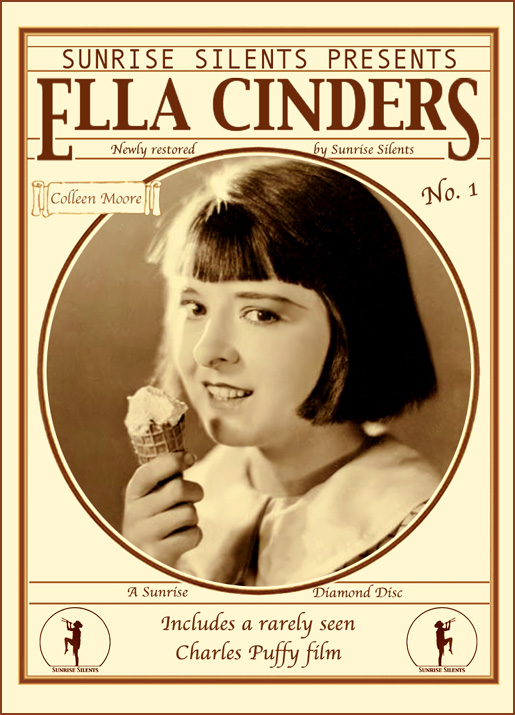
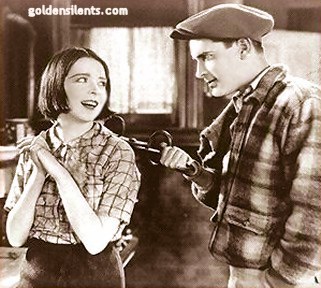
E. T. the Extra Terrestrial***1/2 1982
http://blog.moviefone.com/2011/03/08/e-t-the-extra-terrestrial-discussion/
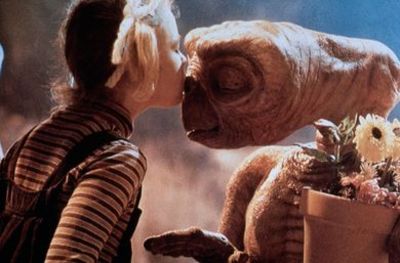
The film opens in a Northern California forest as a group of alien botanists collect flora samples. U.S. government agents appear
Elliott feigns illness the next morning to avoid school so he can play with the alien. That afternoon, Michael and their younger
sister, Gertie, meet the alien. They decide to keep him and hide him from their mother. When the children ask it about its
origin, it answers by levitating balls to represent its solar system and further demonstrates its powers by reviving a dead plant.
At school the next day, Elliott begins to experience a psychic connection with the alien. Exhibiting signs of intoxication due to
the alien's own intoxication from drinking beer, Elliott begins freeing all the frogs from a dissection class. As the alien watches
John Wayne kiss Maureen O'Hara in The Quiet Man, Elliott's psychic link causes him to kiss a girl he likes (Erika Eleniak) in the
same manner.
The alien learns to speak English by repeating what Gertie says as she watches Sesame Street and, at Elliott's urging, dubs itself
"E.T." It enlists Elliott's help in building a device to "phone home" by using a Speak & Spell toy. Michael starts to notice that
E.T.'s health is declining and that Elliott is referring to himself as "we". On Halloween, Michael and Elliott dress E.T. as a ghost
so they can sneak him out of the house. Elliott and E.T. ride a bicycle to the forest, where E.T. makes a successful call home.
The next morning, Elliott wakes up to find E.T. gone, and returns home to his distressed family. Michael finds E.T. dying in the
forest, and takes the alien to Elliott, who is also dying. Mary becomes frightened when she discovers her son's illness and the
dying alien, before government agents invade the house.
Scientists set up a medical facility in the house, quarantining Elliott and E.T. Their link disappears, and E.T. then appears to die
while Elliott recovers. A grief-stricken Elliott is left alone with the motionless alien when he notices a dead flower, the plant E.T.
had previously revived, coming back to life. E.T. reanimates and reveals that his people are returning. Elliott and Michael steal
a van that E.T. had been loaded into and a chase ensues, with Michael's friends joining them as they attempt to evade the
authorities by bicycle. Suddenly facing a dead end, they escape as E.T. uses telekinesis to lift them into the air and toward the
forest. Standing near the spaceship, E.T.'s heart glows as he prepares to return home. Mary, Gertie, and "Keys", a government
agent, show up. E.T. says goodbye to Michael and Gertie, and before entering the spaceship, tells Elliott "I'll be right here",
pointing his glowing finger to Elliott's heart. E.T. then picks up the flower pot Gertie gave him, walks into the spaceship, and
takes off, leaving a rainbow in the sky as Elliott watches the ship leave.
Everyone Says I Love You***1/2 1996
VIDEO
http://www.youtube.com/watch?v=K-GAM3VUVJo
http://www.ebertfest.com/three/3everyone_rev.htm
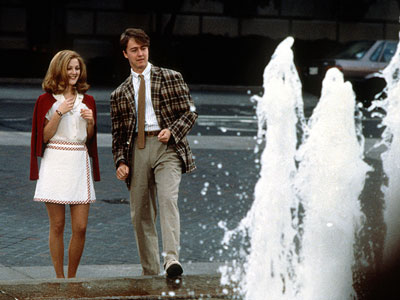
Writer-director Woody Allen has produced yet another challenging and funny film, this time taking on the musical genre and
bending it to his own unique vision. The result is one of the most charming films in recent years, as Allen assembles a typically
sterling ensemble cast to evoke the romanticism of years past. This time, the large cast (including Alan Alda, Drew Barrymore,
Goldie Hawn, Edward Norton, and Tim Roth) not only turn in funny and touching performances, but they sing the classic songs
of the 1930s and 1940s themselves, and sing them very well. The plot centers on an extended family in New York and their
various romantic entanglements, including Allen's pursuit of Julia Roberts through the streets of Paris and the canals of Venice.
The musical numbers are the film's high point, displaying wonderful choreography ranging from a room full of dancing Groucho
Marxes to a dancing couple in flight at the banks of the Seine. Everyone Says I Love You is a witty and entertaining fantasy,
and a truly romantic escape. --Robert Lane
Eve's Bayou****1/2 1997
http://en.wikipedia.org/wiki/Eve's_Bayou
VIDEO
http://www.youtube.com/watch?v=gBymljmGDoA
A young girl learns some difficult lessons about truth, love, and fidelity in this critically-acclaimed Southern gothic drama. Eve Batiste
(Jurnee Smollett) is a ten-year-old girl whose father Louis (Samuel L. Jackson) is a successful and well-liked doctor in an
African-American community in Louisiana. Louis is a good father and an excellent provider, but he also has a way of attracting the
ladies, and he's not inclined to turn them away. One night, the Batistes hold a party, and Eve, her older sister Cisely (Meagan
Good), and their mother Roz (Lynn Whitfield) all notice that Louis is spending a great deal of time dancing with the same woman.
Eve later spies her father and the woman in an embrace in the carriage house, though Louis unconvincingly claims that nothing
untoward was happening. The evidence of Louis' infidelity takes a toll on the entire family: Cisely, who at age 14 is walking the
middle-ground between being a girl and a woman, becomes sullen and confused about her new emotions, Roz takes out her
frustrations on her loved ones, and Eve visits Elzora (Diahann Carroll), a voodoo priestess, looking for advice and possibly revenge.
Meanwhile, Eve's Aunt Mozelle (Debbi Morgan), who claims to have psychic powers, arrives to stay with the family after the death of
her third husband, though she isn't lonely for long after meeting the eccentric Julien Greyraven (Vondie Curtis-Hall). Eve's Bayou
was the first project as writer-director for actress Kasi Lemmons; leading man Samuel L. Jackson also co-produced.
~ Mark Deming, Rovi
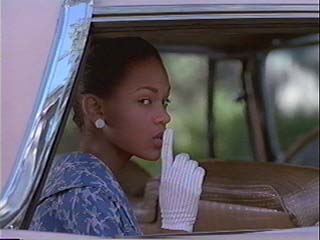
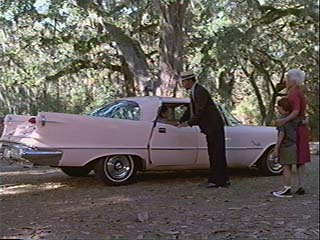
Execution of Private Slovik, The (TV) **** 1974
VIDEO
http://www.youtube.com/watch?v=CUKEupQbqj8
http://www.answers.com/topic/the-execution-of-private-slovik
In January 1945, Private Eddie Slovik was executed in France, the only American soldier shot for desertion since the civil war. General
Eisenhower refused to commute the sentence (as he later, when president, refused to reprieve the Rosenbergs).
Buy it from 
The Pentagon attempted unsuccessfully to repress William Bradford Huie's 1954 book on the subject. In
1960, Frank Sinatra cancelled his proposed film version (scripted by blacklisted writer Albert Maltz) under
pressure from Joseph Kennedy, who thought Sinatra's involvement in such a controversial project would
damage JFK's presidential prospects. In formerly blacklisted Carl Foreman's The Victors(1963), a wintry
firing squad scene inspired by the Slovik affair is accompanied by Sinatra's Have Yourself a Merry Little
Christmas.
The movie was finally made for TV by the reliable Lamont Johnson. It attracted a record audience for a
one-off TV drama and is a sombre, sober, unsentimental work about chance fate, the arbitrary horrors of
war and people trapped in a bureaucratic machine.
The film unfolds in flashbacks from the day of execution and Martin Sheen gives one of his finest
performances as the sad, bewildered young GI, a former petty criminal torn from a brief experience of happiness with his loving wife
and sent to war. Ned Beatty is excellent as the chaplain assigned to care for Slovik in his final hours. It can be spoken of in the same
breath as Kubrick's Paths of Glory and Losey'sKing & Country.
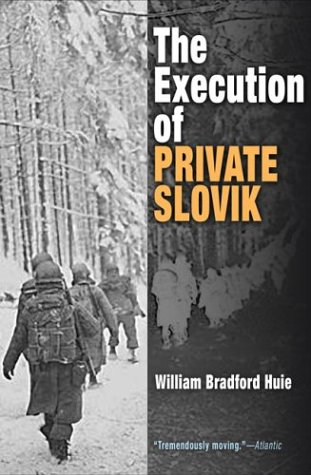
.jpg?timestamp=1350795782937)
Executive Suite**** 1954
http://movies.nytimes.com/movie/review?res=9901EFDD153AE53BBC4F53DFB366838F649EDE
http://www.tcm.com/mediaroom/video/346228/Executive-Suite-Movie-Clip-He-s-A-Big-Man.html
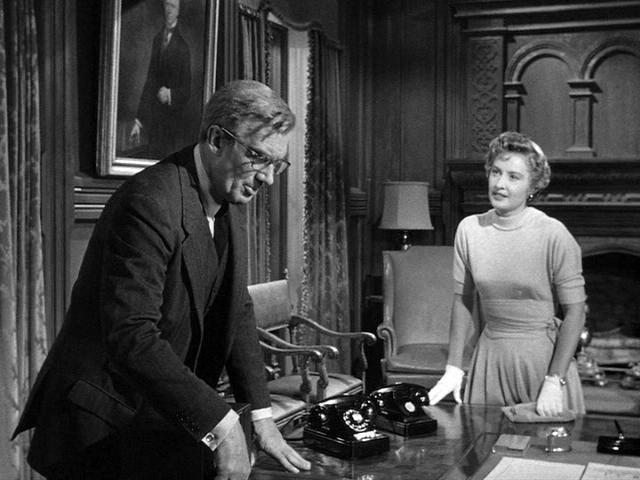
Avery Bullard, president and driving force of the Tredway Corporation, dies at a critical time. Bullard had lost his way in recent
years and the furniture manufacturing company had steadily lost ground to the competition. But he had not groomed a successor,
so the board of directors must vote for his replacement. The frontrunner is the ambitious but unimaginative Loren Shaw, the
company Controller concerned more with profitability and satisfying the stockholders than rejuvenating the company. He has the
backing of the main shareholder, Julia Tredway, who had been hopelessly in love with Bullard. In addition, "independent" board
member George Caswell offers his support in return for certain lucrative considerations. The only viable alternative is idealistic
VP of Design Don Walling, who isn't even sure he wants the job. He would rather spend his time developing new products and
more efficient manufacturing methods, and his wife Mary is strongly against his giving up that dream to take a new position
inside the executive suite. Walling is supported by company Treasurer Frederick Alderson, Bullard's best friend, who sees
Walling as the best hope for saving the company but fears he might be a good five years too young for the job. VP of
Manufacturing Jesse Grimm is opposed to Walling for reasons of his own while VP of Sales Walt Dudley is being blackmailed by
Shaw, having been caught by him having an affair. The machinations, bargaining and maneuvering leading up to the election
propel the plot. In the end, Walling's enthusiasm and vision win over Julia Tredway, the others jump on the bandwagon, and he
is elected.
11.
Fabulous Baker Boys, The ***1/2 1989
VIDEO
http://www.youtube.com/watch?v=5jFB61kPIaQ
http://movies.nytimes.com/movie/review?res=950DE0D81331F930A25753C1A96F948260
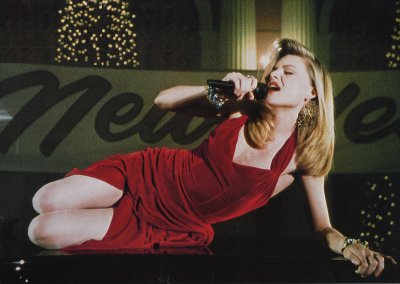
Jack Baker (Jeff Bridges) and Frank Baker (Beau Bridges) are brothers, living in Seattle, making a meagre living playing in seedy
lounges and piano bars. Frank handles the business aspect while Jack (single and more talented as a player) feels disillusioned.
In despair, they hold auditions for a female singer to join the outfit, ending up with the beautiful but hard-nosed Susie Diamond
(Michelle Pfeiffer), a former escort with unusual charisma. The new act, with Susie headlining, becomes unexpectedly successful
and leads to bigger gigs and better money, but the sexual tension between Susie and Jack reaches boiling point at a New Year's
Eve show, and in the absence of dutiful husband and father Frank, they give in to their urges. However, Jack's inability to
express his feelings leads their relationship to disintegrate, at the same time as Frank and Jack's brotherly feud escalates. The
act eventually breaks up, and Susie moves on to pastures new, while the brothers reconcile.
Face/Off***1/2
 1997VIDEO
1997VIDEO
http://www.youtube.com/watch?v=5jFB61kPIaQ
http://en.wikipedia.org/wiki/Face/Off
This film starred both Nicholas Cage and John Travolta in a movie in which they actually switch roles during the movie.
At first Nicholas Cage plays a criminal mastermind which is finally captured. In order to stop his operations police detective
John Travolta takes the face of Nicholas Cage and assumes his identity. A microchip allows for the proper voice to be produced.
He then travels to the accomplices of this old criminal enemy and prepares to take them all in by tricking them first.
Nicholas Cage escapes and ultimately goes to the doctor that took his face. He has Travolta's face put on his body, and a sound
chip installed to mimic his voice. He then assumes the identity of the police detective that stalked hime for so many years.
He enjoys time with the detective's wife and enjoys his new found police powers. He hunts Nicholas Cage, and no one it seems
knows that the detective is really the criminal they all seek. The movie ends with a massive pistol battle. With action and
intrigue, Face Off presents a battle between two monumental figures on screen.
Factory Girl****1/2 2006
VIDEO
http://www.youtube.com/watch?v=qFgFeY-PYBE
http://www.moviefone.com/movie/factory-girl/25513/main
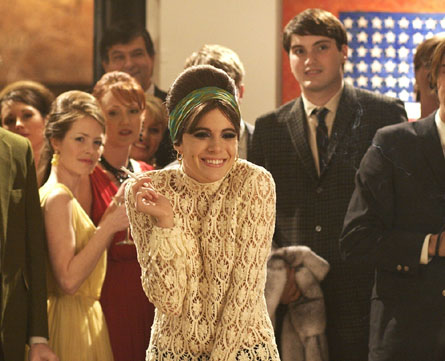
die Sedgwick (Sienna Miller) is a young heiress studying art in Cambridge, Massachusetts. She moves to New York City, where
she is introduced to Pop Art painter and film-maker Andy Warhol (Guy Pearce). Intrigued by the beautiful socialite, he asks her
to perform in one of his underground movies. Soon she is spending time with him at the Factory, his studio and also the
hangout of a group of eccentrics, some of them addicts. Her status as Warhol Superstar and success as a fashion model gain
her popularity and international attention.
Her Cambridge friend Sid introduces her to poet and singer Billy Quinn (Hayden Christensen). The makers of Factory Girl created
this character so as to resemble Bob Dylan. Edie sees that Andy is irritated when she tells him about Billy. She tries but fails to
keep her love affair with Billy a secret. To reconcile them, she arranges a meeting. Although he agrees to be filmed by Andy,
when Billy visits the studio he shows his contempt. As he is leaving, she tries once more to make peace, but Billy calls Andy a
"bloodsucker" who will "kill" her. Seeing that she will stay, he kisses her forehead.
As addiction takes its toll, Edie's relationship with Andy deteriorates. Confused, she is unaware of the danger while smoking in
bed and starts a fire, surviving with burns. Vogue magazine refuses to hire her as a model, editor Diana Vreeland (Ileana
Douglas) explaining that Edie is considered "vulgar". Interrupting a luncheon of Andy and his friends, she demands to be paid
and accuses him of ruining her, shouting obscenities.
When Sid sees her again, she has become a prostitute. In a taxi, he shows Edie, who is very depressed, a photo of herself when
they were art students. He says that he fell in love with her then, and tells her that she can still be an artist. She says that she
cannot bear her loneliness but interrupts him, asking the driver, "Can we go?" When the driver says that they are stuck in a
traffic jam, she leaves the cab and runs frantically down the street. The scene changes to a hospital, years in the future. She
tells an interviewer that she is overcoming her addiction and is glad to be home in Santa Barbara. Captions give facts about her
last few years, her struggle to control drug abuse and her marriage to another patient, which ended in less than four month
when she died of an overdose.
Facts of Life, The ***1/2 1960
http://www.answers.com/topic/the-facts-of-life-film
http://www.tcm.com/mediaroom/video/115204/Facts-of-Life-The-Original-Trailer-.html
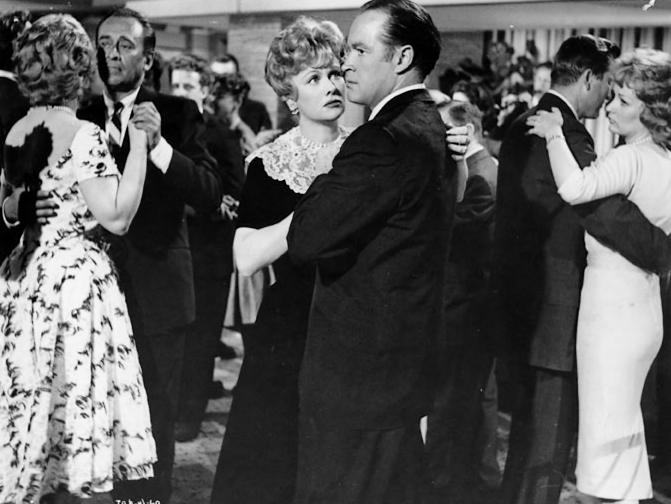
The Facts of Life is a 1960 romantic comedy starring Bob Hope and Lucille Ball as middle-aged people who have an affair despite
being married to other people. Written, directed, and produced by the longtime Hope associates Melvin Frank and
Norman Panama, the film was more serious than many other contemporary Hope vehicles. The film was nominated for five
Academy Awards, winning one for Costume Design (for Edith Head and Edward Stevenson). For her performance, Lucille Ball
was nominated for a Golden Globe for Best Actress – Comedy.
As the yearly vacation of six neighbors, the Gilberts, Masons, and Weavers, approaches, Kitty Weaver (Lucille Ball) and Larry
Gilbert (Bob Hope) find themselves frustrated with the routine. When both their spouses (Ruth Hussey and Don DeFore) are
kept away from the vacation, Kitty and Larry find themselves alone in Acapulco, with the Masons (Philip Ober and Marianne
Stewart) bedridden with illness. Forced together, Kitty and Larry fall in love. Once the vacation is over, however, they have
difficulties in either abandoning or continuing their romance.
Fail-Safe**** 1964
http://en.wikipedia.org/wiki/Fail-Safe_(1964_film)
VIDEO
http://www.youtube.com/watch?v=KULM72PoaOo
http://www.youtube.com/watch?v=p-6xcIUwPto
Warren Black is a brigader general in the US Air Force who is troubled by a nightmare about a matador. Walter Groeteschele is a
professor with some audacious theories about nuclear warfare. Carl Cascio is an Air Force Colonel ashamed of his low-class
upbringing and is XO of Strategic Air Command's commanding general Frank Bogan. Jack Grady is an old-school Air Force Colonel
who leads a squadron of Vindicator nuclear bombers. Gordon Knapp is head of a defense electronics contractor. Hubert Raskob is
a visiting Congressman. Peter Buck is translator to the President of the United States. And all of these men become enveloped in
the ultimate accident; when a malfunction damages SAC's fault indicator, the system is changed routinely, but it causes a
malfunction in the mainframe that launches Jack Grady's squadron on an attack mission to obliterate Moscow. When the full horror
of the accidental attack order becomes clear, SAC and the President must work to recall or stop the bombers, but all efforts are frustrated
by the skill and working orders of the pilots involved as well as the power of their planes, and when they penetrate Soviet airspace a running sky
battle erupts. But the bombers press on, and through negotiations with the Soviet premier, the President is left with but one hope of averting
Armageddon, an order so audacious it even shocks the Soviet premier and leaves the President's subalters speechless. Written by Michael Daly
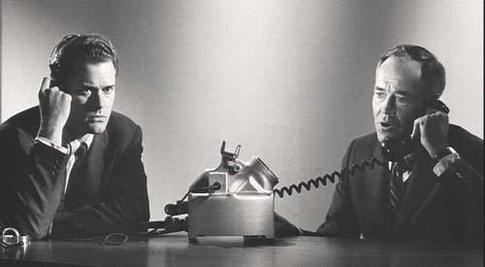
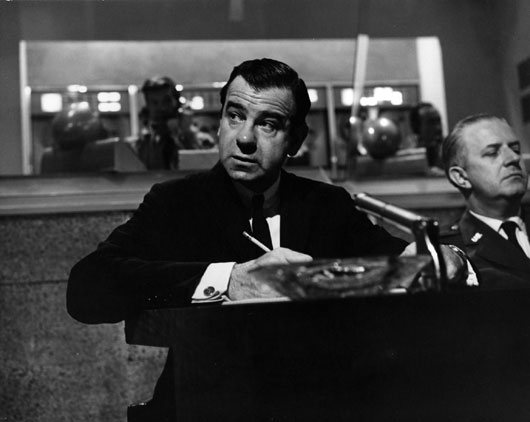
The Falcon Series...starring George Sanders
The Gay Falcon***1/2 1941
http://www.youtube.com/watch?v=N2l_6vrZ7Uw&list=PL479DE53C17ECA899
http://en.wikipedia.org/wiki/The_Gay_Falcon
A Date With the Falcon***1/2 1942
http://www.youtube.com/watch?v=1PwADlUt-wc&list=PL70724B8E3BBBC66A
http://en.wikipedia.org/wiki/A_Date_with_the_Falcon
The Falcon Takes Over (The Falcon Steps Out)***1/2 1942
http://www.youtube.com/watch?v=JL5Qdo5uV84
http://en.wikipedia.org/wiki/The_Falcon_Takes_Over
The Falcon's Brother***1/2 1942
No video avail...
http://en.wikipedia.org/wiki/The_Falcon%27s_Brother
Gay Stanhope Falcon (later known in film and radio as The Falcon) is a fictional character created in 1940 by Michael Arlen. Falcon made his first
appearance in Arlen's short story Gay Falcon, which was first published in 1940 in Town & Country magazine. Falcon is characterized as a freelance
adventurer and troubleshooter - a man who makes his living "keeping his mouth shut and engaging in dangerous enterprises."
The Falcon was quickly brought to the screen by RKO - 1941's The Gay Falcon redefined the character as a suave English gentleman-detective with
a weakness for beautiful women. The film was intended to establish a suitable replacement character for Leslie Charteris' Simon Templar (aka The
Saint, hero of a popular RKO film series). To that end, George Sanders (star of The Saint series) was cast. Though Gay Falcon was the character's
name in Arlen's oringal story, for the film series, the character was renamed Gay Lawrence - thus, "The Falcon" became an alias, or nickname (a la
"The Saint"). In later outings, in various media, the character had a variety of "real names," while still being known as The Falcon. Neither in films nor
on radio was the nickname ever explained.
Sanders appeared in the first three Falcon films, which followed the Saint pattern so closely that author Charteris sued RKO for plagiarism (Charteris
pokes fun at The Falcon in his 1943 novel The Saint Steps In, with a character making a metafictional reference to the Falcon being "a
bargain-basement imitation" of The Saint.)[1] Sanders, tired of B leads, bowed out of the series in The Falcon's Brother (1942). The Falcon's brother, Tom,
became the new Falcon, and was portrayed by Sanders' actual brother, Tom Conway. After The Falcon's Brother, Conway starred in nine further Falcon films
through 1946, almost always with a wisecracking sidekick, portrayed variously by Edward Brophy, Allen Jenkins (who played the same role in the first three
Sanders films), Don Barclay, Cliff Edwards and Vince Barnett.
An oft-used gimmick in the Falcon series was to tack "teaser" epilogues onto the ends of films. Their purpose was largely to keep interest in the series alive -
they often had little to do with upcoming films.
The Falcon character was revived for three more films, all made in 1948, starring John Calvert and changing the character's name to "Michael Waring", but
these were unsuccessful. The character went on to appear (as Michael Waring) in radio and television - Charles McGraw portrayed the Falcon in the 39-episode
syndicated television series Adventures of the Falcon (1954-55).[2][3][4]
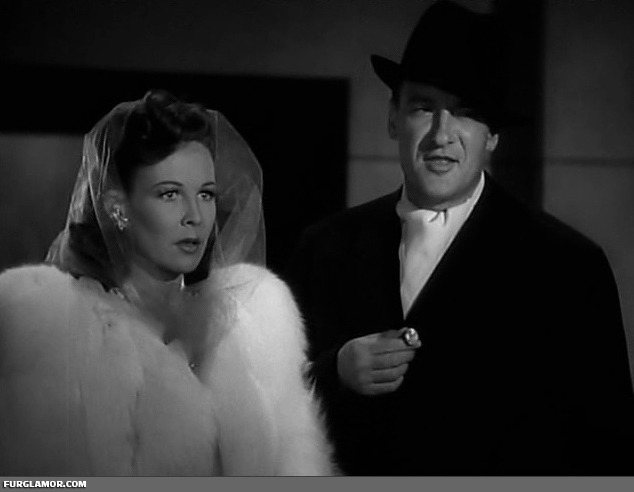
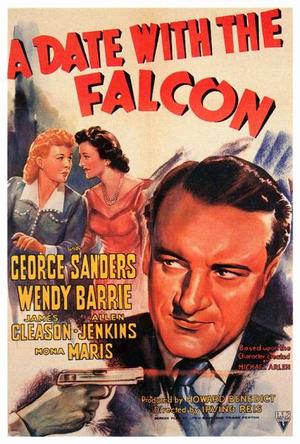
Below: The Falcon Takes Over, above The Gay Falcon
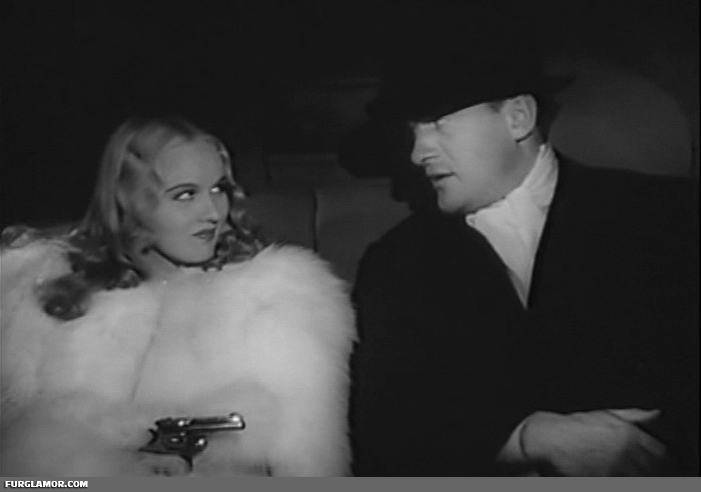
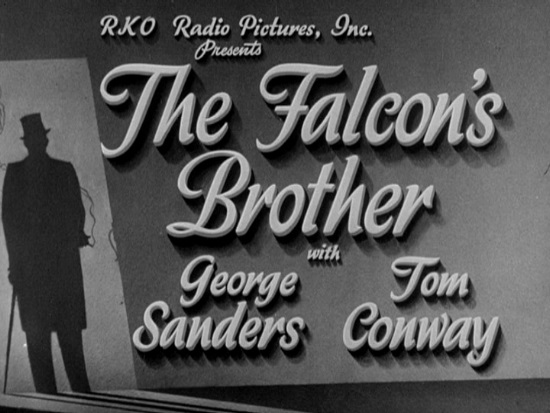
Falcon and the Snowman, The**** 1985
http://en.wikipedia.org/wiki/The_Falcon_and_the_Snowman
VIDEO
http://www.youtube.com/watch?v=3r-cHRAFDrw
John Schlesinger directed this fact-based drama - adapted from Robert Lindsay's bestseller of the same title -- about two Californians,
friends since boyhood, who are caught selling government secrets to the Soviet Union. Christopher Boyce (Timothy Hutton) is an
all-American boy, studying for the priesthood in a seminary. But Boyce decides to drop out of school, and with the help of his father
(Pat Hingle), a FBI agent, he gets a job working for the CIA in a message-routing center. While reading the messages, Boyce is shocked to
learn that the CIA is involved in fixing Australian elections. Watching the Watergate hearings on television, he feels an ever-mounting sense
of outrage at the arrogance of the U.S. government and decides to do something about it. Deciding to supply the CIA messages to the
Russians, he enlists his childhood friend Daulton Lee (Sean Penn) to help him. Lee is to deliver the CIA secrets to a Russian operative
(David Suchet) at the Soviet Embassy in Mexico City. But Lee is an unreliable drug dealer, and his sloppy spy trail leads the two old friends
into more trouble than they bargained for. ~ Paul Brenner, Rovi
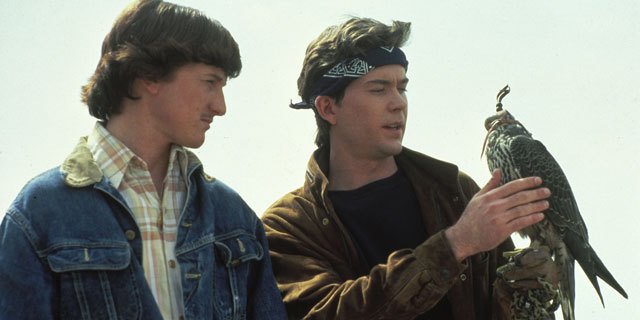
Fantastic Voyage***1/2 1966
VIDEO
http://www.youtube.com/watch?v=3o8vsU0Dw-4
http://www.imdb.com/title/tt0060397/
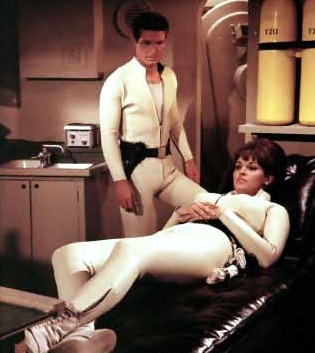
The United States and the Soviet Union have both developed technology that allowed matter to be miniaturized using a process
that shrinks individual atoms, but its value is limited. Objects only stay miniaturized for a limited amount of time depending
on how much miniaturization the object undergoes. Scientist Jan Benes, working behind the Iron Curtain, has figured out how
to make the shrinking process work indefinitely. With the help of the CIA, he escapes to the West, but an attempted
assassination leaves him comatose, with a blood clot in his brain. To save his life, Charles Grant (the agent who extracted him,
played by Stephen Boyd), pilot Captain Bill Owens (William Redfield), Dr. Michaels (who is later revealed to have a fear of small
spaces, played by Donald Pleasence), surgeon Dr. Peter Duval (Arthur Kennedy) and his assistant Cora Peterson (Raquel Welch)
board a specially designed nuclear submarine, the Proteus, which is then miniaturized and injected into Benes. The ship is
reduced to one micrometer in length, giving the team only one hour to repair the clot; after that, the submarine will begin to
revert to its normal size and become large enough for Benes' immune system to detect and attack.
The crew faces many obstacles on their journey. An arteriovenous fistula forces them to detour through the heart (a temporary
cardiac arrest must be induced to avoid destructive turbulence), through the inner ear (all in the lab must remain quiet to
prevent similar turbulence) and replenish their supply of oxygen in the alveoli of the lungs. When the surgical laser needed to
destroy the clot is damaged, it becomes obvious there is a saboteur on the mission. They cannibalize their radio to repair the
laser. When they finally reach the brain clot, there are only six minutes remaining to operate and then exit the body.
Before the mission, Owen was briefed that Duval was the prime suspect as a potential surgical assassin. But as the mission
progresses, he pieces together the evidence and begins to suspect Michaels. During the critical phase of the operation, Dr.
Michaels, knocks Owens out and takes control of the Proteus while the rest of the crew is outside for the operation. Duval
successfully removes the clot with the laser, but Michaels tries to crash the sub into the clot area to kill Benes. Grant fires the
laser at the ship, causing it to veer away and crash. Michaels is trapped in the wreckage and killed when a white blood cells
attacks and destroys the Proteus. Grant saves Owens from the ship, and they all swim desperately to one of the eyes, where
they escape via a teardrop seconds before they return to normal size.
Farewell (documentary)***** 2009
http://www.airships.net/blog/movie-lady-hay-graf-zeppelin-farewell
VIDEO
http://www.youtube.com/watch?v=vqAL9rtFTWo
In 2009 a Dutch semidocumentary called 'Farewell'[5] was released, directed by Ditteke Mensink and researched by Gerard Nijssen. It consists of footage of her and the
first Zeppelin flight around the world.[6][7] Variety described the documentary as 'absorbing'.[8]
This documentary was later broadcast in the UK, on BBC Four as Around The World by Zeppelin on 7 February 2010. The substantial eighty-minute programme relied almost
entirely on extensive newsreel footage from the time which showed in some detail how an airship operated. It was narrated (by Poppy Elliott) mainly by readings from Lady
Drummond-Hay’s articles and journal and revealed that when she was told by Hearst that Karl von Wiegand was to be her mentor on the voyage she was very concerned
because the pair had only ended an affair at his insistence and to her regret six months before. This gave a significant human-interest to the story and clearly led to some
tensions. Apparently the affair was briefly resumed during the Tokyo stopover but stopped again after he received a telegram from his wife; after the flight they remained
companions until Lady Drummond-Hay's death seventeen years later.
However, some parts of the semidocumentary are fictitious; the airship's tail fin did not rip during the round-the-world flight, but during a previous transatlantic flight in October
1928, and the ship did not have to land on water to do repairs.
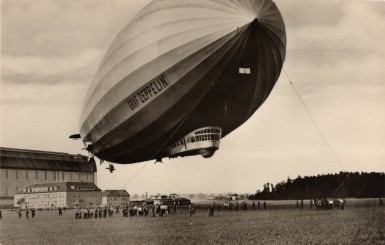
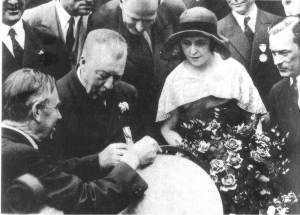
Far From Heaven***1/2 2002
VIDEO
http://www.youtube.com/watch?v=uSNvF3CEzno
http://www.farfromheavenmovie.com/

In suburban 1950s Connecticut, Cathy Whitaker (Julianne Moore), appears to be the perfect wife, mother, and homemaker.
Cathy is married to Frank (Dennis Quaid), a successful executive at Magnatech, a company selling television advertising. One
evening Cathy receives a phone call from the local police who are holding her husband. He says it's all a mix up but they won't let
him leave alone. Cathy is preparing for her annual party with her best friend, Eleanor Fine (Patricia Clarkson). One day Cathy
spies an unknown black man walking through her garden. He turns out to be Raymond Deagan (Dennis Haysbert), the son of
Cathy's late gardener.
Frank finds himself forced to stay late at the office, swamped with work. One evening, however, he enters an underground bar
filled with single men. Meanwhile, Cathy and Raymond develop a friendship. One night when Frank is working late Cathy decides
to bring his dinner to him at the office. She walks in on him passionately kissing another man. Frank confesses having had
'problems' as a young man, and agrees to see psychiatrist Dr. Bowman (James Rebhorn) in the hope of being "converted back"
to heterosexuality. (Homosexuality was considered a mainstream psychiatric disorder at this time). His relationship with Cathy
is irreparably strained, however, and he turns to alcohol. One night, after a party, Frank attempts to make love to Cathy. He is
unable to become aroused and strikes Cathy when she tries to console him. Unable to comprehend the destruction of her
marriage, Cathy turns to Raymond for comfort. She sees him at an art show, where she spends much of her day talking to him,
setting the town ablaze with gossip.
As Cathy sees her once idyllic world falling apart, she begins to form an even greater attachment to Raymond, but their
non-intimate relationship has violent consequences for Raymond's daughter, Sarah, who is attacked by three white boys who
are not prosecuted. The Deagan home is also vandalized. When Cathy reveals her marriage problems to Eleanor, she clearly
disapproves of Cathy's perceived romance with a colored man. At the same time Frank, unable to suppress his homosexual
desires, falls in love with another man and seeks a divorce from Cathy. Raymond decides to move away with his daughter to
avoid further troubles for both himself and Cathy. In the last scene, Cathy goes to the train station to see off Raymond and say
her silent goodbye to him.
Fargo***** 1996
http://www.filmsite.org/fargo.html
VIDEO
http://www.youtube.com/watch?v=Oy2HfixB9_8
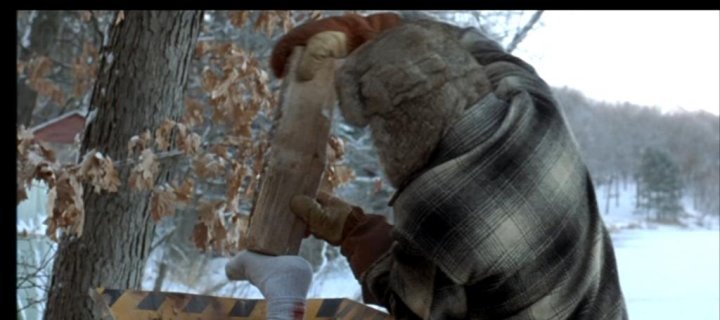
In 1987, Minneapolis automobile salesman Jerry Lundegaard (William H. Macy) is in severe financial trouble. After being
introduced to criminals Carl Showalter (Steve Buscemi) and Gaear Grimsrud (Peter Stormare) by Native American ex-convict
Shep Proudfoot (Steve Reevis), a mechanic at his dealership, Jerry travels to Fargo, North Dakota and hires the two men to
kidnap his wife Jean (Kristin Rudrüd) in exchange for a new car and half of the $80,000 ransom. However, Jerry intends to
demand a much larger sum from his wealthy but antagonistic father-in-law, Wade Gustafson (Harve Presnell), and keep most of
the money for himself.
Meanwhile, a financial company has been threatening to withdraw a loan they made to Jerry, and Jerry has been trying to raise
money by promoting a real-estate deal to Wade. Jerry tries to call off the kidnapping after Wade agrees to the investment, but
he is too late, and, as it turns out, Wade intends to buy the property himself, leaving Jerry with only a finder's fee, which is not
enough to pay off his debts. Meanwhile, Carl and Gaear kidnap Jean, but on their way through Brainerd, a state trooper stops
them because of the car's license plates. When Carl's attempt to bribe the trooper fails, Gaear shoots the trooper. He also kills
a couple who happen to drive by and see Carl dragging the trooper's body. The deaths are investigated the next morning by
local police chief Marge Gunderson (McDormand), who is seven months pregnant. She quickly deduces the chain of events and
follows the leads that arise, interviewing two prostitutes who serviced the criminals and tracing the license plates on the
criminals' vehicle to Jerry's dealership. After being informed that they telephoned Shep Proudfoot, she drives to Minneapolis,
but she acquires no information in interviews with Shep and Jerry.
Meanwhile, Jerry contacts Wade, claiming that the kidnappers insist on dealing only with Jerry. Wade accepts this arrangement
at first, but later changes his mind. When he meets with Carl at a parking garage, he refuses to give him the money until his
daughter is returned. Angered by his demands and unexpected appearance, Carl starts a shootout and kills Wade after Wade
shoots him in the face, then kills the garage attendant on his way out. Jerry arrives at the scene after Carl leaves, and opens
the trunk of his car, presumably to take Wade's body. On his way to the backwoods hideout on Moose Lake, Carl discovers that
the bag he took from Wade contains a million dollars and buries most of the money by the side of the highway. At the hideout,
Gaear has killed Jean, and, in a dispute over the car, he kills Carl with an axe.
Before leaving town, Marge questions Jerry again, asking him about the car used in the murders. He provides no information,
but when she asks him to check the lot for missing cars, he flees the dealership. Marge phones the State Police to find and
arrest him, then, following up on a tip, she drives to the lake, sees the kidnappers' car, and arrives at the hideout just in time
to see Gaear pushing the last of Carl's body into a wood chipper. Gaear tries to flee, but Marge shoots him in the leg and arrests
him. Jerry is later arrested in a motel outside of Bismarck, North Dakota. In the final scene, Marge and her husband, Norm
(John Carroll Lynch), sit in bed together discussing his artwork, which has been selected as the design for a postage stamp.
Feather in Her Hat, A ***1/2 1935
http://en.wikipedia.org/wiki/A_Feather_in_Her_Hat
http://movies.nytimes.com/movie/review?res=9B07E4D91F3DE53ABC4D51DFB667838E629EDE
Not Avail.
Legendary stage actress Pauline Lord made but a few films, but was always worth watching whenever she took
command of the screen. In Feather in Her Hat, Lord plays cockney storekeeper Clarissa Phipps, who worries that her
son Richard will grow up being ashamed of her humble vocation. Thus, she loftily pretends that she's not Richard's
mother, and that the boy is actually the offspring of a prominent theatrical family. Upon reaching adulthood, Richard
(Louis Hayward) becomes a prominent playwright, confident that the stage is in his blood, while Clarissa secretly sells
her store at a loss to finance Richard's first production. Only on her deathbed does Clarissa reveal the truth -- and
happily, Richard isn't ashamed of her in the least, and indeed is prouder of her than ever. Basil Rathbone contributes
a fascinating characterization as a gin-swilling, unshaven remittance man. ~ Hal Erickson, Rovi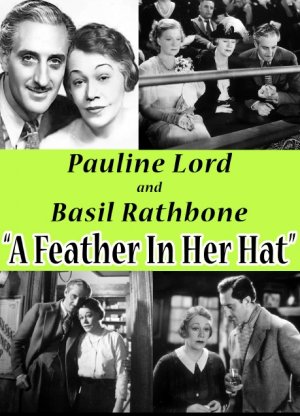
Female**** 1933
VIDEO
http://www.tcm.com/mediaroom/video/301931/Female-Movie-Clip-Naturally-Enthusiastic.html
http://movies.nytimes.com/movie/review?res=9C02E2DF133FE63ABC4C53DFB7678388629E
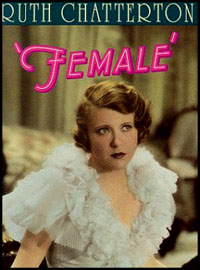
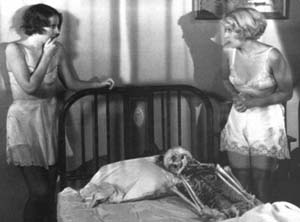
Pre-code photograph
Alison Drake, the president of a large automobile company, is cynical about love and casually seduces the attractive men in her
company, but her meaningless affairs only add to her boredom and confirm her belief that men, like women, can be bought with
money and power. One night, in search of excitement, Alison goes to a shooting gallery and meets Jim Thorne, who declines her
sexual advances. The next day, when Jim shows up at her office, Alison learns that he is the renown engineer she is expecting.
She coolly discusses business with him and then invites him to her home. Expecting another conquest, Alison is surprised when
Jim rebuffs her again. Determined to break him, Alison successfully gets Jim alone on a country picnic, and this time, he
succumbs to her charms. When he asks her to marry him, though, it is she who turns him down. Furious, he quits his job with
her and leaves town. Alison, realizing that she is truly in love, follows him, but misses a very critical business meeting. When
she finally catches up with Jim, she tearfully admits that she was willing to risk bankruptcy to find him. This time, he willingly
accepts her.
Festival Express**** 2003
http://www.festivalexpress.com/
VIDEO
http://www.youtube.com/watch?v=GyYfDl934ds
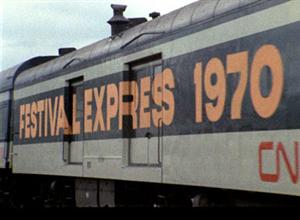
In 1970 a train journeyed across Canada carrying some of the greatest rock bands of all time. Janis Joplin, The Band, The
Grateful Dead, Ian & Sylvia, Buddy Guy, Delaney & Bonnie, and others lived (and partied) for five days, giving concerts where
and when they stopped. The train was called the Festival Express. Nicknamed the million dollar bash by Rolling Stone Magazine
Festival Express was designated to capitalize on then-burgeoning craze for multi-day, talent heavy music festivals. Festival
Express was planned as a festival with a difference--it would be portable. This proved to be stamp of genius, indelibly
stamping the event with an aura of magic, as a large number of the performers signed on despite being offer fees substantially
below their going rate. The musicians thought the train ride sounded like the party to end parties. ![]()
Fire Over England**** 1937
http://en.wikipedia.org/wiki/Fire_Over_England
VIDEO
http://www.tcm.com/mediaroom/video/276249/Fire-Over-England-Movie-Clip-Open-3000-Dresses.html
http://www.tcm.com/mediaroom/video/276250/Fire-Over-England-Movie-Clip-A-Message-From-Her-Heart.html
In 1587, England is in danger of being overwhelmed by powerful Spain, with its ruthless inquisition and mighty Armada. The English
queen, Elizabeth, who is much loved by her loyal subjects, is forced to walk a dangerous diplomatic line between maintaining
friendship with King Philip of Spain and supporting English seamen such as Sir Francis Drake, who plunder Spanish ships. Elizabeth's
chief advisors are the lord treasurer, Burleigh, and her longtime admirer, the Earl of Leicester. Burleigh's beautiful but
featherbrained granddaughter Cynthia is one of Elizabeth's ladies-in-waiting, and the aging queen is plagued with jealousy of the
girl's attractiveness and vitality. While Elizabeth is dealing with the Spanish ambassador in her palace, a mighty sea battle is
occurring between the Spanish, led by Don Miguel, and the English, led by Sir Richard Ingolby. Miguel and Richard are old friends,
and when the English are captured, Miguel arranges for Richard's son Michael to escape. Michael washes ashore on Miguel's estate,
and his wounds are tended to by Miguel's daughter Elena, who quickly becomes enamoured of the handsome Englishman. As the
months pass, Michael recovers and laments being apart from Cynthia, his sweetheart, but is nonetheless impressed by Elena's
charms. One day, the idyll ends when Miguel brings Michael the sad news that Richard has been executed as a heretic. The grieving
Michael denounces his rescuers and flees to England in a small fishing boat. When he is granted an audience with Elizabeth, he
urges her to fight the Spanish menace by whatever means necessary and swears undying loyalty to her. Elizabeth is flattered by
the young man's fervent devotion and later has an opportunity to take advantage of his offer of service when Hillary Vane, an
Englishman spying for Spain, is killed before the names of his English co-conspirators can be uncovered. Michael, disguised as
Vane, goes to Philip's court to get the letters that will set into motion a plan to assassinate Elizabeth. At the palace Michael meets
Elena, who is now married to Don Pedro, the palace governor. Elena keeps Michael's identity a secret as long as she can, but finally
must tell her husband out of loyalty to him. When Philip sees through Michael's disguise and orders his arrest, Pedro helps him
escape so that it will not be discovered that his wife aided a heretic. While Michael is returning home, the Spanish Armada sails
against England and Elizabeth joins her army in Tilbury. Michael meets her there and reveals the names of the traitors. Elizabeth
knights Michael and then confronts the traitors, who, overwhelmed with shame, agree to go with Michael on a dangerous mission to
stop the Armada. The mission is successful as Michael and his men use their small boats to set the Armada aflame, and they all
return safely. Elizabeth allows Michael and Cynthia to be wed, and after sadly ordering all mirrors to be removed from her rooms,
greets her adoring subjects.
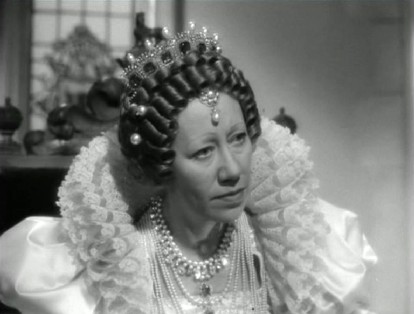
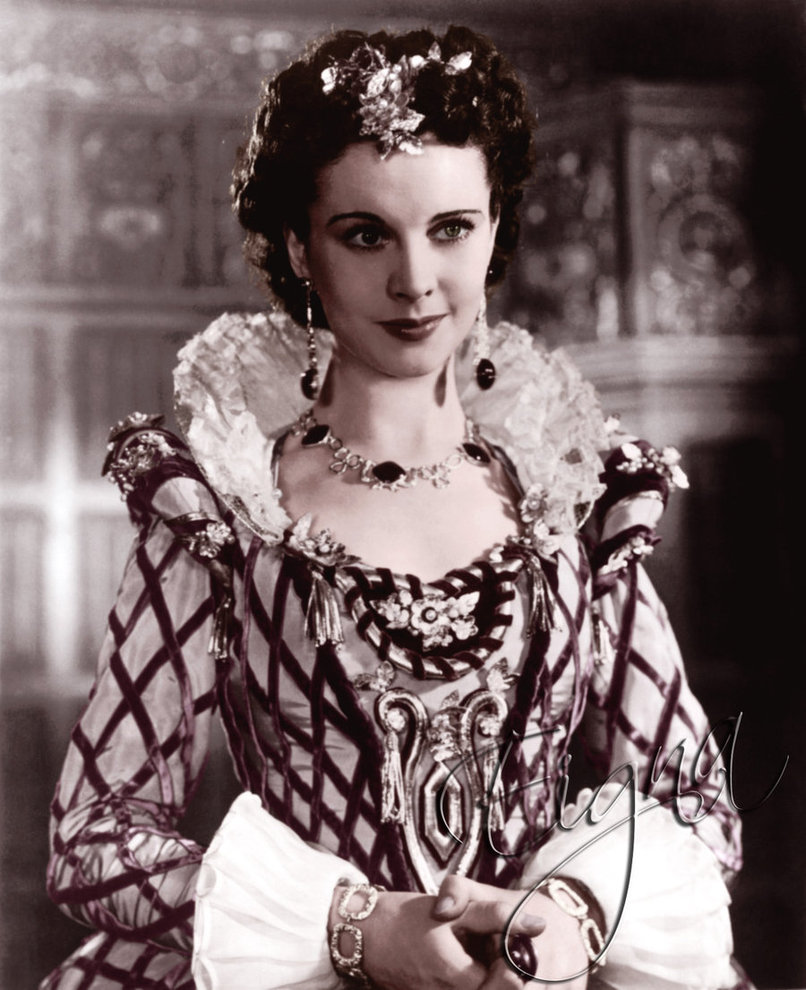
Flesh and the Devil****1/2
VIDEO
http://www.metacafe.com/watch/7633907/flesh_and_the_devil_1927/
http://movieclassics.wordpress.com/2008/09/05/fleshandthedevil/
Leo von Sellenthin and Ulrich von Kletzingk, two boys who have grown up together, swear eternal friendship through a blood bond.
They attend military school together, and at home on annual holiday, Leo meets the entrancing Felicitas at a ball. When her
husband discovers Leo with her in her boudoir, a duel is called and the husband is killed; forced into foreign service, Leo asks
his friend Ulrich to console the widow. Three years later Leo is pardoned by the emperor and returns to find that Felicitas has
married Ulrich. Vainly he seeks to escape her attempts to revive their former affair. Ultimately, the two men resort to a duel,
each unable to fire the fatal shot. Hurrying to the scene of the duel, Felicitas falls through an ice floe to her death, removing
the spell cast upon their lives and reuniting the friends. ![]()
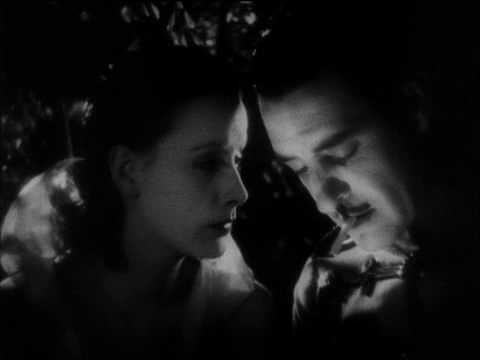

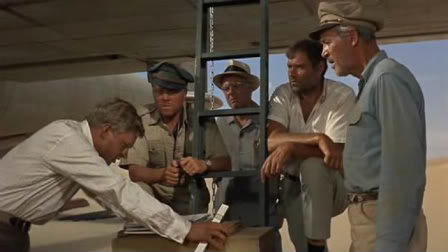
Bette Davis was a little more than three weeks away from the release of her breakthrough portrayal inOf Human Bondage and the
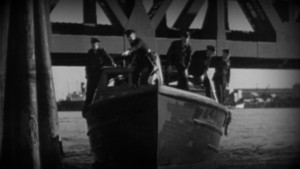
.jpg?timestamp=1344747126881)
400 Blows, The (le quatre cents coups)****1/2 1959
http://en.wikipedia.org/wiki/The_400_Blows
VIDEO
http://www.criterion.com/films/151-the-400-blows
François Truffaut’s first feature, The 400 Blows (Les quatre cents coups), is also his most personal. Told through the eyes
of Truffaut’s life-long cinematic counterpart, Antoine Doinel (Jean-Pierre Léaud), The 400 Blows sensitively re-creates the trials
of Truffaut’s own difficult childhood, unsentimentally portraying aloof parents, oppressive teachers, petty crime, and a friendship that
would last a lifetime. The film marks Truffaut’s passage from leading critic of the French New Wave to his emergence as one of
Europe’s most brilliant auteurs.
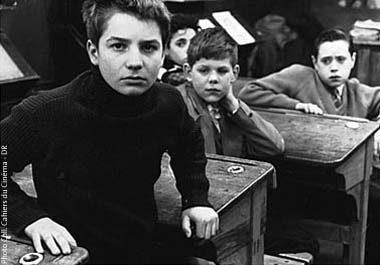
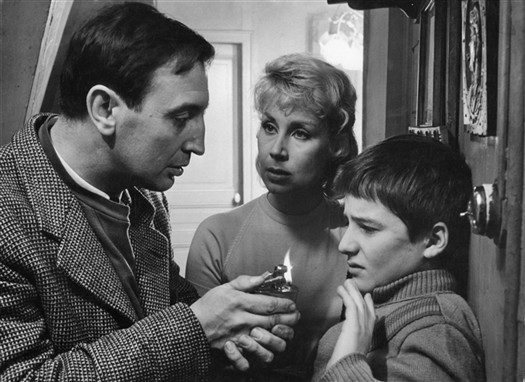
Fourteen Hours****1/2 1951
http://en.wikipedia.org/wiki/Fourteen_Hours
http://www.youtube.com/watch?v=lz_ndBRNLIM
Henry Hathaway directed this high-tension drama about a man teetering on the verge of self-destruction and how his dilemma
affects those around him. Robert Cosick (Richard Basehart) is a desperate and despondent young man who has never gotten
along with his parents (Robert Keith and Agnes Moorehead) and believes his girlfriend Virginia (Barbara Bel Geddes) no longer
loves him. Cosick creeps onto the ledge of a skyscraper in downtown New York and threatens to jump; for the next 14 hours,
Dunnigan (Paul Douglas), a policeman who was passing by, tries to talk him down, searching for a way to convince him that life is
worth living. A crowd forms on the street below as Dunnigan talks with Cosick; Danny (Jeffrey Hunter) and Ruth (Debra Paget) meet
as they watch the grim spectacle and discover how much they have in common. Meanwhile, in a building across the street, a young
woman about to sign her divorce papers (Grace Kelly) finds herself wondering if she should give up on her marriage so hastily as
she watches Cosick debate about throwing away his life. Fourteen Hours marked Grace Kelly's screen debut; Ossie Davis and
Brian Keith also appear in small roles. ~ Mark Deming, Rovi
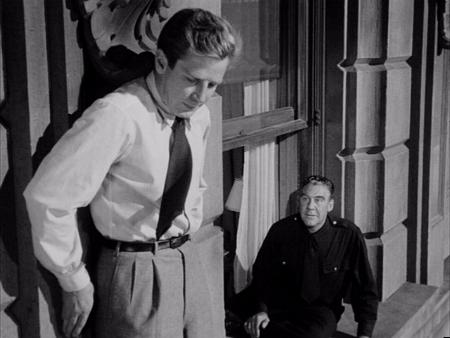
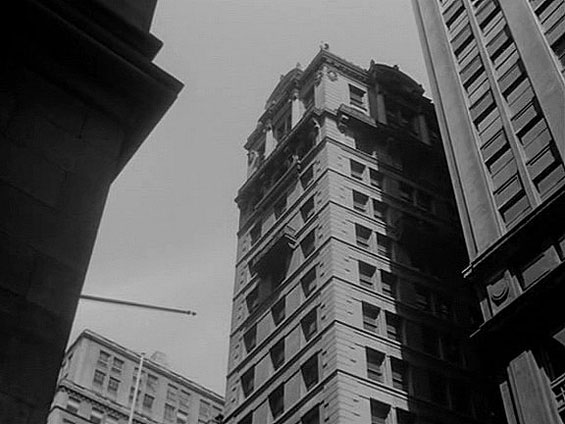
Four Weddings and a Funeral**** 1994
A surprising masterpiece. A touching comedy that looks at our social customs and how they often are
a poor fit for our feelings and needs. Grant plays a sympathetic character, Charles, who pines over the
beautiful Carrie (Andie MacDowell) and watches as others "practice" love, sometimes clumsily, some-
times romantically, sometimes in a rather pedestrian fashion. There are many brilliant character
performances, particularly by Kirstin Scott Thomas, Charlotte Coleman, Simon Callow, Sophie Thompson,
James Edward Fleet and Anna Chancellor. ...a wonderful montage ending.
http://en.wikipedia.org/wiki/Four_Weddings_and_a_Funeral
VIDEO
http://www.tcm.com/mediaroom/video/280713/Four-Weddings-And-a-Funeral-Movie-Clip-Pagan-Orange.html
This acclaimed British comedy centers on the intermittent romance between a charming (if slightly bumbling) Englishman and a
beautiful American woman, who seem to always run into each other at weddings. Indeed, it is at the first of the title's four
weddings that Charles (Hugh Grant) and Carrie (Andie McDowell) meet, enjoying a brief but fleeting connection. The spark is
rekindled several months later, when they unexpectedly meet at another wedding. Unfortunately, however, Carrie has become
engaged to another, a fact that complicates matters for them both. The story may seem simple, but the film is elevated by
screenwriter Richard Curtis' ear for witty dialogue and a colorful supporting cast. Director Mike Newell's sympathetic attention
to character keeps the proceedings believable, and prevents the film's more serious moments from seeming mawkish.
These elements, along with Grant's star-making performance as Charles, helped the film achieve unexpected international
success, including an Academy Award nomination for Best Picture. ~ Judd Blaise, All Movie Guide
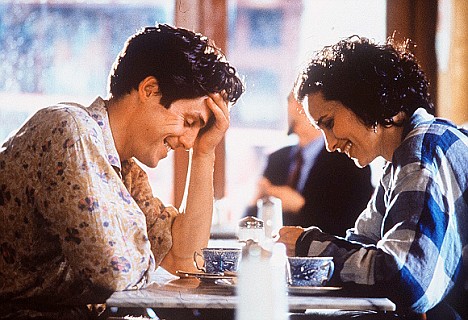
Frankenstein**** 1931
http://www.reelviews.net/movies/f/frankenstein31.html
VIDEO
http://www.tcm.com/mediaroom/video/384958/Frankenstein-Movie-Clip-Mr-Carl-Laemmle-Feels.html
http://www.tcm.com/mediaroom/video/384959/Frankenstein-Movie-Clip-It-s-Alive-.html
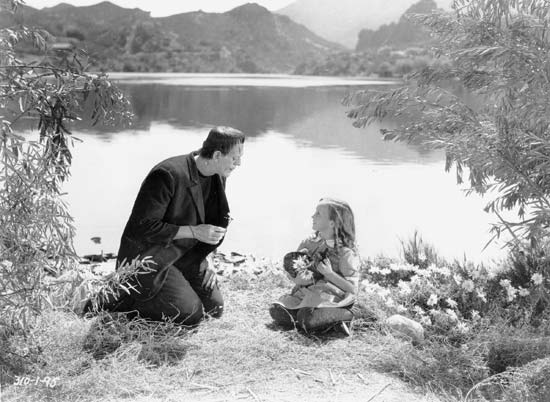
In a prologue, an announcer steps from behind a curtain to warn the audience of the horrifying nature of the film they are about
to see. In the main story, at a funeral, Fritz, a dwarf, and young scientist Henry Frankenstein dig up a freshly buried body,
claiming that the corpse is waiting for a new life. They also remove a man hanging from a gibbet, but his broken neck requires
that a new brain be found. After Doctor Waldman's lecture at Goldstadt Medical College, Fritz sneaks in and, after dropping a
bottle containing a normal brain, leaves with one containing the brain of a criminal. Meanwhile, in Henry's hometown, Victor
Moritz visits Elizabeth, whom he loves. She has received a strange note from Henry her fiancé, who writes that his experiments
preclude her from joining him. Concerned, Victor and Elizabeth visit Waldman, Henry's former professor, who explains that
Henry had left the college to pursue a mad dream of recreating human life. Together the three go to Henry's laboratory, a
watchtower in the mountains. There, Henry and Fritz are preparing to use the power of lightning to charge their electrical
mechanisms and give life to a body they have pieced together. Henry agrees to let his friends observe and explains his scientific
theories as his creation comes to life. Later Victor and Elizabeth attempt to pacify Henry's doubting father, Baron Frankenstein,
who is only interested in promoting the date of his son's wedding. At the laboratory, while Waldman tells Henry of the monster's
criminal brain, Fritz torments the monster and the monster kills him. After a fight, Henry and Waldman sedate the monster just
as the baron approaches the lab. The exhausted Henry is taken home after Waldman promises to destroy the monster, but
instead Waldman is killed by the escaping monster. As the wedding of Elizabeth and Henry is celebrated, the monster drowns
Little Maria, a village child who plays with him, then menaces Elizabeth. Ludwig, Maria's father, carries his daughter's body into
town, and an angry search party is formed. They go through the mountains by torchlight until Henry finds the monster, and the
two engage in a struggle that continues in an abandoned mill, where the monster has fled. The mob sets the mill ablaze, and
the monster hurls Henry to the ground before being engulfed by flames. Later, the baron celebrates the wedding of his recovered
son with a toast to a future grandchild. ![]()
From Russia With Love***1/2 1963
http://www.bbc.co.uk/films/2001/06/19/from_russia_with_love_1963_review.shtml
VIDEO
http://www.tcm.com/mediaroom/video/240518/From-Russia-With-Love-Movie-Clip-Tatiana.html
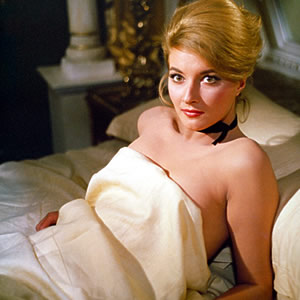
In a mansion garden at night, James Bond is seen alternately stalking and being stalked by a tall, blond assassin. Bond is captured
and strangled violently to death by a man named Donald Red Grant, using a garrote wire. Suddenly, floodlights switch on and the
dead man is revealed to be wearing a Bond mask, in a scenario that completes a SPECTRE training exercise.
Kronsteen, a chess grandmaster, and SPECTRE's expert planner, has devised a plot to steal a Lektor cryptographic device from
the Soviets and sell it back to them while exacting revenge on Bond for killing their agent Dr. No. Ex-SMERSH operative and
Spectre Number 3 Rosa Klebb is put in charge of the mission by the megalomaniac Number 1. She has already chosen a pawn:
Tatiana Romanova, a cypher clerk at the Soviet consulate in Istanbul. Klebb departs to SPECTRE Island, the organisation's secret
training base, where she assigns Red Grant to be the assassin. In London, M tells Bond that Romanova has contacted their
"Station 'T'" in Turkey, offering to defect with a Lektor, which MI6 and the CIA have been after for years. She has said that she
will only defect to Bond, whose photo she has allegedly found in a Soviet intelligence file. In fact she is following orders from
Klebb, who pretends she is still working for SMERSH and that this is a SMERSH deception.
Bond flies to Istanbul to meet station head Ali Kerim Bey. He is followed from the airport by an unkempt man in glasses and by
Red Grant. The next day, after Kerim Bey's office is bombed, Bond and Kerim Bey spy on the Soviet consulate. Seeing rival agent
Krilencu, Kerim Bey takes Bond to a rural gypsy settlement, where Kerim Bey plans to lie low while deciding how to deal with
Krilencu. At night, the camp is attacked by Krilencu's men, who wound Kerim Bey and nearly kill Bond, who is saved by a hidden
Red Grant. On the following night, Kerim Bey kills Krilencu with Bond's sniper rifle. When Bond returns to his hotel suite, he
finds Romanova in bed waiting for him, unaware that they are being filmed by Grant and Klebb.
The next day, Romanova heads off for a pre-arranged rendezvous at Hagia Sophia. Bond follows her and stalks the bespectacled
man who had followed him at the airport. The man attempts to intercept Romanova's floor plan of the Soviet consulate, but is
killed by Grant. When Bond finds the body, he takes the floor plan. Kerim Bey and Bond set up a plan to steal the Lektor, and
after doing so, they escape with the device on the Orient Express. On the train, Kerim Bey and a Soviet security officer named
Benz, who spots Romanova, are killed by Grant, who makes it appear as if they killed each other.
The train crosses southern-central Europe to Belgrade. There Bond arranges for agent Nash from "Station 'Y'" to meet him at
Zagreb. When the train stops, Grant finds and kills Nash. Grant boards the train once again, meeting Bond as Nash. He drugs
Romanova at dinner, then overcomes Bond. Grant taunts him, boasting SPECTRE has been pitting the Soviets and the British
against each other, and claims that Romanova thinks that "she's doing it all for mother Russia" when she is really working for
SPECTRE. Grant also mentions the film of Bond and Romanova at the hotel suite, saying that after both are killed, Grant will
plant it in her handbag along with a forged blackmail letter so it looks like it was a murder-suicide.
Bond tricks Grant into opening Bond's attaché case in the manner that detonates its tear gas booby trap in his face, allowing
Bond to attack him. In the ensuing struggle, Bond eventually manages to stab Grant with the knife hidden in the attaché case,
and strangles Grant to death with his own garrote. At dawn, Bond and Romanova leave the train, hijack Grant's getaway truck,
destroy an enemy helicopter, and drive to a dock, eventually boarding a powerboat. Number 1 is very unhappy, and summons
Kronsteen and Klebb. He reminds them that SPECTRE does not tolerate failure; they blame each other. Number 1 promptly brings
in agent Morzeny to then execute Kronsteen with a poisoned spike in the toe of his shoe. Number 1 tells a frightened Klebb that
she has one last chance. Klebb sends Morzeny after Bond with a squadron of SPECTRE's boats. Morzeny nearly catches Bond, but
the agent sets his pursuers' boats on fire with a signal flare. Bond and Romanova reach Venice and check into a hotel. Rosa
Klebb, disguised as a maid, attempts to steal the Lektor. She gets the drop on Bond and holds him at gunpoint but the gun is
knocked away by Romanova. Klebb attempts to kill him with her poisoned toe-spike, but Bond pins her to the wall and Romanova
shoots Klebb dead. Riding in a gondola, Bond throws the film of him and Romanova into the water as they sail away.
From the Terrace***1/2 1960
http://en.wikipedia.org/wiki/From_the_Terrace
VIDEO
http://www.youtube.com/watch?v=941zbA9HuRg
http://www.youtube.com/watch?v=6tCNMoA9dFI
In Philadelphia in 1946, Alfred Eaton returns home from the war to find his mother Martha a wretched alcoholic, the victim of years of neglect and
abuse from her husband Samuel, the owner of a prestigious iron and steel company. Samuel emotionally withdrew from his family thirteen years
earlier after the death of his beloved son Billy, and still resents the fact that Billy died while Alfred lives. When Samuel begrudgingly offers Alfred a
position in the family business, Alfred states that he is moving to New York to launch an aircraft business with his old friend Lex Porter. While attending
a party at the estate of Lex's wealthy uncle, Fritz Thornton, Arthur spots Mary St. John, the stunning daughter of a Main Line family. Mary, who is
secretly engaged to Dr. Jim Roper, is sexually drawn to Alfred, and soon the two are embroiled in a tempestuous relationship. When Mary's snobbish
parents object that Alfred's father is a nobody and his mother is a drunk, Mary defies them and continues to see Alfred. After Alfred asks his father
for a loan to finance his share of the aircraft company, Samuel humiliates Alfred and begins to sob for the lost Billy. Furious, Alfred storms out in
disgust, after which Samuel suffers a heart attack and is hospitalized. Believing that Samuel's ill health will place Alfred closer to the helm of the Eaton
Steel company, Mr. St. John condones his daughter's engagement to Alfred. On the day of the wedding, Alfred receives word that his father has died.
Certain that Samuel has timed his death to spite him, Alfred goes ahead with the ceremony. With Thornton money, Lex and Alfred then fund the
Nassau Aircraft Corporation, but when Lex shows more interest in perfecting aircraft designs than in selling planes, Alfred, hungry for riches, becomes
impatient. One wintry day, Alfred and Mary are driving home from a party at the Thornton estate when they see a little boy fall through the thin ice of
a frozen pond. After Alfred plunges into the icy waters to save the boy, the boy's grandfather, James Duncan MacHardie, the most famous financier in
America, invites Alfred and Mary to dinner. MacHardie, a shrewd businessman, senses Alfred's drive and ambition, and when Alfred asserts that his
goal in life is to earn more money than his father, MacHardie offers him a job in his investment firm. Obsessed by success, Alfred travels the country
for MacHardie, leaving Mary alone for months at a time. Mary, lonely and self-pitying, begins to resent Alfred's constant absences. When Creighton
Duffy, MacHardie's son-in law, whose position in his father-in-law's business is threatened by Alfred's acumen, suggests that Alfred spend two months
in rural Pennsylvania counseling investment to Ralph Benziger, a prosperous coal mine owner, Alfred finds his marriage to Mary irretrievably broken.
After an ugly argument with Mary, Alfred goes to Pennsylvania, and one night, is invited to dinner at Benziger's, where he meets Benziger's
compassionate, ingenious daughter Natalie. Overwhelmed by Natalie's sensitivity, Alfred impetuously invites her to a movie, but she refuses. Later
that night, however, Natalie phones Alfred at his hotel room and arranges to meet him at a drive-in the following evening. After Alfred tells Natalie that
her warmth and generosity has made him realize what a sham his marriage is, they kiss. Later, however, Natalie reconsiders and decides that they
must end their relationship and they part, still loving each other. Upon returning to New York, Alfred is immediately summoned to MacHardie's office,
where MacHardie informs him that Mary is having an affair with Jim. After warning Alfred that he will not tolerate divorce within his firm, MacHardie
assigns him to analyze the Nassau Aircraft Corp. as a possible investment. One night while leaving a party with Mary, Alfred unexpectedly encounters
Natalie in front of the hotel. Sensing that Alfred and Natalie have been intimate, Mary vindictively calls Jim and makes a date with him. Later, Alfred
meets Natalie and tells her that although he is estranged from Mary, his career prevents him from divorcing her. Duffy, who has become unethically
involved with Nassau Aircraft and will reap a financial windfall if MacHardie invests in the company, threatens to blackmail Alfred unless he suppresses
his report. One night, while Alfred and Natalie share a passionate embrace in her hotel room, photographers hired by Duffy burst in and snap a picture
of their indiscretion. After Alfred considers giving into Duffy's blackmail, Natalie, uncertain if he is trying to save her reputation or his career, decides
to leave him. When Alfred returns home, Mary suggests that they share an open marriage and proclaims that she will never divorce him. After Mary
seductively retires to her bedroom, the scandalous photos are delivered to Alfred. At a business meeting the next day, MacHardie ushers in Mary to
celebrate Alfred's surprise promotion to partner. As Duffy smirks, Alfred denounces MacHardie's hypocrisy of placing success and social position
above personal responsibility and happiness. Alfred then issues the uncensored report exposing Duffy's duplicity and walks out. When Mary runs after
him, he accuses her of trying to revive their marriage solely to savor the prestige of being married to a partner in the MacHardie firm. With Mary
screaming at him, Alfred drives off to reconcile with Natalie.
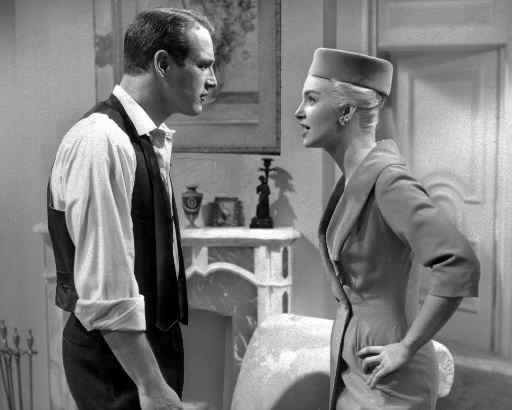
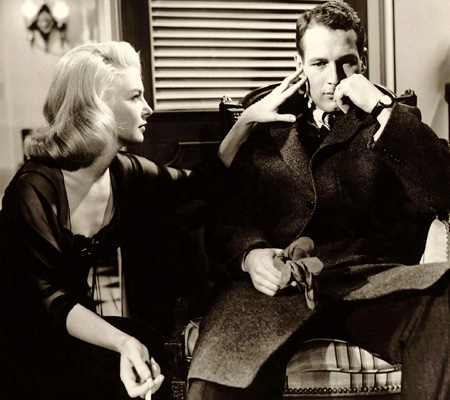
Fury***** 1936
http://filmsnoir.net/film_noir/fury-1936-on-the-threshold-of-noir.html
VIDEO
http://www.youtube.com/watch?v=Tw2jkSLL-u0
http://www.youtube.com/watch?v=XKOQqzP4RyY
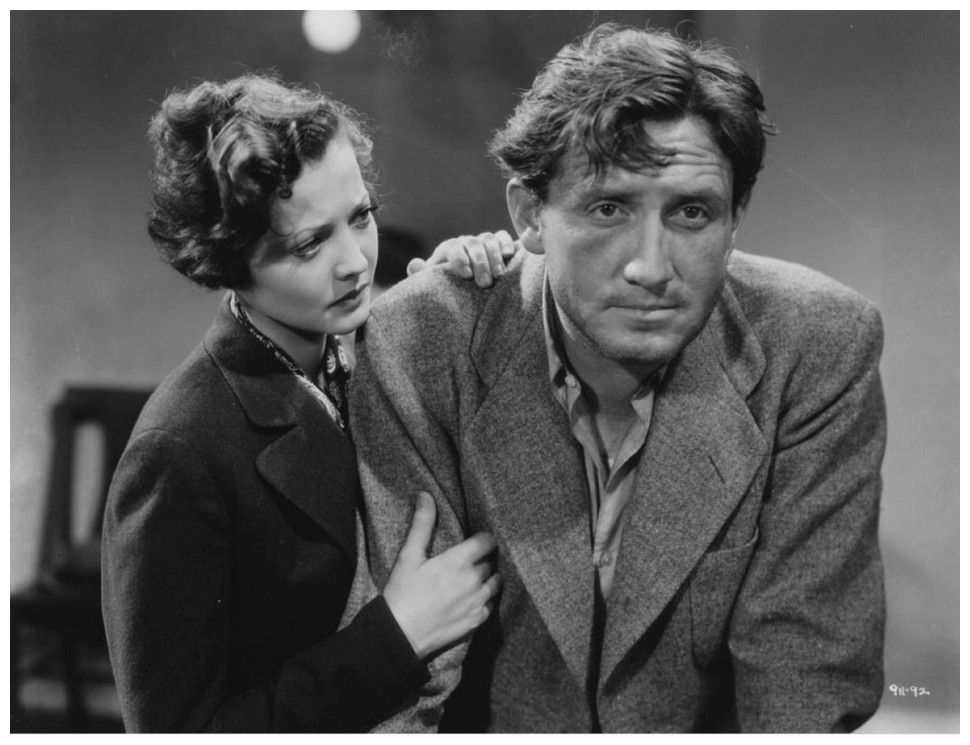
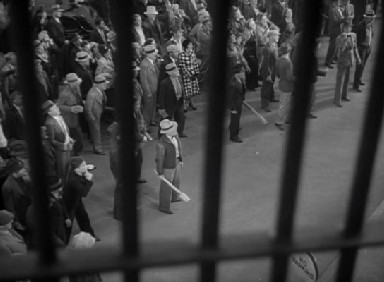
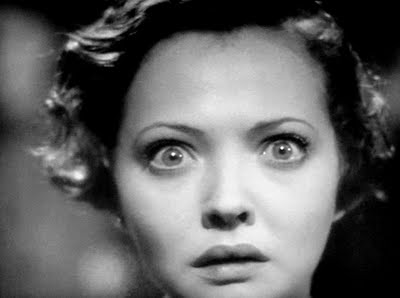
En route to meet his fiancée, Katherine Grant (Sylvia Sidney), Joe Wilson (Spencer Tracy) is arrested on flimsy circumstantial
evidence for the kidnapping of a child. Gossip soon travels around the small town, growing more distorted through each retelling,
until a mob gathers at the jail. When the resolute sheriff (Edward Ellis) refuses to give up his prisoner, the enraged townspeople
burn down the building. The district attorney (Walter Abel) brings the main perpetrators to trial for murder, but nobody is willing to
identify the guilty, and several provide alibis. The case seems hopeless, but then the prosecutor produces hard evidence: newsreel
footage of twenty-two people caught in the act. However, Katherine is troubled by one piece of evidence. The defense attorney had
tried to get his clients off by claiming that there was no proof Joe was killed, but an anonymous letter writer had returned a partially
melted ring belonging to Joe. Katherine notices that a word is misspelled just as Joe used to spell it. She discovers that Joe
escaped the fire and that Joe's brothers are helping him get his revenge. She goes to see Joe and pleads with him to stop the
charade, but he is determined to make his would-be killers pay. However, his conscience starts preying on him and, in the end,
just as the verdicts are being read, he walks into the courtroom and sets things straight.
25.
Gangs of New York***1/2 2002
http://en.wikipedia.org/wiki/Gangs_of_New_York
VIDEO
http://www.youtube.com/watch?v=7A-rsM6bRxU
The violent rise of gangland power in New York City at a time of massive political corruption and the city's evolution into a cultural melting
pot set the stage for this lavish historical epic, which director Martin Scorsese finally brought to the screen almost 30 years after he first
began to plan the project. In 1846, as waves of Irish immigrants poured into the New York neighborhood of Five Points, a number of
citizens of British and Dutch heritage who were born in the United States began making an open display of their resentment toward the
new arrivals. William Cutting (Daniel Day-Lewis), better known as "Bill the Butcher" for his deadly skill with a knife, bands his fellow "Native
Americans" into a gang to take on the Irish immigrants; the immigrants in turn form a gang of their own, "The Dead Rabbits," organized by
Priest Vallon (Liam Neeson). After an especially bloody clash between the Natives and the Rabbits leaves Vallon dead, his son goes
missing; the boy ends up in a brutal reform school before returning to the Five Points in 1862 as Amsterdam (Leonardo DiCaprio). Now a
strapping adult who has learned how to fight, Amsterdam has come to seek vengeance against Bill the Butcher, whose underworld control
of the Five Points through violence and intimidation dovetails with the open corruption of New York politician "Boss" Tweed (Jim Broadbent)
. Amsterdam gradually penetrates Bill the Butcher's inner circle, and he soon becomes his trusted assistant. Amsterdam also finds
himself falling for Jenny Everdeane (Cameron Diaz), a beautiful but street-smart thief who was once involved with Bill. Amsterdam is
learning a great deal from Bill, but before he can turn the tables on the man who killed his father, Amsterdam's true identity is exposed,
even though he has concealed it from nearly everyone, including Jenny. Gangs Of New York was the first film in two years from actor
Leonardo DiCaprio; ironically, it was at one time scheduled to open on the same day as Catch Me if You Can, the Steven Spielberg
project that DiCaprio began filming immediately after Gangs wrapped. ~ Mark Deming, Rovi
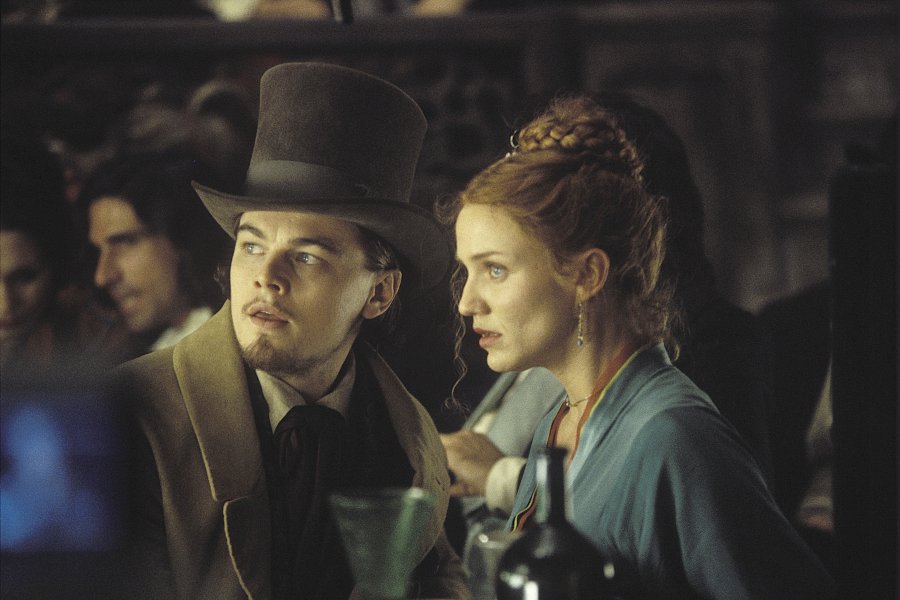
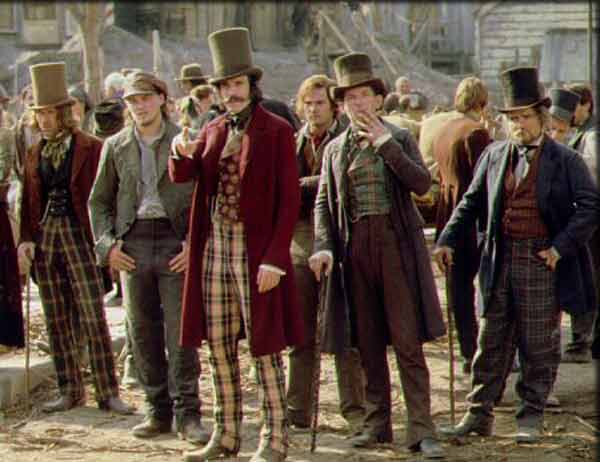
Garden State***1/2 2004
http://trailers.apple.com/trailers/fox_searchlight/garden_state/
VIDEO
http://www.youtube.com/watch?v=Q9P8Y-DTbu4
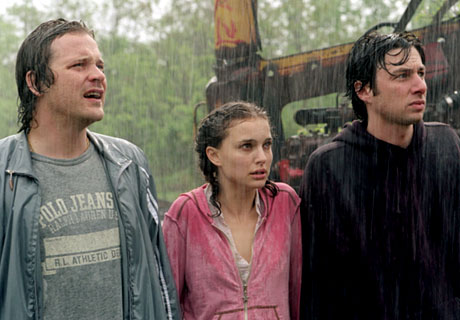
Andrew Largeman (Braff) wakes up from a dream—in which he apathetically sits on a crashing plane—to a telephone message
from his father (Holm), telling Andrew that he needs to return home because his mother has died. Andrew leaves Los Angeles
and returns home to New Jersey to attend the funeral. He recognizes the grave-diggers as old friends Mark (Sarsgaard) and
Dave (Alex Burns), who invite him to a party that night, where they meet up with Jesse (Armando Riesco), an old friend who has
just earned a fortune after creating silent Velcro. After smoking marijuana, he takes ecstasy at the party but remains detached.
At home, Andrew has his father book a doctor's appointment for headaches he's been having. The morning after the party,
Andrew proceeds to the appointment. In the waiting room, he meets a girl named Sam (Portman), who is a pathological liar. She
later explains that most times she doesn't know why she lies and will always admit to them afterward. In Andrew's meeting with
his doctor (Ron Leibman), it is revealed that Andrew has been on lithium and other mood stabilizers, as well as antidepressants,
for his entire adult life, but has recently stopped taking them. He also says that his father, who is his psychiatrist, put him on
the medication. Andrew finds Sam outside the office and offers her a ride home. Sam invites him into her house, and he meets
her mother, who inadvertently reveals that Sam is an epileptic. Andrew tells Sam of his mother's death, and Sam tearfully
eulogizes her hamster. After returning home, Andrew's father confronts him and is insistent that they have a talk before Andrew
leaves. Later, Andrew and Jesse sit in the cemetery as Mark digs another grave. Andrew observes Mark stealing jewelry from
the corpse he is burying. Andrew then returns to Sam's house, and the two spend the rest of the day together, joining his friends
later at Jesse's mansion. Andrew tells her that when he was nine years old he pushed his mother in frustration, knocking her
over a broken dishwasher in an accident that left her paraplegic; he says that his father blames him for his wife's paralysis and
put him on his medications to "curb the anger" he supposedly harbors. Sam listens and Andrew then admits his feelings for her.
The next day, Mark tells Andrew that he needs help "tracking down" a going-away present for him. Sam, Andrew, and Mark spend
the day together, ending it in a quarry in Newark where Mark talks to a man named Albert (Denis O'Hare), who is employed in
keeping intruders out of the quarry. The three visitors discuss the reasons for which Albert and his wife choose to live in the
quarry. Albert explains that living there and exploring the quarry is "doing something that's completely unique, that's never been
done before," mirroring an earlier speech by Sam. Finally, Albert explains that what actually matters is living with his family.
Andrew is inspired by the conversation, and outside in the rain, he climbs atop a derelict crane and screams into the quarry,
joined by Sam and Mark. He and Sam then share a kiss. When Mark and Andrew look at the gift later on, it turns out to be
Andrew's mother's favorite pendant, one of the items Mark stole from her grave, sold, and subsequently located. Andrew
eventually talks with his father, and states that he was not to blame for his mother's accident and that he will live the rest of
his life without medications. He forgives his father and says he wants to build a better relationship with him. The morning after,
Andrew says his goodbyes to Sam at the airport, while she begs him not to leave. He acknowledges that she has changed his life
but that he still has to fix his personal problems before continuing the relationship. Andrew boards the flight, and Sam is left
crying in a telephone booth. Andrew then returns, saying that he doesn't want to waste any more of his life without Sam. He
wonders what to do next, and the two then kiss.
Gay Divorcee, The***1/2 1934
http://www.brightlightsfilm.com/28/gaydivorcee1.php
VIDEO
http://www.tcm.com/mediaroom/video/300661/Gay-Divorcee-The-Movie-Clip-Night-And-Day.html
This is my favourite Astaire-Rogers vehicle. It is typical in its triviality and nonsense but the plot is
decorated with humorous situations involving mistaken identities and misunderstandings. A corny scene,
that manages to always attract my attention is when Guy Holden (Astaire) cuts a sillouette out of paper
and places it on a revolving turntable, hence casting a giant shadow which is viewed from outside and
taken as indication of Holden's and Mimi Glossop (Rogers) affair. Great music includes "The Continental",
"Needle in a Haystack" and a great dance sequence featuring the Cole Porter classic "Night and Day".
Alice Brady and Edward Everett Horton are hilarious comic foils, and Erik Rhodes is comical as the
bumbling and naive Tonetti.
Based on Dwight Taylor and Cole Porter's play of the same name, The Gay Divorcee centers on Mimi (Ginger Rogers), a woman
seeking a divorce from her husband. Mimi travels to an English seaside resort, pursued by the love-stricken Guy (Fred Astaire),
whom she mistakes for the hired correspondent in her divorce case. Among the many musical numbers featured are "Night and
Day," the only song from the original Broadway musical included in the film, and "The Continental," which won the first ever
Academy Award for Best Song. Directed by Mark Sandrich, the film features supportingperformances by Alice Brady and
Edward Everett Horton. ~ Matthew Tobey, All Movie Guide
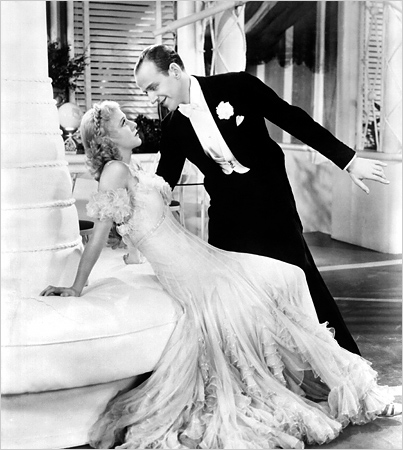
Girls In Prison*** 1956
http://www.answers.com/topic/girls-in-prison-1
http://en.wikipedia.org/wiki/Joan_Taylor
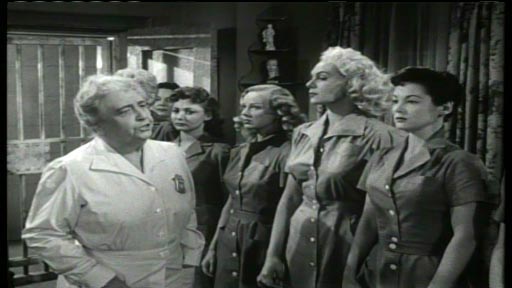
Anne Carson (Joan Taylor) is sent to a women's prison for allegedly participating in a bank robbery with two others, one, Paul
Anderson (Lance Fuller) who is still at large. The money was never recovered and all eyes are on Anne who denies knowing about
the money. On arrival in prison, Anne meets the outwardly tough matron in charge (Jane Darwell) and the prison chaplain Rev
Fulton (Richard Denning) who feels Anne may have had a mistrial and does not belong in prison. Anne's cellmates are Jenny
(Adele Jergens) who seems to run the inmates, Melanee (Helen Gilbert) who makes a play for Anne and Dorothy (Phyllis Coates)
a woman who has murdered her own husband and child when he ran away with another woman who is still alive. The unhinged
Dorothy believes her child is still alive and every new girl in prison is her husband's lover, Lois. Jenny and Melanee team up in
the "Good cop/bad cop" routine to get Anne to tell them where the money is with Melanee telling Dorothy that Anne is really Lois.
On the outside Paul is using blackmail and threats on Anne's ex-criminal father Pop Carson (Raymond Hatton) to find the money
as well as offering to split it with him 50/50. Anne faces an assassination attempt from Dorothy, threats on her life from two
other inmates seeking the money, and fights Melanee in a mudfight. When a large earthquake hits the area and demolishes the
installation, Jenny (who has acquired a pistol from her outside contacts and the outwardly harmless trustee Grandma
(Mae Marsh) and Melanee use the opportunity to escape with Anne to take her home to locate the money.
The downed telephone and power lines give the three girls time to escape unpursued but Rev Fulton heads off Anne at her home
where Pop is still held under gunpoint by Paul. Anne Carson (Joan Taylor) is sent to a women's prison for allegedly participating
in a bank robbery with two others, one, Paul Anderson (Lance Fuller) who is still at large. The money was never recovered and
all eyes are on Anne who denies knowing about the money. On arrival in prison, Anne meets the outwardly tough matron in
charge (Jane Darwell) and the prison chaplain Rev Fulton (Richard Denning) who feels Anne may have had a mistrial and does
not belong in prison. Anne's cellmates are Jenny (Adele Jergens) who seems to run the inmates, Melanee (Helen Gilbert) who
makes a play for Anne and Dorothy (Phyllis Coates) a woman who has murdered her own husband and child when he ran away
with another woman who is still alive. The unhinged Dorothy believes her child is still alive and every new girl in prison is her
husband's lover, Lois. Jenny and Melanee team up in the "Good cop/bad cop" routine to get Anne to tell them where the money
is with Melanie telling Dorothy that Anne is really Lois. On the outside Paul is using blackmail and threats on Anne's ex-criminal
father Pop Carson (Raymond Hatton) to find the money as well as offering to split it with him 50/50. Anne faces an
assassination attempt from Dorothy, threats on her life from two other inmates seeking the money, and fights Melanie in a
mudfight. When a large earthquake hits the area and demolishes the installation, Jenny (who has acquired a pistol from her
outside contacts and the outwardly harmless trustee Grandma, Mae Marsh) and Melanee use the opportunity to escape with Anne
to take her home to locate the money. The downed telephone and power lines give the three girls time to escape unpursued but Rev
Fulton heads off Anne at her home where Pop is still held under gunpoint by Paul.
:
Glass Menagerie, The**** 1950
http://en.wikipedia.org/wiki/The_Glass_Menagerie_(1950_film)
VIDEO
http://www.youtube.com/watch?v=txhFpBmhKRo
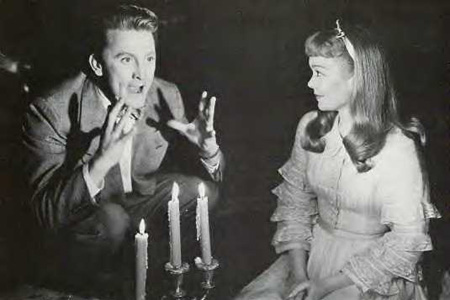
Tennessee Williams' "The Glass Menagerie" has been transferred to the screen with a great deal more striving to be funny than
was evident on the stage. As a matter of fact, the picture version, which Charles K. Feldman and Warner Brothers have
produced and which had its local premiere at the Music Hall yesterday, comes perilously close to sheer buffoonery in some of its
most fragile scenes. And this makes for painful diffusion of the play's obvious poignancy. Apparently, Mr. Williams, in reworking
the play for the screen, with the help of Peter Berneis, was persuaded to "fatten" the role of the faded and fatuous mother to
suit the talents of Gertrude Lawrence. Miss Lawrence is well known as an actress with a brilliant and devastating flair for brittle
high comedy and satire, preferably Noel Coward style. So presumably it was considered advisable to give her a chance to play
the old belle in this drama with a list towards the lady's comic side. If such was the story-conference reasoning, it was woefully
unfortunate, for the mother, as played by Miss Lawrence, is the fatal weakness of the film. Where she should plainly be a
woman of strangely pathetic gallantry—silly, confused and unendurable, yet eager for her children and always brave — Miss
Lawrence and the screenplay make her a farcically exaggerated shrew with the zeal of a burlesque comedian to see her diffident
daughter wed. For instance, the big scene of the drama is that in which the daughter entertains a wistfully wished-for suitor in
the impoverished family's sitting room. Alone, with the young man, the poor girl feels her first poignant rush of love and hope.
This is the drama's most delicate passage, and it was played without intrusion on the stage. But in the picture, the camera is
continually cutting away to Miss Lawrence peeking and listening behind the curtains in the tiny dining room, giving a perfect
imitation of a nervous mama in a domestic comedy. The mood of the warm, enchanted passage is considerably broken thereby.
Furthermore, it must be mentioned that the Southern accent which Miss Lawrence affects is not only disturbingly erratic but it
has an occasional Cockney strain. The character is sufficiently murky without this additional mystery. As much as we hate to say
so, Miss Lawrence's performance does not compare with the tender and radiant creation of the late Laurette Taylor on the stage.
On the other hand, modest Jane Wyman is beautifully sensitive in the role of the crippled and timid daughter who finds escape
in her menagerie of glass, and Arthur Kennedy is intriguingly caustic as the incredibly long-suffering son. Kirk Douglas is
appropriately shallow as the young man who comes to call. They all do very nicely by Mr. Williams' electric scenes and lines.
That is to say, they do nicely when the script and the direction permit—and that is to say when Miss Lawrence is not
overwhelming the screen. It is regrettable that Director Irving Rapper was compelled, it appears, to kick around the substance
of a frail, illusory drama as though it were plastic and not Venetian glass. On the stage at the Music Hall is a revue,
entitled "Sketch Book," featuring Kenny Bowers, the Four Macks, Duval, the Ivanovs, the Glee Club, Corps de Ballet and
Rockettes.
Girls on the Loose*** 1957
VIDEO
http://www.tcm.com/mediaroom/video/287547/Girls-On-The-Loose-Movie-Clip-Opening-Credits.html
http://www.tcm.com/mediaroom/video/287552/Girls-On-The-Loose-Movie-Clip-A-Good-Long-Rest.html
http://www.ovguide.com/movies_tv/girls_on_the_loose.htm
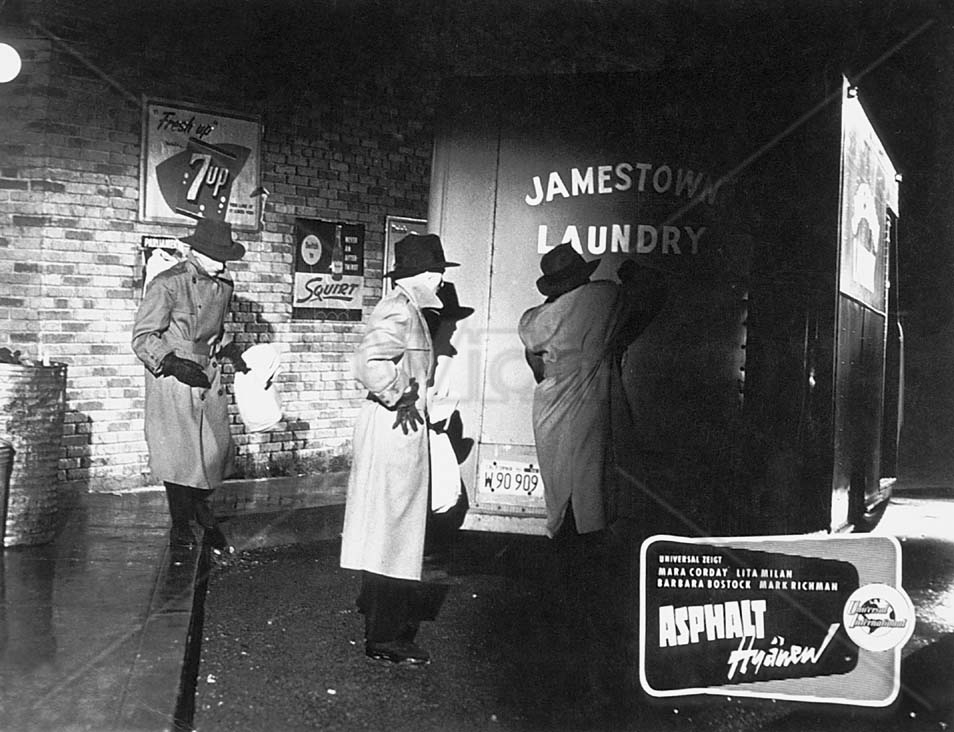
Vera Parkinson masterminds a bank robbery and, along with her sister Helen and accomplices Joyce Johanneson, Marie Williams
and Agnes Clark, all disguised as men, steals $200,000. Upon their getaway, a trussed employee attempts to trip the alarm,
causing Vera to pistol-whip him brutally. Vera and Joyce then bury the loot outside an abandoned shack, planning to let the case
cool down for two years before they retrieve it. The next morning, at the nightclub Vera owns, Vera seduces a new delivery boy
and then visits Agnes. Agnes, who is employed by the bank, has heard that the employee Vera wounded is in a coma, and is
hysterical with fear that they will be caught. Vera soothes Agnes with sleeping pills but, while the girl is asleep, asphyxiates her
with gas from the heater, then arranges the room so the death appears to be a suicide. She then visits Marie, a hairdresser who
is concerned that Helen may be too young to handle the pressure of their secret. Vera, who is fiercely protective of her sister,
dismisses Marie's fears. Meanwhile, Lt. Bill Hanley investigates Agnes' death by stopping by the club, where he finds himself
attracted to Helen, who is practicing her singing act. When Vera returns, she appears convincingly aghast when informed of
Agnes' death and agrees to testify at the inquest. Later, Vera loans Helen a skimpy dress to wear during her performance, but
when she discovers that Bill has sent Helen a corsage, she orders her to stay away from the policeman. Bill comes to see Helen
perform that night, and Marie, an alcoholic, pickpockets his wallet before Vera can warn her of his profession. Vera manages to
return the wallet to him, and later maneuvers Helen so Bill cannot speak to her alone. At the end of the evening, Vera, Marie
and Joyce go upstairs to Vera and Helen's apartment, where Marie mourns Agnes and Joyce worries about Bill's presence at the
club. After Marie leaves, Joyce guesses the Vera killed Agnes, prompting Vera to threaten Joyce with a knife. At Agnes' inquest,
Vera lies persuasively, then refuses Bill's offer to take her and Helen to dinner. When Bill looks for Helen at the club that night,
however, the cigarette girl informs him that she is at the movies, and he is able to spirit Helen out on a drive without Vera's
knowledge. The couple soon fall in love, and see each other in secret over the next few weeks. One morning, a drunken Marie
visits Joyce and guesses that Vera has killed Agnes and will soon kill them, too. Joyce puts her to bed, then leaves for work as
a masseuse. On the street, she spies Helen and Bill, and immediately informs Vera. To verify Joyce's story, Vera phones Bill's
apartment and pretends to be a nurse calling to inform Helen that Vera has been hurt. Helen rushes home and, appalled to
uncover the deception, proclaims that Vera cannot keep her away from Bill. Vera slaps her, causing Helen to rush to Bill's house.
Joyce, who has witnessed the scene and is worried that Vera is allowing Helen too much liberty, borrows Vera's car and secretly
follows Helen. At Bill's apartment, Bill comforts Helen and proposes, and in response she warns him that, after he returns from
his upcoming business trip, she must tell him a story "that isn't pretty." She drops him off at the airport and drives home, not
realizing that Joyce has damaged her tire. When Helen stops to examine the tire, Joyce, driving Vera's car, runs her over a cliff.
The next morning, Vera discovers that Helen is missing and assumes that she has run off with Bill. Days later, Marie, drunk once
again, confronts Vera, who she suspects is killing off the accomplices one by one. Marie insists on receiving her share of the
loot, and although Vera agrees, she and Joyce later kill Marie. Upon returning to the club, Vera learns that Helen, who survive
the crash, is in the hospital in a coma. She races to Helen's bedside, and when Helen awakens and blames Vera for trying to kill
her, Vera realizes that Joyce is the culprit. As Helen reveals her involvement in the robbery to Bill, Vera chases Joyce to the
shack, where the two struggle. Vera shoots Joyce, who manages to strangle Vera before dying. At the hospital, not knowing that
the rest of the robbers are now dead, Bill reassures Helen that her cooperation with the police will earn her a suspended
sentence, allowing them to marry.
Glengarry Glen Ross**** 1992
http://en.wikipedia.org/wiki/Glengarry_Glen_Ross_%28film%29
http://www.whysanity.net/monos/ggr2.html
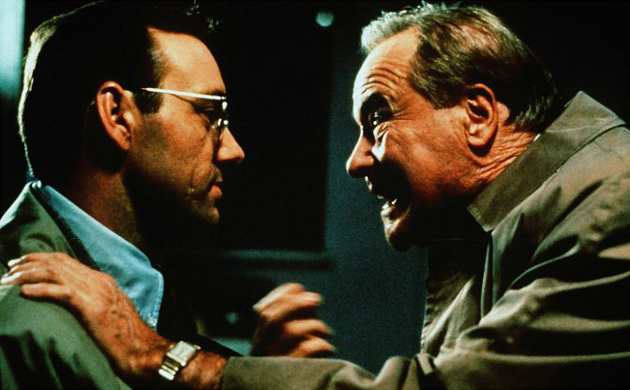
The movie begins in a Chinese restaurant somewhere in Chicago with character Shelley Levine (Jack Lemmon), a veteran real
Shelley is so distraught with the situation that he confronts office boss, Mr. Williamson (Kevin Spacey), about providing him
The movie then skips from Shelley contacting his leads to Dave Moss and co-worker, George Aaronow (Alan Akrin), going to a
ACT II
The next day, the salesmen come into work to find that the office has been burglarized and the Glengarry leads have been
During the cycle of interrogations, Lingk arrives to tell Roma that his wife has told him to cancel the deal they made the night
Suddenly, the tables turn as Mr. Williamson asks Levene: "How you know I made it up?" In his zeal to emasculate Williamson as
Mr. Williamson tells Levene that he is finished and will be turned into the authorities. Levene attempts to bargain with Mr.
Gone With the Wind***** 1939
http://www.historyinfilm.com/gwtw/
http://www.filmsite.org/gone.htm
VIDEO
http://www.tcm.com/mediaroom/video/281062/Gone-With-The-Wind-Movie-Clip-Never-Be-Hungry-Again-.html
http://www.tcm.com/mediaroom/video/281166/Gone-With-The-Wind-Movie-Clip-Tear-You-To-Pieces.html
Gerald O'Hara (Thomas Mitchell), a self-made man of Irish origin, has become rich from his cotton plantation named Tara.
Neighbour John Wilkes (Howard C. Hickman) gives a barbecue party at the Twelve Oaks plantation. Scarlett longs for Wilkes'
The start of war is announced. All the young gentlemen rush to enlist. Melanie's young brother Charles Hamilton (Rand Brooks)
Scarlett's mother Ellen (Barbara O'Neil) wants to cheer up the young widow and suggests that she go to Atlanta to live with
Soon it's Christmas, and Ashley returns home for a furlough. Scarlett is obviously still in love with Ashley, but Melanie refuses
The war drags on and the situation in the South worsens. Food is scarce. All families have lost loved ones. Melanie is pregnant
Scarlett sends Prissy in search of Rhett. He is enjoying himself at the brothel run by Belle Watling (Ona Munson). Rhett mocks
Scarlett goes on to Tara. The journey is long, cold and wet. They must hide from the Northern troops and travel mainly at night.
Intermission.
The war enters its final stages as Sherman marches through Georgia in a trail of destruction. Scarlett forces herself to make
Scarlett decides to visit Rhett Butler, who now holds the rank of Captain, to ask him for the money she needs. He is being held
Walking through the town, Scarlett and Mammy come across Frank Kennedy. He is a newly-successful businessman, selling the
Frank's and Ashley's hardware and lumber store flourishes under Scarlett's management. She refuses credit to her poor neighbors
On the way to the sawmill, two men attack her. They are on the verge of raping her when Big Sam (Everett Brown), a former
Rhett visits Scarlett, again a widow. He realizes that she has been drinking heavily, despite her attempts to cover up the smell
India and Mrs. Meade discover Scarlett hugging Ashley at the hardware store. Although the hug was rather innocent, Scarlett
In London, Bonnie has nightmares and can't sleep in the dark. Her stuffy English nurse (Lillian Kemble-Cooper) believes that the
Later, at the behest of Melanie, who has become preganant again, Rhett makes an effort to be kind to Scarlett. Sitting in the
Back in the cold and empty Atlanta mansion, Rhett tells Scarlett that, since Scarlett will never stop loving Ashley, he is leaving
In the final shot, we see Scarlett silhouetted against Tara in the sunset.
GoodFellas****1/2 1990
http://www.brightlightsfilm.com/32/goodfellas.php
VIDEO
http://www.tcm.com/mediaroom/video/244473/Goodfellas-Movie-Clip-Funny-How-.html
http://www.tcm.com/mediaroom/video/244474/Goodfellas-Movie-Clip-Jimmy-Conway.html
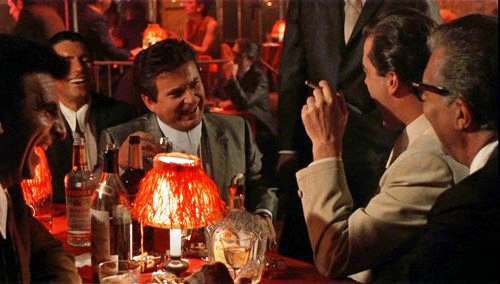
Martin Scorsese explores the life of organized crime with his gritty, kinetic adaptation of Nicolas Pileggi's best-selling Wiseguy,
the true-life account of mobster and FBI informant Henry Hill. Set to a true-to-period rock soundtrack, the story details the rise
and fall of Hill, a half-Irish, half-Sicilian New York kid who grows up idolizing the "wise guys" in his impoverished Brooklyn
neighborhood. He begins hanging around the mobsters, running errands and doing odd jobs until he gains the notice of local
chieftain Paulie Cicero (Paul Sorvino), who takes him in as a surrogate son. As he reaches his teens, Hill (Ray Liotta) is inducted
into the world of petty crime, where he distinguishes himself as a "stand-up guy" by choosing jail time over ratting on his
accomplices. From that moment on, he is a part of the family. Along with his psychotic partner Tommy (Joe Pesci), he rises
through the ranks to become Paulie's lieutenant; however, he quickly learns that, like his mentor Jimmy (Robert DeNiro),
his ethnicity prevents him from ever becoming a "made guy," an actual member of the crime family. Soon he finds himself the
target of both the feds and the mobsters, who feel that he has become a threat to their security with his reckless dealings.
Goodfellas was rewarded with six Academy Award nominations including Best Picture; Pesci would walk away with Best
Supporting Actor for his work. ~ Jeremy Beday, All Movie Guide
Seventeen years after revising the book on gangster movies in his breakthrough Mean Streets, Martin Scorsese returned to the
netherworld of Italian-American organized crime with this stunningly ambitious, ferociously entertaining look at one man's rise
and fall in a Mafia family. Shot and edited with a propulsive sense of rhythm that Gene Krupa would envy (this may be the
fastest 150 minutes in film history), Goodfellas explores the 30-year career of Henry Hill (Ray Liotta) as a "mechanic" working
for mob boss Paulie Cicero (Paul Sorvino). While most films about gangsters attribute their characters' criminal lives to greed
or sociopathic behavior, Scorsese makes it clear Henry and his friends Jimmy Conway (Robert De Niro) and Tommy DeVito
(Joe Pesci) are gangsters because they enjoy it: they like to steal, they enjoy violence, and their "work" allows them to profit
from these qualities, which would be a hindrance in nearly any other career. However, while the film offers a point-blank look
at New York's criminal underworld from the '50s to the '80s, Scorsese also uses this story as a unusual but clear moral fable.
In the first few reels, Henry and his partners follow a strict code of honor and make sure to obey Cicero's wishes: you pay
tribute to the boss, you stay away from dealing drugs, and you don't kill anyone unless it's absolutely necessary.
By the mid-'70s, these guidelines have been forgotten, and as Henry, Jimmy, and Tommy slip away from Paulie's corrupt but
strictly ordered ethical universe, it leads only to death and betrayal. Scorsese has long been fascinated with the actions of men
searching for a moral compass in a faithless land, but he's rarely told the story with such kinetic force and audacious skill.
~ Mark Deming, All Movie Guide
Good Night, and Good Luck****1/2 2005
A gripping film! George Clooney nailed this movie buy not trying to be artistic or intellectual. He told
the story as it happened and flavoured it with the chauvinism that was prevalent at that time.
Despite the severity of the issue, it was dealt with calmly. The characters were depicted as being
aware of the political and social significance of the human rights issue of intellectual freedom being
confronted by McCarthy, and contrasted this with the depiction of many political figures as simply
playing a power game.
http://movies.nytimes.com/2005/09/23/movies/23luck.html
http://www.opendemocracy.net/democracy-Film/good_night_3280.jsp
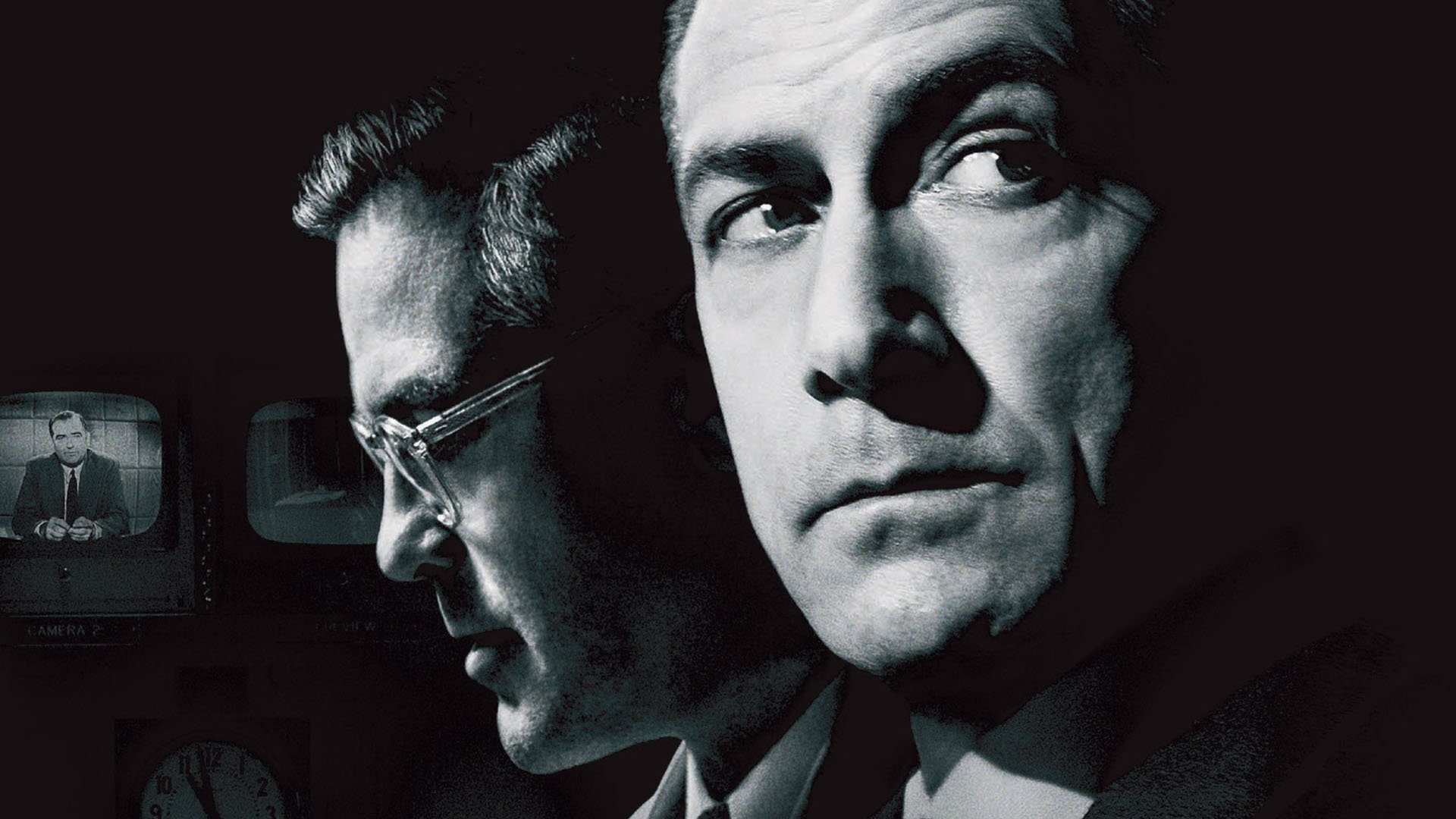
"Good Night, And Good Luck." takes place during the early days of broadcast journalism in 1950's America. It chronicles the
real-life conflict between television newsman Edward R. Murrow and Senator Joseph McCarthy and the Permanent
Sub-committee on Investigations (Government Operations Committee). With a desire to report the facts and enlighten the
public, Murrow, and his dedicated staff - headed by his producer Fred Friendly and Joe Wershba in the CBS newsroom - defy
corporate and sponsorship pressures to examine the lies and scaremongering tactics perpetrated by McCarthy during his
Grapes of Wrath, The ***** 1940
http://en.wikipedia.org/wiki/The_Grapes_of_Wrath_(film)
http://www.albany.edu/writers-inst/webpages4/filmnotes/fns02n4.html
http://www.univie.ac.at/Anglistik/easyrider/data/GrapesWr.htm
VIDEO
http://www.tcm.com/mediaroom/video/250448/Grapes-of-Wrath-The-Movie-Clip-No-More-Holy-Spirit.html
http://www.tcm.com/mediaroom/video/250453/Grapes-of-Wrath-The-Movie-Clip-Paroled.html
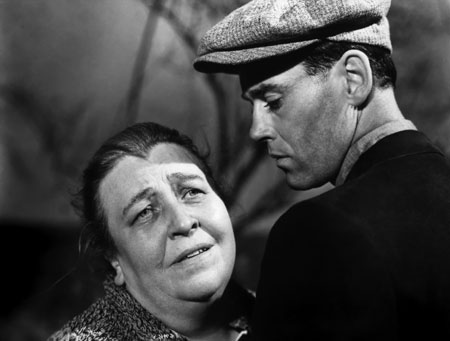
The adaptation of Nobel Prize-winner John Steinbeck's Pulitzer Prize-winning novel of dirt-poor Dust Bowl migrants by 4-time
Oscar-winning director John Ford starred Henry Fonda as Tom Joad, who opens the movie returning to his Oklahoma home after
serving jail time for manslaughter. En route, Tom meets family friend Casey (John Carradine), a former preacher who warns
Tom that dust storms, crop failures, and new agricultural methods have financially decimated the once prosperous Oklahoma
farmland. Upon returning to his family farm, Tom is greeted by his mother (Oscar-winner Jane Darwell), who tells him that the
family is packing up for the "promised land" of California. Warned that they shouldn't expect a warm welcome in California--
they've already seen the caravan of dispirited farmers, heading back home after striking out at finding work--the Joads push
on all the same. Their first stop is a wretched migrant camp, full of starving children and surrounded by armed guards. Further
down the road, the Joads drive into an idyllic government camp, with clean lodging, indoor plumbing, and a self-governing
clientele. When Tom ultimately bids goodbye to his mother, who asks him where he'll go, he delivers the film's most famous
speech: "I'll be all around...Wherever there's a fight so hungry people can eat...Whenever there's a cop beating a guy, I'll be
there...And when the people are eatin' the stuff they raise and livin' in the houses they build. I'll be there too." ~ Hal Erickson,
All Movie Guide
Greatest Question**** 1919
VIDEO
http://www.youtube.com/watch?v=Gcc110Y_d1k
http://filmsofyesterday.blogspot.ca/2011/08/greatest-question-1919.html
As a child, Nellie Jarvis (Lillian Gish) witnessed a murder, but it only remains a shadowy memory. After the death of her parents,
she is taken in by a poor but honest couple, the Hiltons (George Fawcettand (Eugenie Besserer). To help pay for her keep, she goes
to work for a very nasty pair of neighbors, the Scrubbles (George Nichols and Josephine Crowell). The Hilton's oldest son is killed
in World War I, but they are comforted when they visit his grave, and his spirit appears to them, insisting that they hang onto
their farm. Nellie, meanwhile, is being brutalized by the Scrubbles; she's saved from an attack by Mr. Scrubble only because the
jealous Mrs. Scrubble catches him. The second time Mr. Scrubble tries to have his way with Nellie, her memory of the murder
comes back in sharp focus; the Scrubbles are the killers. This time she is saved by the Hilton's youngest son, Jimmie (Robert
Harron). Oil is found on the Hilton's land, and Jimmie and Nellie promise themselves to each other. The picture, D.W. Griffith's
first for First National, features beautiful pastoral photography, courtesy of cameraman G. W. "Billy" Bitzer. The spiritualist angle,
with the dead son returning to visit his parents, was inserted because it was hot subject matter at the time; Sherlock Holmes author
Sir Arthur Conan Doyle and British physicist Sir Oliver Lodge had both brought spiritualism into temporary prominence.
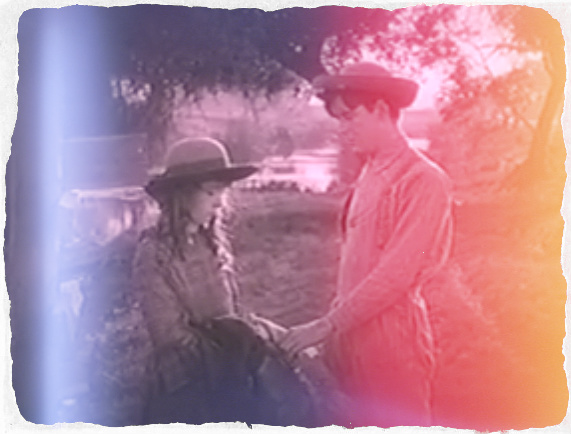
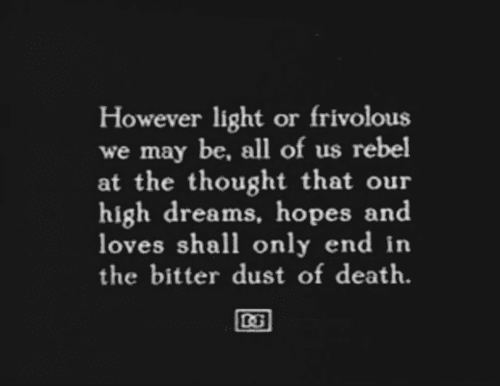
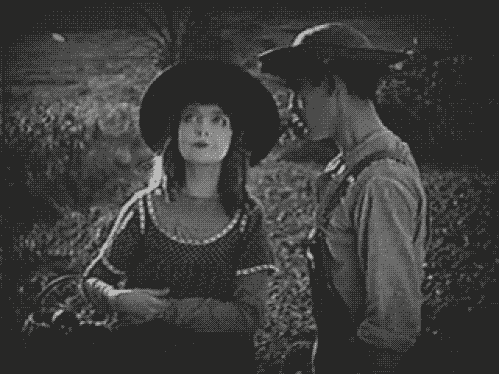
Great Expectations****1/2 1946
VIDEO
http://www.youtube.com/watch?v=QqPykWjqAAchttp://atlasshrugs2000.typepad.com/atlas_shrugs/2012/02/great-expectations.html
Immediately grabbing the audience's attention with a heart-stopping opening scene in a dark graveyard, acclaimed Britishdirector David Lean
realizes the cinematic potential of Charles Dickens' classic 1861 novel, and the result is considered by many to be one of the finest literary
adaptations ever made as well as one of the greatest British films of all time. Crystallized into a tight 118-minute running time by Lean, Ronald
Neame, and a corps of uncredited contributors, this is the story of young Pip, a lad of humble means whose training as a gentleman is
bankrolled by a mysterious benefactor. Along the way, Pip falls in love with the fickle Estella, befriends the cheerfully insouciant Herbert Pocket,
has memorable encounters with the escaped convict Magwitch and the lunatic dowager Miss Havisham, and almost (but not quite) forgets his
modest origins as the foster son of kindhearted blacksmith Joe Gargery. The role of Pip is evenly divided between Anthony Wager as a child
and John Mills as an adult; Alec Guinness makes his starring film debut as the jaunty Pocket; Jean Simmons and Valerie Hobson are costarred
as the younger and older Estella; and Martita Hunt is unforgettable as the mad Miss Havisham ("It's a fine cake! A wedding cake! MINE!")
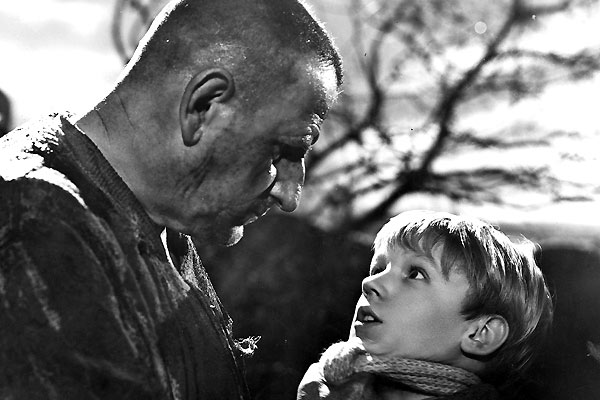
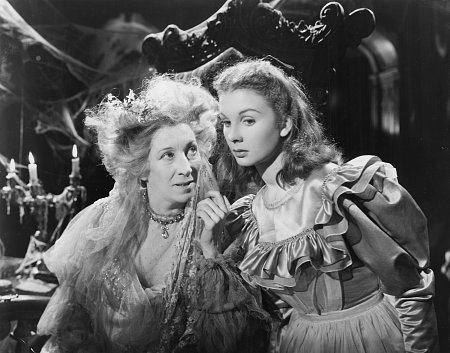
Great Lie, The**** 1939
http://en.wikipedia.org/wiki/The_Great_Lie
VIDEO
http://www.tcm.com/mediaroom/video/32082/Great-Lie-The-Original-Trailer-.html
The Great Lie is Soap Opera Deluxe from Bette Davis' peak period at Warner Bros. Davis plays a socialite who is madly in love with playboy
aviator George Brent. Brilliant but bitchy concert pianist Mary Astor (who won a well-deserved Academy Award for her chain-smoking
histrionics) is also in love with Brent, going so far as to marry him in a secret ceremony. When it appears that the marriage may be invalid,
Astor is too devoted to her art to take the necessary corrective steps, so Brent returns to Davis, who is too proud to be picked up on the
rebound. While flying an important government mission, Brent disappears and is presumed killed. Davis meets Astor, who had been
impregnated by Brent before the question of their marriage's validity came up. Since her first marriage had been in secret, Astor is terrified
that her career will be ruined by the sudden appearance of an unexplained child, so Davis, out of love for Brent, agrees to claim the baby
as her own. When Brent, who of course has not been killed after all, resurfaces, Astor demands that the child be returned to her, hoping
that the child will forever bind Brent to her. Davis tells Brent the whole sad story, whereupon our long-absent hero declares his love for
Davis and his willingness to give up the child to Astor. At the last moment, Astor returns the kid to Davis and Brent, and the film ends on a
splendiferous musical chord courtesy of overworked Warner Bros. composer Max Steiner. In lesser hands, The Great Lie would have been
outrageous hokum, but somehow Bette Davis and Mary Astor (and, to a lesser extent, George Brent) make you want to believe that the
story has some resemblance to Real Life. The film was based on the novel January Heights by Polan Blanks, which was not governed by
Hollywood censorship and thus didn't have to bend over backwards to "legitimize" the baby in the story. ~ Hal Erickson, Rovi
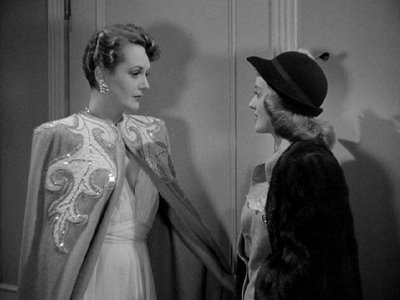
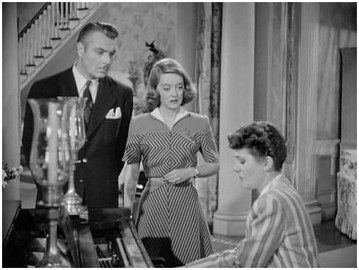
Great White Hope, The **** 1970
http://movies.nytimes.com/movie/20806/The-Great-White-Hope/overview
VIDEO
http://www.tcm.com/mediaroom/video/221126/Great-White-Hope-The-Original-Trailer-.html
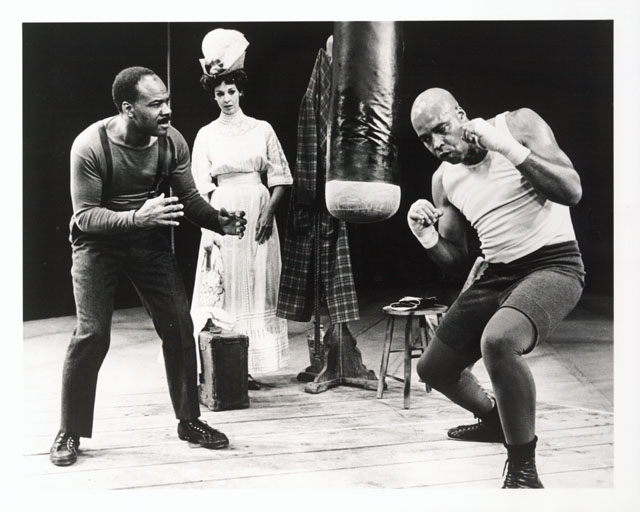
Set between 1910 and 1915, the story follows Jack Jefferson (patterned after real life boxer Jack Johnson) going on a hot streak
of victories in the boxing ring as he defeats every white boxer around. Soon the press and other whites announce the search for
a 'great white hope', a boxer who will defeat Jefferson for the Heavyweight title. Meanwhile Jefferson prepares for a few more
matches, but he lets his guard down by courting the beautiful (and very white) Eleanor Bachman, and when everyone, including
Jack's black 'wife', learns of this, the tensions grow to fever pitch. Jack's close black friends become scared over his pushing
the envelope of success and the white authorities conspire to nail him with unlawful sexual relations with Eleanor and taking
away his title. It leads to jealousy, a run from the law, and finally, disaster.
Greed***1/2 1924
http://www.filmsite.org/gree.html
http://www.tcm.com/mediaroom/video/74850/Greed-Movie-Clip-I-want-that-five-thousand-.html
Greed (1924) is one of the greatest silent films ever made, although the film was a box-office failure at the time. The 'lost' film
masterpiece is a dark study of the oppressive forces that decay and corrupt three people - a simple, uneducated former miner
and dentist (McTeague) in turn of the century San Francisco, his miserly, vulgar and pathological wife (Trina), and their mutual
friend and McTeague's ultimate nemesis (Marcus) - all are caught up by their squalid, debased passion, compulsion and greed
for gold. The wife's fixation on money causes the dentist to lose everything - he kills her, becomes maddened with the same
lust for gold, then takes flight only to find himself handcuffed to his dead pursuer in the fateful conclusion. The film is a morality
tale about how the characters are dehumanized by the influence of money upon their lives.
What remains of the film was directed by the ambitious, extravagant, stubborn and independent-minded Erich Von Stroheim -
he spent nine months shooting the film and a total of fifteen months writing and editing it (from 1923-1924). Production costs
were close to half a million dollars. [Von Stroheim is better known for his role as Gloria Swanson's butler in director Billy Wilder's
Sunset Boulevard (1950), and as the prison-camp commandant in director Jean Renoir's La Grand Illusion (1937-French).]
The film's elaborate script, adapted by June Mathis and Von Stroheim himself, was taken from Frank Norris' naturalistic,
best-selling epic novel McTeague: A Story of San Francisco (written when Norris was twenty-three in 1895 and published in 1899).
But the original tragic tale was modified - the pre-1906 earthquake plot was updated to begin in 1908 and covered a fifteen
year period (until 1923). Since Von Stroheim was determined to accurately recreate and recapture every detail of every single
page of the source material, the film became very complex and grew to unacceptable proportions. He also insisted on filming in
natural, non-Hollywood studio locales - using real exteriors in the Sierra Nevada mountains, and interiors and street scenes in
San Francisco and in Oakland. And he filmed the final fatal confrontation and shoot-out sequence in the sweltering heat of
Death Valley under the very harshest conditions.
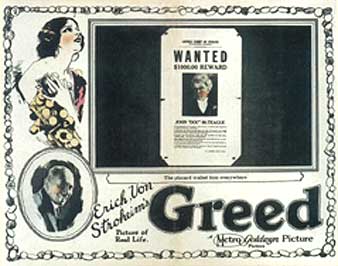 Greed, still a powerful masterpiece, is only a truncated fragment of its original form that was first presented to the Goldwyn
Greed, still a powerful masterpiece, is only a truncated fragment of its original form that was first presented to the Goldwyn
Company (the first cut was 47 reels, the second cut was approximately seven hours and 42 reels long). It is most noted for the
director's struggle with Irving Thalberg at MGM, the studio that eventually released the film and wanted it to be of acceptable,
commercial length. [A reel is approximately ten to twelve minutes in length.] Although Von Stroheim cut the film down to about
24 reels (a four-hour version), Stroheim's own director/friend Rex Ingram cut the film further to between 15 and 18 reels
(a three-hour version). It was edited even more - the current release version of the film is now shown at approximately two and
a quarter hours (about 10 reels), one quarter of its original length. The severe editing was completed by Joe Farnham and June
Mathis, Goldwyn's story editor, who hadn't read either the book or the screenplay. Reportedly, the 32 reels of edited negatives
were melted down by MGM to extract the valuable silver nitrate from the film stock. Gold-related objects in the black-and-white
film (i.e., gold coins, gold plates and vessels, gold tooth fillings, a giant gold tooth, a brass bedstead, gilt frames, the birdcage,
the canary, and gold itself) were hand-tinted frame-by-frame in the original release prints. But the original print of the film
has been lost forever, although there have been repeated rumors of its existence. A restored, four-hour version was recently
reconstructed by film archivist Rick Schmidlin - he pieced together existing footage and 650 stills with the use of the continuity
script to create a fuller sense of Stroheim's original film (with its numerous subplots and complexities).
Groundhog Day*** 1993
VIDEO
http://www.tcm.com/mediaroom/video/154054/Groundhog-Day-Original-Trailer-.html
http://www.transparencynow.com/groundhog.htm
http://www.thefilmjournal.com/issue5/groundhogday.html
This is one of those films that you can kick back and watch and many times over. It was directly very
smootly, lacking in dynamics, but somehow everything is packaged with great continuity. The plot is
well-developed as Phil (Bill Murray) gradulally unravels the great mystery of the constantly reoccuring
days (which is a very interesting premise). The supporting performances are great, in particular, Chris
Elliot, Stephen Tobolowski, Karen Geraghty, and Brian Doyle-Murray.
Self-centered and sour TV meteorologist Phil Connors (Bill Murray), new producer Rita (Andie MacDowell), and cameraman Larry
(Chris Elliott) from fictional Pittsburgh television station WPBH-TV9 travel to Punxsutawney, Pennsylvania to cover the annual
Groundhog Day festivities with Punxsutawney Phil. Having grown tired of this assignment, the small town and his crew, Phil
grudgingly gives his report and attempts to return to Pittsburgh when a blizzard (which he predicted would miss the area) shuts
down the main roads. Phil and his team are forced to stay in town an extra day.
Phil wakes up to find that he is reliving February 2. The day plays out exactly as it did before, with no one else aware of the
time loop, and only Phil aware of past events. At first he is confused, but, when the phenomenon continues on subsequent days,
he decides to take advantage of the situation with no fear of long-term consequences: he learns secrets from the town's
residents, seduces women, steals money, and drives drunk. However, his attempts to get closer to Rita repeatedly fail.
Eventually, Phil becomes despondent and tries more and more drastically to end the time loop; he gives ridiculous and offensive
reports on the festival, abuses residents, and eventually kidnaps Punxsutawney Phil and, after a long police chase, drives into
a quarry, appearing to kill both himself and the groundhog. However, Phil wakes up and finds that nothing has changed; further
attempts at suicide are just as fruitless as he continues to find himself awaking on the morning of February 2. When Phil
explains the situation to Rita, she suggests that he should take advantage of it to improve himself. Inspired, Phil endeavors
to try to learn more about Rita, building upon his knowledge of her and the town each day. He begins to use his by now vast
experience of the day to help as many people around town as possible. He uses the time to learn, among other things, to play
piano, ice sculpt and speak French. Eventually, Phil is able to befriend almost everyone he meets during the day, using his
experiences to save lives, help townspeople, and to get closer to Rita. He crafts a report on the Groundhog Day celebration so
eloquent that all the other stations turn their microphones to him. After the evening dance, Rita and Phil retire together to
Phil's room. Phil wakes up the next morning and finds the time loop is broken; it is now February 3 and Rita is still with him.
Phil is a different person than he was on February 1 and, after going outside, Phil and Rita talk about living in Punxsutawney
together.
Gun Crazy***1/2 1950
.jpg?timestamp=1354785388592)
http://en.wikipedia.org/wiki/Gun_Crazy
VIDEO
http://www.youtube.com/watch?v=yMwVsXA0TnI
The definitive Joseph H. Lewis-directed melodrama, Gun Crazy is the "Bonnie and Clyde" story retooled for the disillusioned postwar generation. John Dall
plays a timorous, emotionally disturbed World War II veteran who has had a lifelong fixation with guns. He meets a kindred spirit in carnival sharpshooter Peggy
Cummins, who is equally disturbed -- but a lot smarter, and hence a lot more dangerous. Beyond their physical attraction to one another, both Dall and
Cummins are obsessed with firearms. They embark on a crime spree, with Cummins as the brains and Dall as the trigger man. As sociopathic a duo as are
likely to be found in a 1940s film, Dall and Cummins are also perversely fascinating. As they dance their last dance before dying in a hail of police bullets, the
audience is half hoping that somehow they'll escape the Inevitable. Some critics have complained that Dall is far too effeminate and Cummins too butch, but
Joseph H. Lewis was never known to draw anything in less than broad strokes: recall the climax of Terror in a Texas Town, wherein Sterling Hayden participates
in a western showdown armed with a whaler's harpoon. The best and most talked-about scene in Gun Crazy is the bank robbery sequence, shot in "real time"
from the back seat of Dall and Cummins' getaway car. Originally slated for Monogram release, Gun Crazy enjoyed a wider exposure when its producers, the
enterprising King Brothers, chose United Artists as the distributor. The film was based on a magazine article by MacKinlay Kantor; one of the scenarists was
uncredited blacklistee Dalton Trumbo. ~ Hal Erickson, Rovi
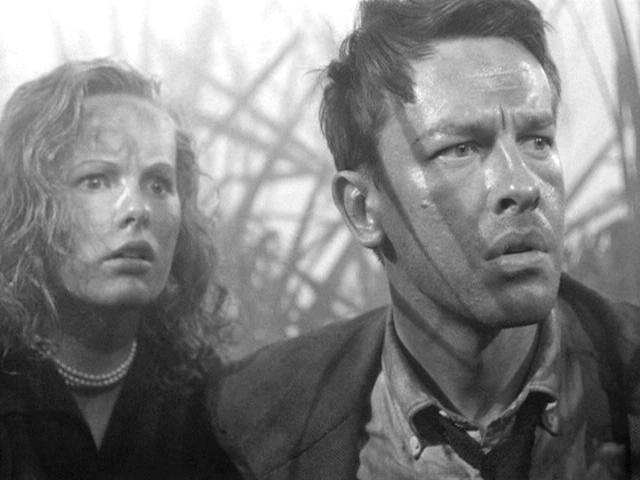
_poster.jpg?timestamp=1354785643712)
18.
Happiness**** 1998
http://en.wikipedia.org/wiki/Happiness_(1998_film)
VIDEO
http://www.youtube.com/watch?v=ZDLnwS8JE2k
After his 1995 breakthrough, Welcome to the Dollhouse, director Todd Solondz was courted by a number of studios to make a big-budget film with top stars.
Instead, he chose to make this aggressively dark comedy-drama of perversions and twisted lives. Andy Kornbluth (Jon Lovitz) explodes with anger after
rejection in a restaurant from Joy Jordan (Jane Adams), one of a trio of middle-class New Jersey sisters. Joy's sister Trish (Cynthia Stevenson), a housewife
with three kids, is married to psychiatrist Bill (Dylan Baker), who counsels the lonely, overweight Allen (Philip Seymour Hoffman). Allen is obsessed with Joy's
other sister, the successful poet Helen (Lara Flynn Boyle), all the while ignoring the attentions of his seemingly sweet yet overweight neighbor Kristina
(Camryn Manheim). Bill has fantasies of turning an assault rifle on families in a park, masturbates to teen magazine photos, and develops an unhealthy
interest in a classmate of his 11-year-old son, Billy (Rufus Read). After a telephone sales job, Joy moves on to substitute teach at an adult education class,
where she falls prey to the advances of an insensitive cabdriver, Vlad (Jared Harris). Allen's series of obscene phone calls to Helen come to an end when she
challenges him to come next door and carry out his sexual threats. Meanwhile, the sisters' parents, Lenny and Mona Jordan (Ben Gazzara and Louise Lasser),
find their marriage collapsing after 40 years. Lenny has sparked the interest of divorcée Diane Freed (Elizabeth Ashley), but he actually would prefer to be alone.
The path to happiness, it seems, is littered with dreams, despair, and abnormalities. Winner of the International Critics' prize at the 1998 Cannes Film Festival,
Happiness met with much controversy both in pre-production and upon its release, as chronicled in producer Christine Vachon's book Shooting to Kill.
~ Bhob Stewart, Rovi
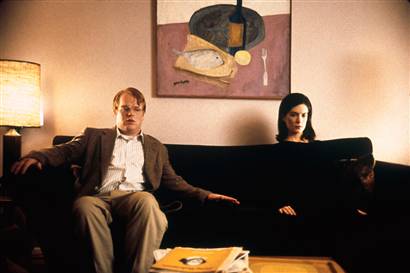
Harder They Fall, The**** 1956
http://en.wikipedia.org/wiki/The_Harder_They_Fall
VIDEO
http://www.tcm.com/mediaroom/video/224006/Harder-They-Fall-The-Movie-Clip-Opening-Intros.html
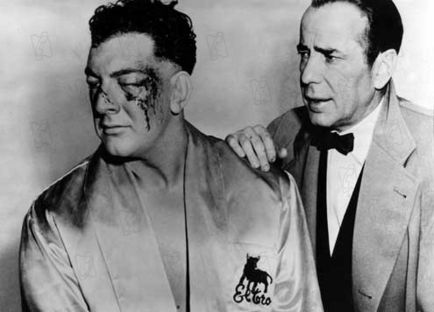
Early one morning in New York City, Nick Benko, the venal head of a boxing syndicate, offers washed-up sportswriter Eddie
Willis the job of promoting Benko's new find, a towering giant from Argentina named Toro Moreno. While watching Toro work
out in the ring, Eddie comments that the giant possesses a powder puff punch and a glass jaw, to which Benko matter-of-factly
replies that he plans to fix all of Toro's fights to generate revenues. Broke and unemployed, Eddie accepts Benko's offer and
suggests kicking off the campaign in far off California. Although Eddie's wife Beth objects that working as a press agent is
beneath him, Eddie heads for California with the good-natured, trusting Toro and the boxer's loyal manager, Luis Agrandi. In
Los Angeles, Eddie fabricates a web of lies about the unknown boxer's triumphs and parades him around in a bus bearing his
image. Eddie asks his old friend, sportscaster Art Leavitt, to join him at Toro's first match against Sailor Rigazzo, a contender
for the heavyweight crown. When Rigazzo realizes that he can handily beat the lumbering Toro and refuses to throw the fight,
Rigazzo's manager blinds him with a towel doused in chemicals, assuring the boxer's loss. When Toro is declared the winner,
Rigazzo kicks the towel toward Art, who detects the odor of chemicals and calls for an inquiry. Upon learning that he is to be
investigated, Benko offers Eddie ten percent of the profits to quash the hearing. Unable to resist the lure of financial security,
Eddie goes to see Art and asks him to withhold his testimony. Art responds by showing Eddie an interview he has filmed with a
destitute, punch-drunk boxer, who was cast aside by his boxing managers once he had outlived his usefulness. Then, as a favor
to Eddie, Art agrees to say that the match could have been honest. Afterward, when Jim Weyerhause, the spokesmen for the
managers, demands a bigger cut of the gate, Eddie, influenced by Art's film, insists on paying the boxers directly. Weyerhause,
who views boxers as little more than animals, at first objects, but finally accedes to Eddie's terms. As Toro crosses the West,
defeating all his opponents, excitement builds in the press. When Beth asks Benko for permission to join her husband, Benko
demurs on the grounds that her presence would impede Eddie's momentum. Benko and Beth finally join the tour in Chicago,
where Toro is to meet Gus Dundee, the recently defeated champion. There, Agrandi, who has not seen a penny of Toro's
winnings, asks Benko for money to send home to Toro's mother, but Benko denies his request. Upon meeting with Gus, Eddie is
disturbed to find that the former champion has not yet recovered from his debilitating defeat by Buddy Brannen, and still suffers
from splitting headaches. Annoyed by Agrandi's advocacy of Toro, Benko has the manager's visa revoked, thus forcing him to
return home to Argentina immediately. That night, Eddie is awakened by a phone call informing him that Toro has run away.
When Eddie finds Toro, surrounded by a band of Benko's bat-wielding thugs, Toro begs to go home. After his promises of fame
and fortune fail to placate Toro, Eddie vows that they will both quit after Toro fights Buddy for the championship. Although Gus
has a severe nosebleed, he is forced to face Toro in the ring. Unable to defend himself, Gus staggers and then collapses to the
boos of the bloodthirsty crowd. After he is carried off in a coma, Gus is diagnosed as suffering from a preexisting hemorrhage
aggravated by Toro's blows. Although he was fully aware of Gus's condition, Benko blames the boxing commission and referee
for the boxer's injuries, and then uses Gus's downfall to glorify Toro. After Gus dies on the operating table, Beth asks Eddie to
quit and return to New York with her, and when Eddie insists on staying to the end to collect his payoff, Beth leaves him in
disgust. At a press conference before the championship bout in New York City, Buddy, angry that Toro was credited with Gus's
demise, boasts that he killed Buddy and that Toro will be his next victim. Soon after, a priest summons Toro to his church and
shows him a letter from Mrs. Moreno, asking her son to come home and atone for killing a man. When Toro pleads to return to
Argentina, Eddie plays on his guilt by reminding the boxer of his obligations to the syndicate. Concerned about Buddy's threats,
Eddie finally tells Toro that all his matches have been fixed, and to prove his allegations, directs George, the over-the-hill boxer
who has trained Toro, to deck the fighter with one punch. Eddie then instructs Toro to stay down for the count with Buddy and
throw the fight. Disregarding Eddie's advice, Toro slugs back, enraging Buddy who delights in brutalizing the hapless boxer.
After Toro is carried from the ring with a broken jaw, George comments that some guys can sell out while others cannot. After
the match, Eddie goes to collect his share of the proceeds and is handed $26,000 by Leo, Benko's bookkeeper. When Benko
announces that he has sold Toro's contract to Weyerhause for $75,000, Eddie asks for Toro's earnings and is given $49.07.
Outraged, Eddie goes to the hospital to take Toro home. Still trusting Eddie, Toro confides that he plans to buy a house for his
mother with his share of the earnings. Ashamed, Eddie hands Toro his $26,000 and then puts him on a plane for Argentina.
Eddie then goes home to reconcile with Beth and soon after Benko pounds at the door and demands that Eddie reimburse him
the $75,000 he had to repay Weyerhause. After Eddie retorts that he has decided to write an exposé of the boxing rackets,
Benko threatens him and leaves. Slamming the door after Benko, Eddie sits down at his typewriter and begins to write.
Hard Way, The***1/2 1943
VIDEO
![]() http://www.tcm.com/mediaroom/video/471507/Hard-Way-The-Movie-Clip-You-ll-Get-Out.html
http://www.tcm.com/mediaroom/video/471507/Hard-Way-The-Movie-Clip-You-ll-Get-Out.html
http://en.wikipedia.org/wiki/The_Hard_Way_(1943_film)
This movie is outstanding, due to essentially one thing, the tremendous and intense relationship between sisters,
Katie Chernon (Joan Leslie), and Helen Chernon (Ida Lupino). Lupino played the severe and darkly passionate sister,
while Leslie plays the slightly capricious and determined sister. This typified the popular theme of the day, a story
of surviving women, fighting for an identity and independence. Jack Carson is the flamboyant blowhard (his often
played loser with a heart), and he finds the two sisters more than a match for his calculated ambitions. His character
(entertainer Albert Runkel) is a buffoon, but is overlaid with a darkness that casts a shadow of doom over the other
characters. Although rather melodramatic the story takes various twists that help to develop the character of the
sisters, challenging their fortitude, and faith in one another. The story is also well developed with the perpetually
supported commentary that none of the characters can seem to escape the fateful grasp of others. Dennis Morgan is
well cast as the stabilizing influence, and Joan Leslie is effective, because she creates complexity by being the image
of innocence, while demonstrating a fierce persistence as well.
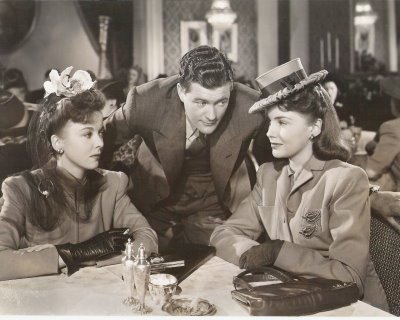
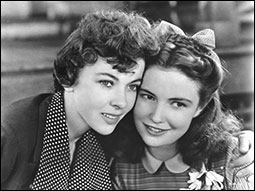
When the police question a woman they have pulled from a river after a suicide attempt, she admit(entertainer s that her name is Helen Chernen, but does not
explain why she wants to kill herself. As she lays dying, however, she recalls the events that led her from the industrial town of Greenhill to this
desperate moment: After their mother dies, Helen rears her younger sister, Katherine Blaine. When Helen's husband Sam refuses to buy Katie a
special dress for her high school graduation, Helen vows to give her sister a better life. One evening, Katie attends a vaudeville performance with
Johnny Gilpin and is enthralled by the performance of song-and-dance team Paul Collins and Albert Runkel. Later, at a soda fountain, Katie announces
her intention to become an actress and does an imitation of Collins and Runkel. Unknown to Katie, Paul and Albert enter the soda fountain and see
her performance. Albert is charmed by Katie and invites her to dance on the theater stage. When Albert drops Katie at home late that night, an irate
Helen orders him to leave her sister alone. Later, however, Helen changes her mind and encourages Albert's interest, and shortly, he marries Katie.
When Katie, Albert and Paul leave town, Helen goes with them. Helen works unceasingly to increase Katie's part in the act and eventually forces Paul
to leave. After a while, Katie is offered a part in a revue without Albert. At first she refuses to go without him, but finally accepts at his insistence. Paul
tells Helen that he has developed a kind of admiration for her cold ambition and then makes a pass, but when she responds, he dismisses her. Albert
and Paul now resume their old act and Katie moves from the chorus to a starring role in the revue thanks to Helen's manipulation. On opening night,
Katie is such a success that famous playwright Laura Bithorn resolves to write a play for her. When Albert calls to congratulate her, Helen forces her
to hang up. Paul then advises Albert to go to New York immediately, but when Albert arrives at a party in Katie's honor and begs her to return to him,
she quarrels with him, and he leaves despondent. While Katie becomes more famous, Albert's act fails. After a theater owner suggests that Albert
capitalize on his relationship to Katie, he kills himself. Albert's death affects Katie on a deep level, and she starts drinking heavily, until finally, her
producer decides to find another actress for Laura's play. Determined not to let this happen, Helen decides to produce the play herself. She and Katie
join Laura for drinks and encounter Paul in the bar. While Helen discusses business with Laura, Katie joins Paul, who is now leading a popular band.
Later, Katie visits Paul at the resort where he is working. They spend the next three weeks together, and Paul proposes marriage. Helen arrives at the
resort, unaware that Paul is also there, and when she learns that they plan to get married, she is deeply unhappy. She points out that she has
invested all her money in the play, and even though Paul insists that Katie break away from Helen before she is destroyed, Katie refuses to walk out
on her sister, and Paul breaks their engagement. On opening night, Paul comes to see Katie, but Helen sends him away. When Katie learns this, she
runs after him, but cannot find him. She then accuses Helen of wanting Paul for herself, and is so upset that she breaks down on stage. Later, she tells
Helen that she never wants to see her again and rejoins Paul. Helen is left totally alone and broke. Back at the river, Helen dies without answering the
policeman's question.
Harvey***1/2 1950
http://www.tcm.com/tcmdb/title.jsp?stid=19347
VIDEO
http://www.tcm.com/mediaroom/video/200975/Harvey-Movie-Clip-The-Evening-Wore-On.html
http://www.tcm.com/mediaroom/video/200974/Harvey-Movie-Clip-Dr-Sanderson.html
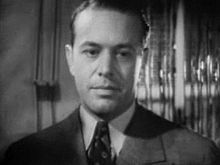
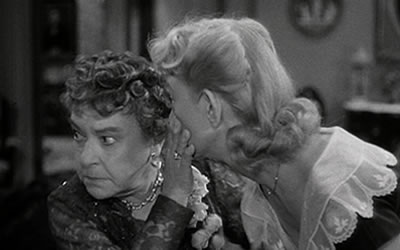
Elwood P. Dowd (Stewart) is a middle-aged, amiable (and somewhat eccentric) individual whose best friend is an invisible 6'3.5"
tall rabbit named Harvey. As described by Dowd, Harvey is a pooka, a benign but mischievous creature from Celtic mythology
who is especially fond of social outcasts (like Elwood). Elwood has driven his sister and niece (who live with him and crave
normality and a place in 'society') to distraction by introducing everyone he meets to his friend, Harvey. His family seems to be
unsure whether Dowd's obsession with Harvey is a product of his (admitted) propensity to drink or perhaps mental illness.
His sister, Veta Louise Simmons (Hull), tries to have Elwood committed to a sanatorium. In exasperation, she admits to the
attending psychiatrist (Dr. Lyman Sanderson, played by Charles Drake) that, after so many years of putting up with the invisible
rabbit, she sees Harvey every once in a while. This causes Dr. Sanderson to let Elwood out and lock Veta up. After sorting out
the mistake, Dr. Chumley, head of the sanatorium (Cecil Kellaway) decides that to save the reputation of the sanatorium he
must bring Elwood back. At one point, when her daughter asks how someone possibly could imagine a rabbit, Veta says to her
"Myrtle Mae, you have a lot to learn and I hope you never learn it." When tracked down, Elwood goes through several ordeals,
although he remains largely oblivious to the plans put in place for him by Dr. Chumley, Judge Gaffney (William Lynn) and Veta
Louise. In a poignant scene where Dr. Sanderson and his nurse Miss Kelly (Peggy Dow) follow Elwood into an alley at the back
of his and Harvey's favourite bar - Charlie's, Elwood tells the incredible story of how he came to meet Harvey, and explains
the way in which people react when they meet them. In a later scene, he gives Dr. Chumley an insight into his 'philosophy' of life'.
In the final scene of the film, Elwood (along with everybody else) arrives back at the hospital. By this point, Dr. Chumley is not
only convinced of Harvey's existence, but has begun hanging out with him on his own, with a mixture of admiration and fear.
Dr. Sanderson convinces Elwood to come into his office where he'll receive a serum that will stop Dowd from "seeing the rabbit".
As they are preparing for the injection, Elwood's sister is told by their cab driver about all the other people he has driven to the
sanatorium to receive the same medicine, warning her that Elwood will become "just a normal human being. And you know what
stinkers they are." Upset by the very thought of this, Veta halts the procedure by banging on the examining room door, at which
point Elwood comforts her and explains her tears to others with, "Veta's had a big day." At the tale's end Harvey is given the
choice of remaining with Dr. Chumley (and spending two weeks with him in Akron, Ohio) or continuing his life with Elwood. The
rabbit catches up with Elwood at the exit to the sanatorium, the gate is seen opening as Harvey follows the others out
(Harvey's existence is confirmed earlier in the film when a character looks up Pooka in a dictionary and finds he is addressed
by name in the definition.
Hatchet Man, The**** 1932
VIDEO
http://www.tcm.com/mediaroom/video/287703/Hatchet-Man-The-Movie-Clip-Find-Someone-Else-.html
http://www.tcm.com/this-month/article/29914%7C0/The-Hatchet-Man.html
Wong Low Get (Edward G. Robinson) is the most highly respected hatchet man of his Tong. Having sworn total allegiance, he cannot turn down
an order, even one to kill his best friend Sun Yat Ming♠ (J. Carrol Naish). His friend forgives him in advance of his execution, begging only that Wong
raise his daughter Toya San (Loretta Young) as his own. Wong does as he has sworn, but as she grows up, he falls in love with her. She marries
him out of a sense of obligation, but a handsome younger gangster, Harry En Hai (Leslie Fenton), gets her to leave Wong, disgracing him and
leading to a shocking tur n of events.
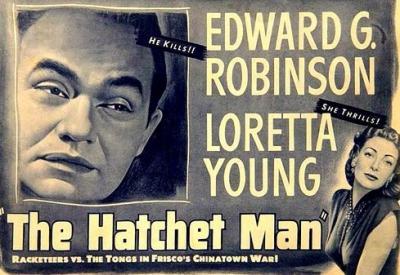
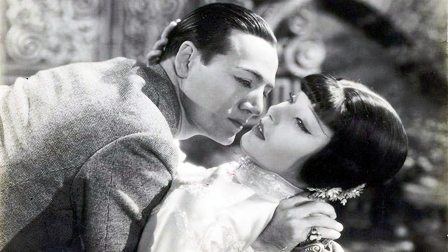
The Healer***1/2 (Little Pal)
VIDEO:
https://www.youtube.com/watch?v=FqKieUXDb98
http://mypicsandmovies.blogspot.ca/2015/08/little-pal-healer-1935.html
Dr. Holden (Ralph Bellamy) is "The Healer" (the original title) in this 1930s morally uplifting pot-boiler. He is a doctor that has come home to a warm springs to try to heal children from the unnamed crippling disease (polio). He runs a destitute camp for these children, assisted by Evelyn Allen (Karen Morley) who looks upon the Doc as a great man. Jimmy (Mickey Rooney) is a paraplegic kid whom the Doc promises to cure. This little triangle is interrupted by a rich girl Joan Bradshaw (Judith Allen) who cons the good Doc into building a sanitorium for the wealthy with her father's money. Doc is momentarily swayed, but comes to his senses just as a forest fire threatens his original cabins around the warm spring. His treatment of Jimmy pays off as Jimmy rides a bicycle to save the day. Doc realizes that his true love is Evelyn, not the self-interested Joan.
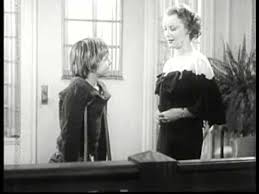
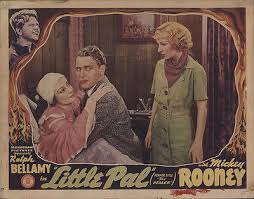
Heartbreak Kid, The ***1/2 1972
VIDEO
http://www.youtube.com/watch?v=-eohrZLdf2g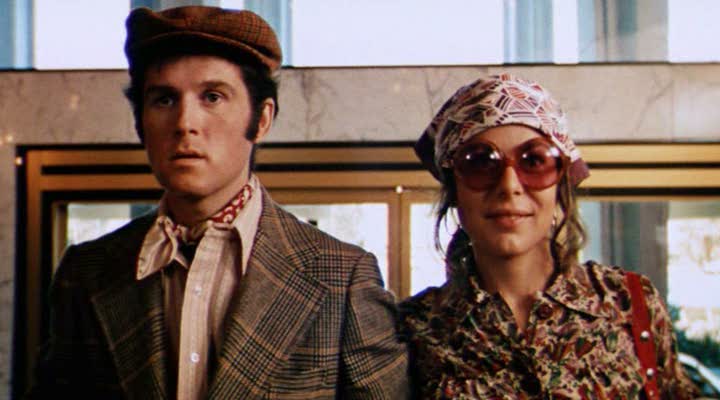
A black comedy examination of love and hypocrisy, the satire begins with the New York City traditional Jewish marriage of
emotionally-shallow, self-absorbed, "nebbish"-man-boy, Lenny Cantrow, a sporting goods salesman (Charles Grodin). While on
honeymoon at the Doral Hotel on Miami Beach, he meets and pursues a tall, blonde, Midwestern, seductively bitchy, but
sarcastically witty and gorgeous, student named Kelly Corcoran (Cybill Shepherd). His unsophisticated and emotionally-needy
bride, Lila (Jeannie Berlin, daughter of director, Elaine May), refuses to use sunscreen and consequently develops a severe
sunburn, which quarantines her in their hotel room. Lenny begins a rendezvous with Kelly, lying to his wife as to his whereabouts.
Lenny recklessly and impulsively decides to dump Lila, ending his ephemeral marriage, in order to pursue unloving Kelly, his false ideal, and ultimate fantasy shiksa-goddess. (The girl he was "waiting for all of his life". He just "timed it wrong".) She is
attending college in Minnesota, where her somewhat bigoted, suspicious and overly-protective, hostile father (Eddie Albert) is a
relentless obstacle.
Because of his lack of depth and lusty adolescent anxiety, an ongoing comedy of errors befalls Lenny during his courtship with
Kelly. Each scene peels back the converging of the morally bankrupt superficial and narcissistic personalities of the characters:
Lenny, Kelly, and her father. It is hyperbole, irony, pointed disregard, and lack of empathy played out as a moral fable, a lesson
for the audience to consider before making any permanent life-changing relationship choices, which a pathetic Lenny, who
brought about his own anguish, never fully comprehends.
The Heart of New York***1/2 1932
http://www.tcm.com/tcmdb/title/3244/The-Heart-of-New-York/full-synopsis.html
NO VIDEO avail.
Joe Smith and Charlie Dale, the Jewish-dialect comedy team famous for their "Dr. Kronkheit" sketch, provide comic relief in Heart of New York, a filmization
of Smith and Dale's Broadway hit Mendel Inc. The team costars with another Hebraic comedian, George Sidney, who portrays good-natured plumber Mendel
Maranta. Mendel goes into business for himself after inventing a revolutionary washing machine, accruing wealth beyond his wildest dreams. The
ex-plumber learns all too soon that money and happiness are not necessarily hand-in-hand commodities, especially in dealing with the romantic
misadventures of daughter Marion Byron. Smith and Dale portray Schnapps and Strudel, a pair of bickering professional matchmakers. The team never
became full-fledged movie stars, but Heart of New York showcases their talents to excellent advantage
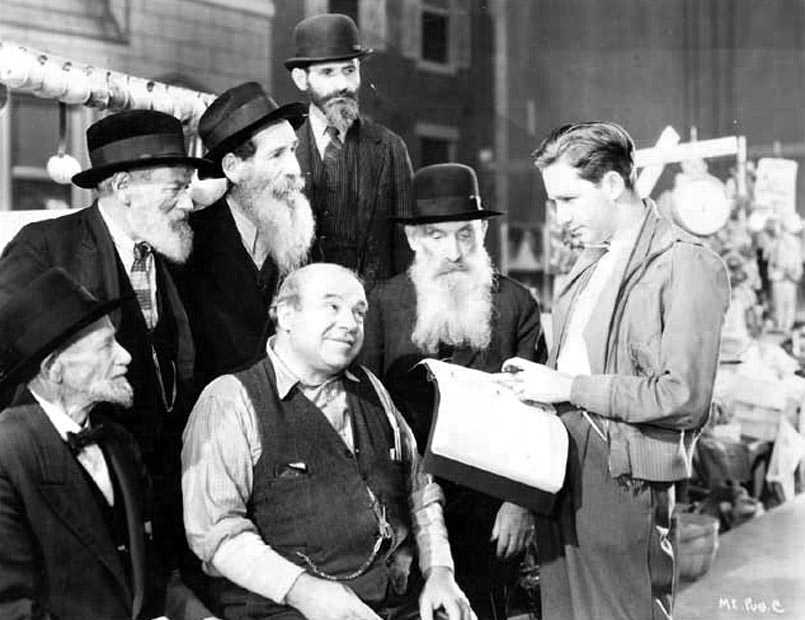
Heat***1/2 1995
http://en.wikipedia.org/wiki/Heat_%281995_film%29
VIDEO
http://www.youtube.com/watch?v=6dHrspngJnU
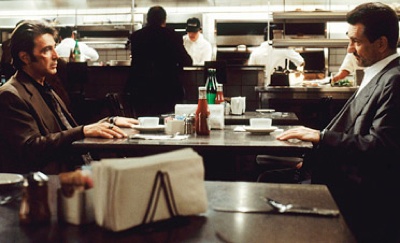
In a 2001 article in Empire magazine, writer Ian Nathan sums it up best when he writes: “Michael Mann manages to encompass
layers of character and theme, as well as action and extraordinary cinematic technique, to create a coruscating picture of the
causes, consequences and human costs of crime in a fragmented world.
Vincent Hanna is obsessed with capturing Neil McCauley. So much so that it begins to deconstruct the personal relationship he
has with his wife Justine (they can no longer communicate). Neil, on the other hand, lives a structured existence with no
attachments to anything (not even furniture). If need be, he is set to flee at a moments notice. Both these men live by rules
and procedures. They are the best at what they do because they discipline themselves to do so. It is only in personal
communication with others that they are left unaccustomed, lost for words.
Nothing sums this up more (in the film) than when Vincent has been called to the scene of a homicide. A prostitute has been
murdered and Vincent seems at ease with it (as if he is used to it). It is only when the mother of the murdered girl runs onto
the scene that Vincent is left speechless. He does not know how to verbally console the mother nor does he know how to assist
her in any other way. He simply stares at her, lost in her cries of agony. To put it simply; both Vincent and Neil are emotionally
fragile individuals. One is a cop and one is a criminal yet they share a common bond in their lack of understanding of how to
connect with someone on a personal and emotional level. That is why the coffee shop sequence (where they first meet) is so
crucial to the understanding of these men as emotionally aloof human beings. According to Ian Nathan's 2001 Empire Magazine
article, this scene is the foundation for the whole film: “On the surface, it is just a superficial conversation-two guys shooting
the breeze-but actually it’s the delicate dance of two disparate souls finding a connection”. Jul 9, 2008 Michael Peters
Heavenly Creatures***1/2 1994
http://en.wikipedia.org/wiki/Heavenly_Creatures
VIDEO
http://www.youtube.com/watch?v=VyEM6uxoo7o
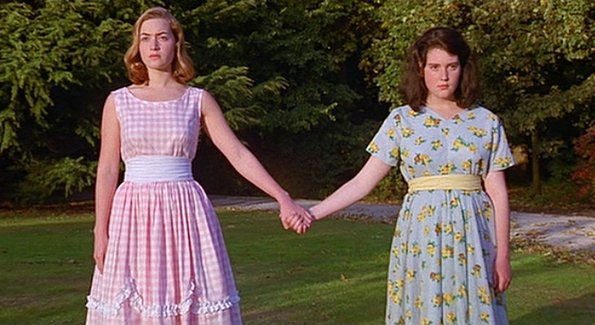
In 1950s Christchurch, New Zealand, a fourteen year old girl from a working class family Pauline Parker (Lynskey) befriends the
more affluent English fifteen year old Juliet Hulme (Winslet) when Juliet transfers to Pauline's school. Together they create
fantasy worlds and become close friends. Over the course of two years, their friendship grows more and more intense. Juliet
invites Pauline to her home in Ilam, a suburb of Christchurch. Pauline finds herself amazed by the wealth of Juliet's family.
The girls soon develop a fantasy kingdom called Borovnia, and begin to dress up and enact the adventures of the royal family.
They then write out the story lines as short novels, which they hope to publish in America. At the same time, they begin
inventing a quasi-religion centred around an imaginary place called 'The Fourth World', where they worship their favorite film
stars and opera singers as saints. Juliet has an attack of tuberculosis and is sent to a clinic. Pauline is desolate without her,
and the two begin an intense correspondence, writing not only as themselves, but in the roles of the royal couple. Pauline, who
sleeps in one of the small rooms that are a part of the boarding house her parents run, is courted unromantically by John, one
of the boarders who is in love with her, and she loses the small amount of privacy she has, when the man is discovered in bed
with her by her father. After four months, Juliet is released from the clinic and their relationship continues. Pauline records
their relationship in a diary, which was given to her by her father for Christmas. The girls' relationship has progressed and
become incredibly strong. Juliets father arrives at the Parker house and discusses the girls' intense relationship. He insists that
Paulines mother, Honora, must take Pauline to a doctor. The doctor suggests Pauline may be homosexual - regarded as a mental
illness in 1950's New Zealand. The parents agree that the girls must be separated. They will be allowed to spend two weeks
together before Juliet moves to South Africa to live with her aunt Enna, ostensibly for the warmer climate. The girls plan,
unsuccessfully, to run away together to America. They plot together the murder of Paulines mother, Honora, whom they
perceive as the main obstacle to their happiness. Juliet is nervous, but Pauline says she feels extremely excited about the
murder. Honora, Pauline and Juliet arrive at Victoria Park. They have snacks at a teahouse, and then venture down a track
where the girls ambush Honora and attack her using a brick in a stocking. While she is examining a pink stone that the girls
planted on the track, they bludgeon her to death, smashing her head to pulp with their improvised blackjack.
Hellzapoppin'***1/2 1941
A madcap comedy, on my top movie list, if only for the greatest Lindy Hop sequences ever put on film.
Martha Raye is at her crazy best! This is also a historically significant film becuase it is the pioneeer film
for alternative, avant-garde comedy. It is never vulgar or tasteless, and some of the innovative camera
work is groundbreaking. Someone in a review called this the 1941 introduction to Monty Python.
http://www.savoystyle.com/hellzapoppin.html
VIDEO
http://www.youtube.com/watch?v=qkthxBsIeGQ
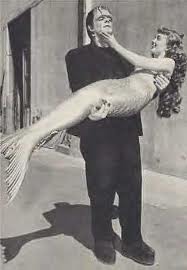
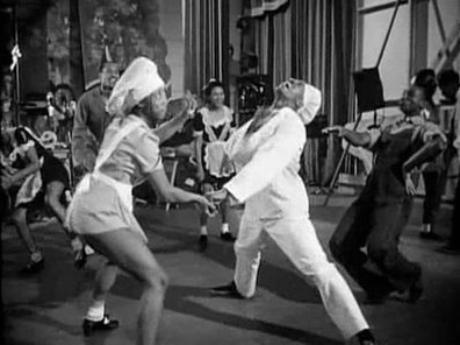
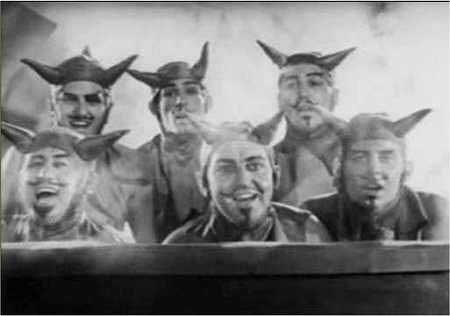
Hellzapoppin' is a 1941 Universal Pictures adaptation of the musical of the same name directed by H.C. Potter.[1] The cast
includes Ole Olsen and Chic Johnson (who produced and starred in it on Broadway), Martha Raye, Mischa Auer, Shemp Howard,
and The Six Hits.
The credits for the movie assert that "any resemblance between Hellzapoppin' and a motion picture are coincidental"—a truth
that is perhaps responsible for it being less successful than the stage show which engendered it. The film does have some great
visual humor, however, including a number of special effects that couldn't be duplicated on stage.
Shemp Howard begins the film as the projectionist of a cinema, displaying on its screen what appears to be the start of a song
-and-dance number whose classily dressed performers walk down a staircase - which collapses as in a fun-house ride, sliding
them all straight to hell. Demons punish them in various ways. Ole and Chic arrive in the midst of the mayhem by taxi, and
after a bit of funny business step back to reveal that it's a movie sound stage. They work for Miracle Pictures (with the slogan
"If it's a good picture, it's a Miracle!"). A mousy screenwriter (Elisha Cook, Jr.) outlines his script for the screen adaptation
of Hellzapoppin', and the rest of the movie depicts Cook's crazy script. Among the topical humor is Johnson picking up a sled
named "Rosebud" and saying "I thought they'd burnt that" (Olsen and Johnson were friends of Orson Welles, whose film
Citizen Kane climaxes with Kane's childhood sled being burnt).
The dance scenes from the movie are some of the best-known Lindy Hop scenes from the swing era, and they have made the
film popular among modern Lindy hoppers. One frenetic routine is performed by Whitey's Lindy Hoppers, and another notable
dance scene features Martha Raye and Dean Collins. At the present, Hellzapoppin' (like almost all Olsen and Johnson films) is
hard to find on commercial DVD. Second Sight (via an arrangement with Universal) released the film commercially in England
on region 2 format DVD (release date 2007). The film was scheduled for screening at the non-profit Mid-Atlantic Nostalgia
Convention in September 2008. The 1982 film Forbidden Zone shows a direct influence from Hellzapoppin', following a very
similar, live-action cartoon-in-Hell scenario with a variety of 1930s and 1940s songs and the occasional Fleischer Studio nod.
The film was directed by Richard Elfman and features an early appearance by the music group that would soon be known as
Oingo Boingo. The Mystic Knights Of The Oingo Boingo, as they were called in the film, included Danny Elfman, later an
Oscar-nominated composer known best for his work on several Tim Burton films. The nomination for "Pig Foot Pete",
an Academy Award nominee for Best Song in 1942 (it lost to "White Christmas"), was attributed to Hellzapoppin', but it never
appeared in that film. It actually appeared in the Abbott and Costello film Keep 'Em Flying.
Here Comes Mr. Jordon**** 1941
http://en.wikipedia.org/wiki/Here_Comes_Mr._Jordan
VIDEO
http://www.tcm.com/mediaroom/video/222829/Here-Comes-Mr-Jordan-Movie-Clip-I-m-the-Next-Champ-.html
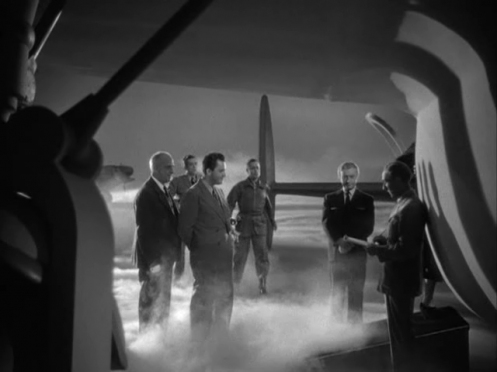
Robert Montgomery plays saxophone-playing boxer Joe Pendleton, who insists upon piloting his own plane, much to the
consternation of his manager Max Corkle (James Gleason). Just before a championship bout, Joe's plane crashes. When he
revives, he finds he has been whisked away to Heaven by the overanxious Messenger #7013. Checking with the man in charge,
one Mr. Jordan (Claude Rains), Pendleton discovers that he isn't scheduled to die for another 50 years. Joe heads back to earth,
only to learn to his chagrin that his body has been cremated. Mr. Jordan is obliged to find Joe a new body; the "candidate" is a
business mogul named Farnsworth, who is in the process of being murdered in his bath by his wife (Rita Johnson) and her lover
(John Emery). Joe takes over Farnsworth's body, astonishing the murderers by emerging from the bathroom, very much alive
(while Joe still looks like Joe to himself and the audience, he looks like Farnsworth to everyone else). Still desirous of winning
the upcoming championship, Joe begins to whip Farnsworth's body into shape, even hiring Max Corkle to manage him. It takes
some doing, but Joe convinces Max that he is indeed Joe and not Farnsworth (their scenes together are priceless, far better
seen than described). Meanwhile, Joe has fallen in love with Bette Logan (Evelyn Keyes), a woman whose father had been ruined
by the real Farnsworth. For her sake, he pays back millions of dollars that the crooked Farnsworth had finagled out of his
investors. This prompts Mrs. Farnsworth and her lover to kill "Farnsworth" again, and once more Joe Pendleton is without a
body. How Mr. Jordan arranges for Joe to win the championship, expose the murderers and walk off arm and arm with Bette
is a bit too complex to detail here. Here Comes Mr. Jordan is one of the most consistently clever romantic comedies of the
1940s, and richly deserving of the Oscars won by screenwriters Sidney Buchman, Seton I. Miller and Harry Segall. A sequel,
Down to Earth, was filmed in 1947, with Roland Culver as Mr. Jordan; and in 1978, the original Jordan was remade by Warren
Beatty as Heaven Can Wait. ~ Hal Erickson, Rovi
Heroes For Sale**** 1933
http://en.wikipedia.org/wiki/Heroes_for_Sale
http://www.tcm.com/mediaroom/video/78847/Heroes-For-Sale-Original-Trailer-.html
During World War I, Lieutenant Roger Winston is assigned to capture a German prisoner. Overcome by fear, he hides in a foxhole while Tom Holmes,
another soldier from tame town, carries out the mission. On the way back, Tom is struck by a shell and Roger returns with the prisoner. Roger is
promoted and decorated for bravery. Returning to America after the war, Roger meets Tom, who he believed to be dead. Tom's life was saved by the
Germans, but in the prisoner of war camp, he took morphine for his pain and is now addicted to the drug. Roger gets Tom a job in his father's bank,
but his addiction gets him fired. He is sent to a sanitarium where he overcomes his addiction but in the meantime, his mother dies from the disgrace.
Tom goes to Chicago to look for a job and there he meets Ruth, a young woman who works in a laundry. They fall in love, marry, and have a child.
Max, a socialist who lives in the same roominghouse, invents a laundry machine. Tom, who is now employed at the laundry, convinces his fellow
workers to invest in the machine, but when the benevolent laundry owner dies, the new owners use the machine to lay off workers. The fired workers
riot, Ruth is killed, and Tom is sent to prison for five years, even though he tried to prevent the mob from attacking the laundry. Max makes a lot of
money from his invention and gives half to Tom as his share. Tom will not touch what he calls blood money and turns it over to Mary Dennis, the
owner of his roominghouse, to feed the jobless. Believing Tom to be a Communist, the police drive him out of town, and he becomes a homeless
wanderer unable to find a job. On the road, he meets Roger, whose father's bank failed because of mismanagement. Although the police drive them
back on the road, the two veterans express hope that President Franklin D. Roosevelt's New Deal will improve the lot of the poor.
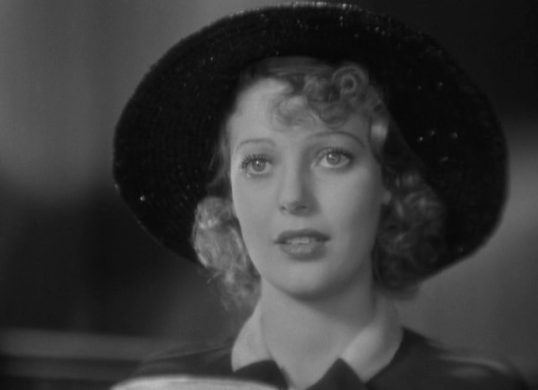
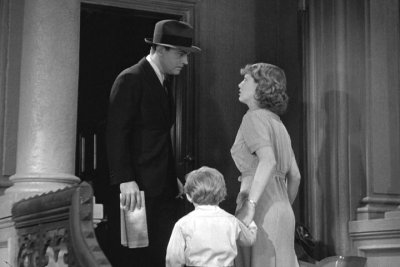
High Sierra**** 1941
VIDEO
http://www.tcm.com/mediaroom/video/280932/High-Sierra-Movie-Clip-That-s-Venus.html
http://www.tcm.com/mediaroom/video/280930/High-Sierra-Movie-Clip-Think-Nothing-Of-It.html
http://movies.nytimes.com/movie/22400/High-Sierra/overview
An aged gangster, Big Mac (Donald MacBride), is planning a robbery at a California resort casino, and he wants an experienced
Roy Earle (Humphrey Bogart), just released from an eastern prison by a governor's pardon, to lead the heist and to take charge
of the operation. Roy drives across the country to a camp in the mountains to meet up with the three men who will assist him in
the heist: Louis Mendoza (Cornel Wilde), who is working in the resort, and Red (Arthur Kennedy) and Babe (Alan Curtis), who are
already living at the camp. Babe has also brought along a young woman, Marie (Ida Lupino). Roy wants to send Marie back to Los
Angeles, but after some argument she convinces Roy to let her stay. At the camp Roy also is adopted by a small dog called Pard.
Marie falls in love with Roy as he plans and executes the robbery, but he does not reciprocate. On the drive up to the mountains,
Roy met the family of Velma (Joan Leslie), a young woman with a deformed foot who walks with a limp. Roy pays for corrective
surgery to allow Velma to walk normally. While she is convalescing, Roy asks Velma to marry him, but she refuses, explaining
that she is engaged to a man from back home. When Velma's fiancé arrives, Roy then turns to Marie, and the two become lovers.
The heist goes wrong when they are interrupted by a security guard. Mendoza, Red and Babe are involved in a car accident; Red
and Babe die. Mendoza talks to the police. While Roy and Marie leave town, a dragnet is put out for him. The two separate in
order to allow Marie time to escape, while Roy is pursued until he climbs one of the Sierra mountains, where he holes up
overnight. Shortly after sunrise, Roy trades shots with the police down the mountain from him, he hears Pard barking and runs
out calling Marie's name and is shot dead from behind by a sharpshooter.
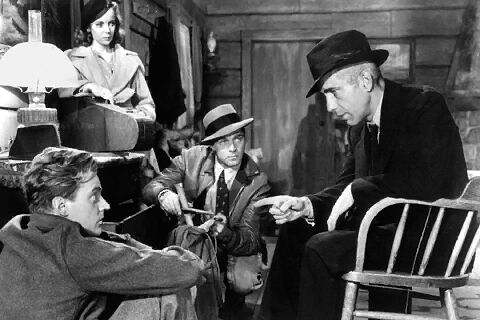
His Girl Friday**** 1940
http://www.tcm.com/tcmdb/title/206/His-Girl-Friday/full-synopsis.html
http://www.tcm.com/mediaroom/video/577701/His-Girl-Friday-Movie-Clip-Don-t-Get-Poetic.html
http://www.tcm.com/mediaroom/video/186839/His-Girl-Friday-Movie-Intro-Outro-Cybill-Shepherd.html
The second screen version of the Ben Hecht/Charles MacArthur play The Front Page, His Girl Friday changed hard-driving newspaper reporter
Hildy Johnson from a man to a woman, transforming the story into a scintillating battle of the sexes. Rosalind Russell plays Hildy, about to foresake
journalism for marriage to cloddish Bruce Baldwin (Ralph Bellamy). Cary Grant plays Walter Burns, Hildy's editor and ex-husband, who feigns
happiness about her impending marriage as a ploy to win her back. The ace up Walter's sleeve is a late-breaking news story concerning the impending
execution of anarchist Earl Williams (John Qualen), a blatant example of political chicanery that Hildy can't pass up. The story gets hotter when Williams
escapes and is hidden from the cops by Hildy and Walter--right in the prison pressroom. His Girl Friday may well be the fastest comedy of the 1930s, with
kaleidoscope action, instantaneous plot twists, and overlapping dialogue. And if you listen closely, you'll hear a couple of "in" jokes, one concerning
Cary Grant's real name (Archie Leach), and another poking fun at Ralph Bellamy's patented "poor sap" screen image. Subsequent versions of The
Front Page included Billy Wilder's 1974 adaptation, which restored Hildy Johnson's manhood in the form of Jack Lemmon, and 1988's Switching Channels,
which cast Burt Reynolds in the Walter Burns role and Kathleen Turner as the Hildy Johnson counterpart. ~ Hal Erickson, Rovi
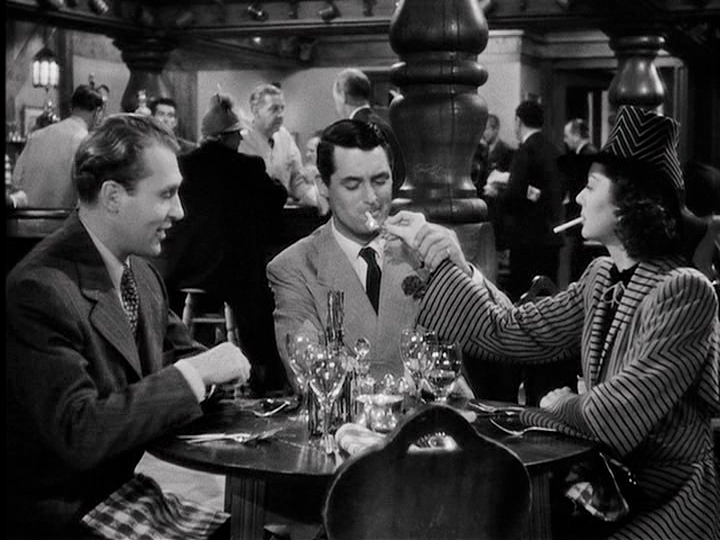
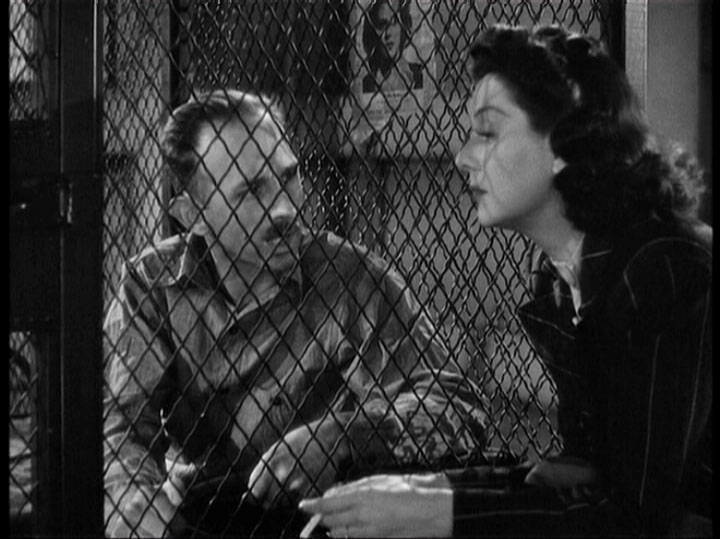
Holiday**** 1938
http://en.wikipedia.org/wiki/Holiday_%281938_film%29
http://www.tcm.com/mediaroom/video/462150/Holiday-Movie-Clip-Your-Nose-Is-Frozen.html
http://www.tcm.com/mediaroom/video/462146/Holiday-Movie-Clip-What-Do-Most-Girls-Do-.html
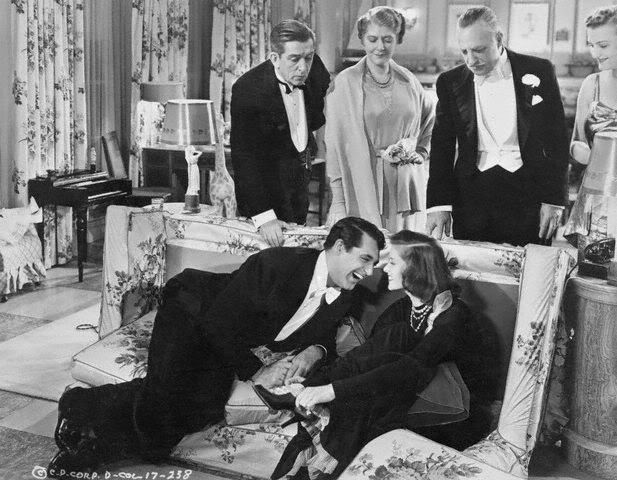
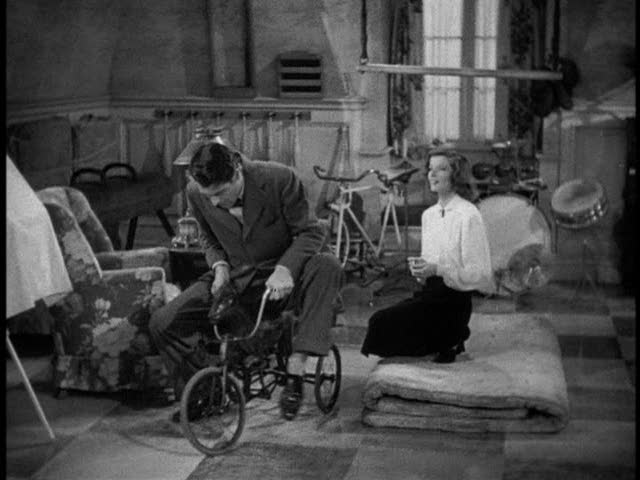
Holiday has always been my favorite Hepburn film. I loved the faith and loyalty that Kate , as Linda Seton was willing to give to
the man she loved. Johnny Case, played by Cary Grant has an unusual idea of retiring young after making a fortune and is
in love with Linda's sister Julia. All during the film Julia and her father try to convince Johnny to give up his dream if he wants
to marry her. Linda believes in Johnny and wants Julia to support him, while finding that she is also falling in love with him.
The supporting cast that includes Edward Everett Horton and Jean Dixon as Johnny's friends, the Potters are just enchanting.
Lew Ayres plays Linda and Julia's drunken brother who represents many young and unfulfilled men of the time. See this film,
it has some truly great quotes and is played to perfection.
Holiday Affair**** 1949
http://www.tcm.com/tcmdb/title/78191/Holiday-Affair/
http://www.tcm.com/mediaroom/video/281481/Holiday-Affair-Movie-Clip-Tired-Beautiful-Girl.html
http://www.tcm.com/mediaroom/video/281482/Holiday-Affair-Movie-Clip-Open-Red-Rocket.html
A simple little film done with all the right touches and excellent performances. This film has a number of
wonderful vignettes that are neatly comic and develop the characters fittingly and empathetically. The
park scene where Steve gets his "noisy" tie, and the "sudden proposal" scene are unforgettable. The script
that is adapted to illustrate the relationship between Connie and her son Timmy is exquisite and Gordon
Gebert is priceless as Timmy, the incorrigible boy. Mitchum is his breezy self which makes him a difficult
target for Connie. There is a strange darkness to the film, that contrasts the warm, cozy Christmas setting.
We sense doom, or uncertainty, and are a bit unsure of Steve. Connie's strength and independence seems
to win out over everything.
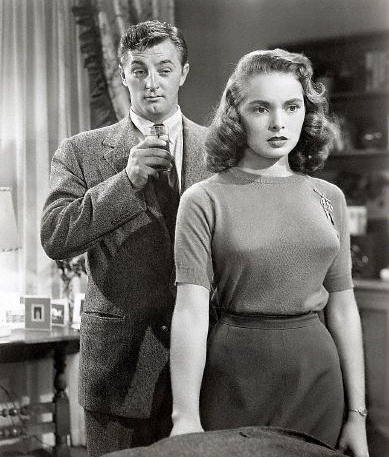
At first glance that steamy noirish poster might come off as a pretty deceptive piece of advertising for what looks like just
another boy meets girl, post-war, studio Christmas film. But bubbling beneath the surface of “A Holiday Affair” are some
pretty heavy themes that give this under-rated classic an unexpected emotional maturity and complexity. Though only 22
years-old at the time, the heart-stoppingly gorgeous Janet Leigh is superb and mature beyond her years as Connie Ennis,
a war widow and single mother who understands that her young son Timmy needs a father even though she’s unwilling to betray
the memory of her dead husband by falling in love with someone else. This is what makes Carl (the always excellent Wendell
Corey) a perfect suitor. Buttoned down, bland and safe, Carl’s a good man who will always love and take care of her and Timmy,
but Connie doesn’t and will never fall in love with him. Enter Steve Mason (Robert Mitchum) to really complicate things. Steve’s
a devil-may-care drifter working this job and that and in no hurry to save money for a sailboat when — in a pretty effective
meet-cute — Connie gets him fired from his job as a toy department sales clerk just a few days from the holidays. A number of
believable plot contrivances keep Steve and Connie in regular contact until a potential romance blooms that makes things
stickier for Connie than she would like. One of the reasons the love triangle works so well is due to Corey’s very sympathetic
portrayal of Carl. In CinemaWorld, guys who look like Carl aren’t supposed to end up with gals who look like Connie, and from
the moment the sleepy-eyed Mitchum enters the scene Carl becomes our underdog and, like Connie, we feel a little guilty rooting
against him. The plot might not surprise, but there are a number of individual scenes, all of them involving Mitchum, that do.
Sharp, perceptive dialogue that roots around the human condition and comes up with some universal pearls of wisdom. The
film’s warm Christmas flavor and spirit arrives courtesy of an effective backlot standing in for a snowy Manhattan, young
Timmy’s desperate need for an expensive train set and in the film’s most memorable scene, his encounter with the friendly
president of big city department store.
Home Before Dark**** 1958
http://movies.nytimes.com/movie/review?res=9405E3DD143DE53BBC4F53DFB7678383649EDE
http://www.tcm.com/mediaroom/video/387638/Home-Before-Dark-Movie-Clip-Come-Back-And-See-Us.html
Terrific. Jean Simmons is so dynamic in this film that it left me spellbound. The theme of mental illness is
beautifully illustrated with the evolving realization that it isn't necessarily an illness at all, simply a case
of chronic unhappiness! Insecurity, a common thread in most of us, is exacerbated by manipulation. Jean
Simmons character loses her ability to recognize the source of people's emotions, as those around her
confuse her with unspoken intention. Gradually she begins to attain an important facet of herself,
assertiveness, and finds incredible weakness and a lack of integrity of people she admired. This film is
highly recommended for anyone seeking therapy for any mental condition that borders on a sense of
helplessness. Another amazing characteristic of this film is that is beautifully paced and is never impeded
with hokey, implausible or ridiculous scenes, so often produced in Hollywood films.
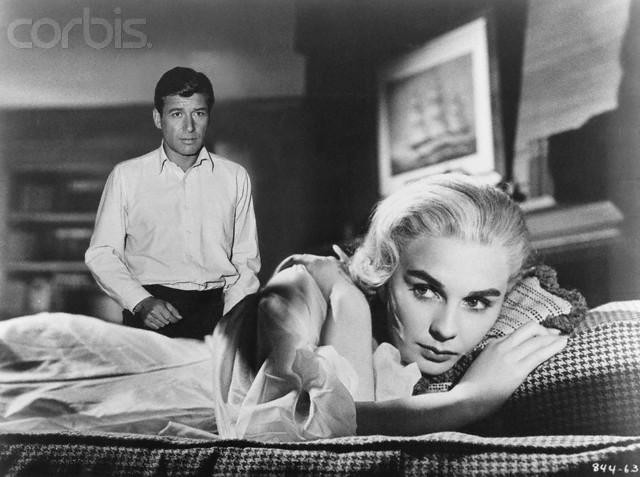
Wearing a curiously (and perhaps deliberately) unattractive blonde wig, Jean Simmons stars in the tense psychological drama
Home Before Dark. Having just recovered from a nervous breakdown, Charlotte Bronn (Simmons) returns from a mental
institution to the home she shares with her academician husband Arnold (Dan O'Herlihy). Though he tries his best to help
Charlotte re-adapt, his efforts are undermined by the insensitive meddling of her stepmother Inez (Mabel Albertson) and
stepsister Joan (Rhonda Fleming) who may or may not have been carrying on a romance with Arnold in Charlotte's absence.
The untenable situation at home leads Charlotte into a romance with college professor Jake Diamond (Efrem Zimbalist Jr.),
who as an ongoing target of anti-semitism has plenty of his own emotional baggage to deal with. What is remarkable about
Home Before Dark is that it is a film without a villain: even the most unpleasant characters are drawn as three-dimensional
human beings, who behave badly because they really don't know any better. The film was adapted by Robert and Eileen Bassing
from Eileen's same-named novel. ~ Hal Erickson, Rovi
Review
See Home Before Dark for Jean Simmons' shimmering, beautiful portrayal -- but be prepared to be frustrated. Simmons aloneHostel***1/2 2005
http://en.wikipedia.org/wiki/Hostel_(2005_film)
http://www.youtube.com/watch?v=_5qVrmBANTE
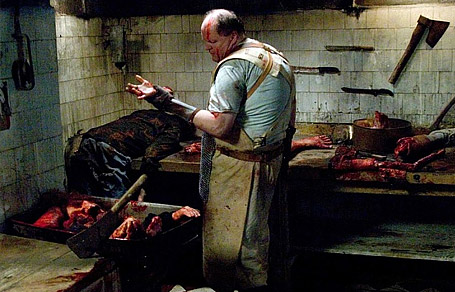
The American pals Paxton and Josh meets with the Islander Oli in Paris and the three backpackers travel together to Switzerland,
Belgium and Amsterdam having Barcelona as final destination, looking for sex, drugs and booze. While in Amsterdam, they meet
Alex, who shows pictures of gorgeous women in gang bang, and suggests the trio to visit the hostel in Bratislava, Slovakia, a place
crowded of hot, promiscuous and sexy girls. When they arrive, they meet three delicious girls in the hostel and they believe they
have found the lost paradise of sex on Earth. But sooner they find that they have been sold to a sadistic group of the Elite Hunting,
and their dream becomes their worst nightmare. Written by Claudio Carvalho, Rio de Janeiro, Brazil
Hot Saturday**** 1932
VIDEO
http://www.carygrant.net/reviews/saturday.html
In the small town of Marysville, young people spend hot Saturday nights at Willow Springs, a lakeside dance hall. Romer Sheffield,
a wealthy city man who has a summer home on the lake, becomes infatuated with Ruth Brock, who works at the town bank owned
by Mr. Ed. W. Randolph. In order to get closer to Ruth, Romer hosts a party for her friends on Saturday evening, July 23rd.
Although Ruth arrives at the party with Connie Billop, she spends a few innocent hours alone with Romer, then returns to find that
everyone has left for Willow Springs and joins them with Connie. When Ruth and Connie go for a boat ride, she refuses to neck
with him, and he leaves her stranded on the beach. Walking through the woods, Ruth finds Romer's house and spends a few more
innocent hours with him. When jealous Eva Randolph, the banker's daughter, sees Ruth arriving home in Romer's car, she starts
a rumor that Ruth spent the night with Romer. Sneaking through the house, Ruth finds Bill Fadden, a childhood friend, in her kitchen.
Bill is about to leave to conduct a geological survey in nearby Indian Cave. Over the weekend, a scandal builds, which ruins Ruth's
reputation, and on Monday morning, Mr. Randolph fires her, calling her an immoral woman. Although her father defends her, Ruth's
mother believes the gossip and is more worried about the family's loss of income than Ruth's feelings. Ruth runs away in a rain
storm to Bill's camp, where they make plans to marry. While the gang celebrates at Willow Springs, Romer, whom Eva invited,
asks Ruth to dance, but leaves graciously when he learns she is to be married. Bill, meanwhile, overhears Connie talking about
the scandal and is furious that Ruth neglected to tell him about Romer. Realizing Bill does not trust her, Ruth leaves with Romer.
The next morning she arrives home and breaks her engagement with Bill, admitting she finally did spend the night with Romer. As
Ruth and Romer leave for New York, he promises to marry her.
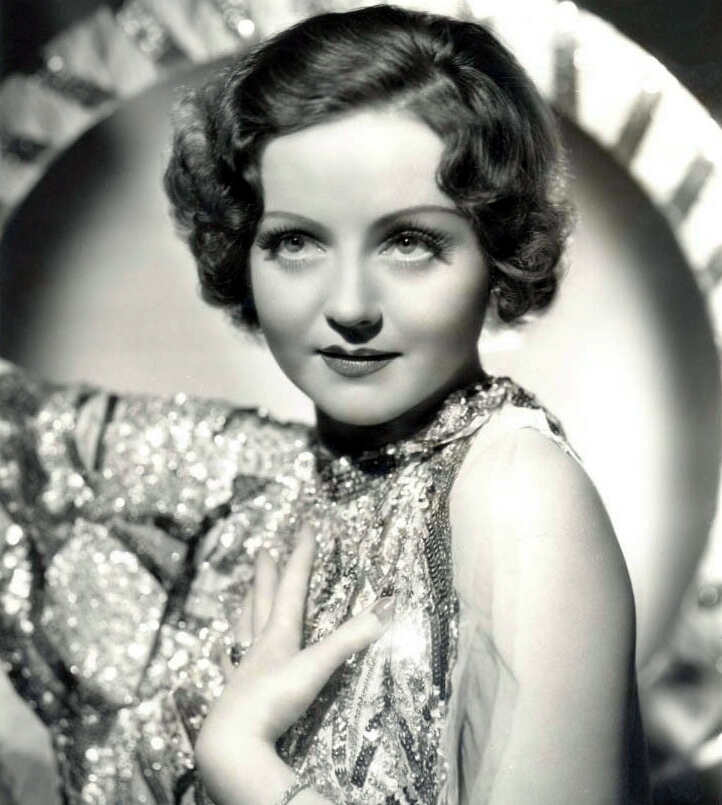
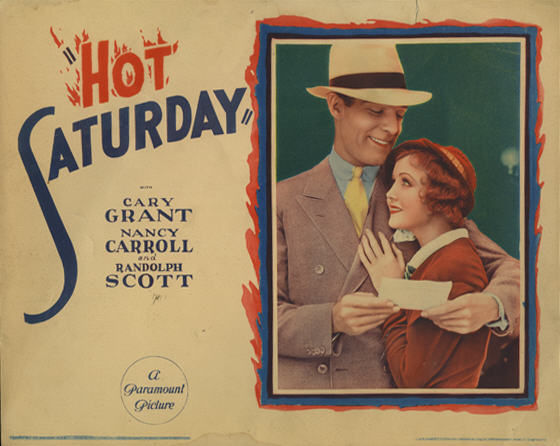
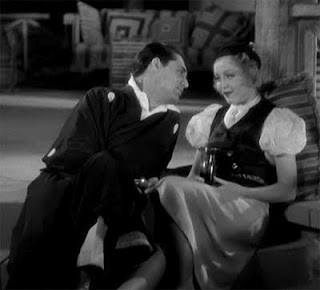
Hound of the Baskervilles, The****1/2 1939
http://www.videodetective.com/movie_trailer/THE_HOUND_OF_THE_BASKERVILLES/trailer/P00002767.htm
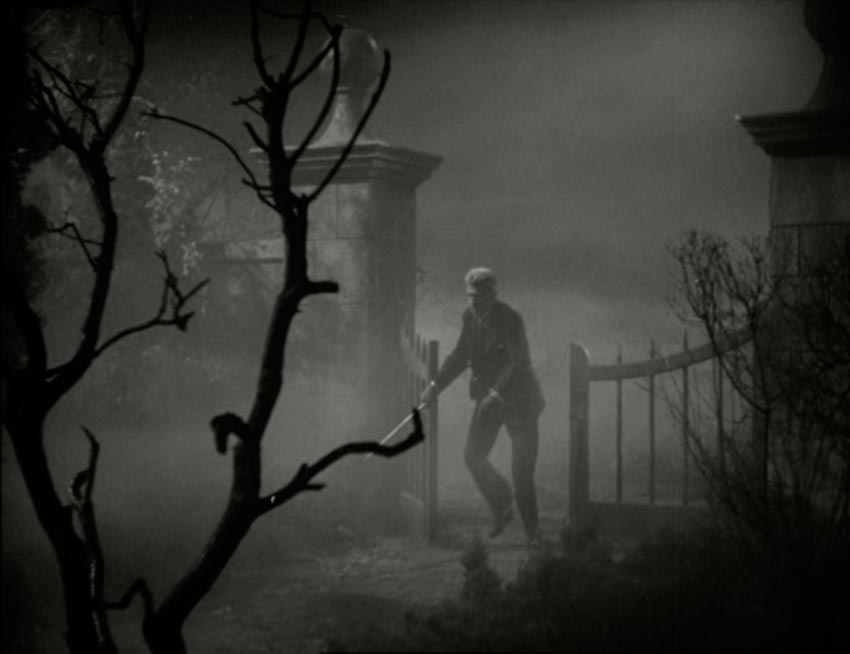
In turn-of-the-century England, mystery shrouds the deaths of the hereditary heads of the Baskerville estate. According to
legend, a vicious hound stalks the descendents of Sir Hugo Baskerville in order to avenge the death of an abducted peasant girl.
Latest to assume the heritage is young Sir Henry, who arrives from Canada after the mysterious death of his uncle. Suspecting
that murder is afoot, the family physician, James Mortimer, sends for Sherlock Holmes and his associate, Dr. Watson, to
investigate. Holmes dispatches Watson to the moors of Dartmoor to protect Sir Henry, while the great detective lurks in the
background, undercover. Before Holmes's appearance at the estate, Watson meets neighbors John Stapleton and his charming
half sister Beryl, the irascible Frankland, and the mysterious butler Barryman and his wife. As the bloodcurdling baying of the
hound drifts across the moors, Mrs. Barryman's escaped convict brother is murdererd while wearing Sir Henry's clothes. This
prompts Holmes to decide that he must set the stage for attempted murder in order to trap the killer, and thus he announces
that he is leaving for London. That night, on the mist-shrouded moor, the ghostly figure of the ferocious hound rushes toward
its victim, Sir Henry, but Holmes and Watson shoot the beast before it can kill its target. Afterward, in the great hall of the
manor, Holmes unmasks the hound's master, John Stapleton, as a distant relative of Sir Hugo and proves that he was jockeying
to place himself in line to inherit the Baskerville estate.
Hours, The ****1/2 2002
http://www.decentfilms.com/reviews/hours.html
http://www.youtube.com/watch?v=yMErdpA804Y
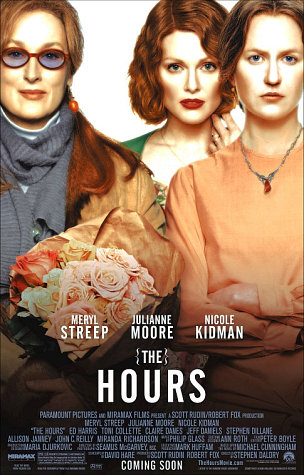
In 1941 Sussex, England, after author Virginia Woolf writes notes to her husband Leonard and sister Vanessa, she walks to a nearby river, places a heavy stone in
her coat pocket, then wades into the river and drowns herself. As housewife Laura Brown awakens in 1951 Los Angeles, her husband Dan is preparing breakfast
while Laura lingers in bed and begins reading a new book, Mrs. Dalloway by Virginia Woolf. In 2001 New York City, Sally Lester returns home early in the morning
and slips into bed with her partner, book editor Clarissa Vaughan. Clarissa is awake but says nothing and shortly afterward rises, for that evening she is throwing
an elaborate party for her best friend, Richard. In 1923 Richmond, England, Virginia joins Leonard in their dining room, but evades his concerned inquiries over
whether she has eaten and instead reveals that she believes she has an opening line for a new book. Fearful that the demands of working might unsettle Virginia,
who has long suffered from severe depression, Leonard nevertheless approves of her spending the day writing as long as she promises to eat lunch. Virginia retires
to her study where she writes the opening line of a book revolving around a single day in the life of character Clarissa Dalloway as she prepares for a party. Laura,
who is five months pregnant, reluctantly leaves her book to join Dan and their son Richie for breakfast and is chagrined to see that Dan has bought her flowers
even though it is his birthday. After Dan departs for work, Laura tells Richie that she intends to spend the morning baking Dan a birthday cake. Clarissa begins
preparations for her party, stopping at a flower shop run by her friend Barbara who asks after Richard. Clarissa explains that the party is in honor of Richard
receiving a prestigious literary prize for his poetry. Barbara mentions having read Richard's single novel, a lengthy and difficult tome that clearly features Clarissa,
then asks if it is purely fiction. Clarissa admits that the book has connections to true events, but Richard has made them his own. After selecting flowers for the
party, Clarissa takes a bouquet to Richard's warehouse loft apartment. Richard, who is debilitated by AIDS, welcomes Clarissa, affectionately calling her by his
long-used nickname for her, "Mrs. Dalloway." When Clarissa fusses over whether Richard has eaten breakfast, he abruptly explodes into anger about the literary
award, suspicious that he is being honored out of pity. Clarissa makes light of the ceremony, but Richard chides her for constantly throwing parties to cover the
emptiness in her own life. Richard confesses to feeling that he has failed as a writer to capture the essence of life. He then reminds Clarissa of a time long ago
when they were young and shared a kiss on a beach and asks her what she wanted of life. He asks if she would be angry if he died and presses to know for whom
she is really throwing the party, concluding that he has remained alive this long only to satisfy her. Annoyed, Clarissa insists that people must remain alive for one
another, but Richard reveals he has no wish to continue living in a continual state of dependence and warns her that once he has died, Clarissa must face her own
life. Virginia is annoyed by an interruption from Nelly Boxall, the cook, who has come at Leonard's behest to inquire about lunch. When Virginia later reminds Nelly
that her sister Vanessa and her three children will be coming to tea and states that she wishes the children to have ginger, Nelly protests that she will have to go to
London to buy some. As a vexed Nelly departs, Virginia observes that it would be delightful to make a trip to London. As Laura gathers the cake ingredients, Richie,
sensing his mother is inexplicably deeply distracted, assures her that baking a cake is not very difficult. Laura agrees and with forced brightness tells her son that
she is making the cake to show Dan that she loves him. After the cake is completed, Laura is considering its lopsided sloppiness with disappointment when she
is interrupted by a visit from her friend Kitty Barlow. Kitty laughs at Laura's ineptness in the kitchen and Laura admires Kitty's ease with people and her healthy
marriage. As the women sip coffee, Laura observes that war veterans like their husbands deserve the security and happiness of a stable home. Noting Kitty's
increasing unease, Laura prompts her to confide that she is checking into the hospital that afternoon for surgery because a growth has been discovered on her
uterus. After Kitty confesses her fear of the surgery and its implications, Laura comforts her and, embracing her, kisses her on the lips. Kitty thanks Laura for her
sweetness and departs. Unsettled, Laura is annoyed to find Richie staring at her, then goes into the kitchen, where she throws away the cake. When Vanessa and
the children arrive an hour and a half early, Virginia anxiously goes out to welcome them. Later, the children find an injured bird and Vanessa tells them the
creature is near death and must be allowed to die. The children decide to give the bird a funeral, but when the boys grow restless, Vanessa romps with them while
Virginia accompanies her niece in a ceremony, laying flowers around the tiny bird's body. Laura lies in bed deeply depressed, then abruptly rises to tell Richie that
they will make another, better cake, then afterward take a drive. As Clarissa's party preparations grow more frenzied, she is interrupted by the unexpected early
arrival of Richard's ex-boyfriend, college professor Louis Waters, who has flown in from California. After Clarissa warns Louis that Richard has been much altered
by the disease, Louis reveals he has read Richard's novel. Clarissa agrees that the book is difficult, but defends it and his decision to kill off the mother figure
abruptly. When Louis admits he returned to visit the summer house in which he, Richard and she once lived, Clarissa admires his courage in facing the past. Louis
is startled when Clarissa then collapses into tears and struggles to convey her sense of doom and feelings of being stuck in the past. In an effort to comfort Clarissa,
Louis acknowledges that he only felt free once he broke up with Richard. After Laura finishes baking a second cake, she leaves the reluctant and crying Richie with
his baby sitter, then checks into a hotel room. Sitting on the bed, Laura, contemplating suicide, lays a number of pill bottles on the bedspread, then reads more of
Mrs. Dalloway . A little later, Laura considers her unborn child and in a moment of desperate struggle, realizes that she cannot kill herself. While Vanessa and the
children chatter over tea, Virginia decides not to have Mrs. Dalloway die in her book. Vanessa chides her sister's absentminded behavior then prepares to leave with
the children. Suddenly saddened and envious of Vanessa's active London life, Virginia hugs her sister and kisses her fiercely on the mouth, and guiltily, Vanessa bids
her sister farewell. After Louis departs, Clarissa's daughter, nineteen-year-old Julia, arrives to help with the party and is disconcerted when Clarissa admits that
only when she is with Richard does she feel alive. Clarissa then describes how years earlier, while spending a day at the beach with Richard, she experienced true
happiness and was certain the moment signified the beginning of a lifetime of happiness. She says she has since realized that that moment was the high point of
her life. Virginia surreptitiously slips out of the house, avoiding Leonard in the garden. When Leonard learns from Nelly that Virginia has departed, he races off,
alarmed, to the village. Finding Virginia at the train station, Leonard demands that she return home, but Virginia refuses, adamantly declaring her sense of
imprisonment in Richmond. When Virginia decries languishing in the country when she longs for the clamor of London, Leonard reminds her of her long history of
mental illness, of her two previous suicide attempts and admits that he fears her illness will return. Virginia maintains that it is her right to live as she chooses and
acknowledges that she too lives with the specter of her own death. When she emotionally declares that given a choice between Richmond or death, she chooses
death, Leonard agrees to move back to London. Laura picks Richie up and is uneasy as her young son appears to understand her unspoken intentions at the hotel.
Richard looks at a wedding picture of his mother, Laura, recalling that day long ago when she retrieved him from the babysitter's home. Clarissa returns to Richard's
place earlier than planned and finds him in a heightened state of anxiety, pulling the shades off all of his windows. When Richard states that he cannot make her
party, Clarissa grows panicked and assures him that he is not expected to receive the award or come to the party. Richard points out that after the event there
would still be the empty hours of life to face. Desperate, Clarissa insists that he still has good moments ahead, but after recalling their past happiness, Richard
thanks her for her love and throws himself out the window. At dinner, Dan thanks Laura for a perfect day and, as she listens uneasily, tells Richie how thoughts of
Laura got him through his days as a soldier in the South Pacific. After dinner, Leonard asks Virginia why someone must die in her new book and she responds it is
so that others may value life more and announces that the visionary poet will be the character to die. As Dan waits in bed, Laura sits in the bathroom, struggling
to compose herself. Dan mentions learning about Kitty's operation from her husband and Laura confesses her concern, then forces herself to go out to her husband.
At the apartment, Sally and Julia help Clarissa clear away the party food when an elderly Laura arrives at the door, after having been informed of Richard's death by
Clarissa. Laura tells Clarissa how difficult it is to outlive one's children, then admits she read her son's book and was hurt that he killed her character, although she
understands why. When Clarissa points out that Laura abandoned Richard when he was a child, Laura explains how years ago she made a decision after the birth of
her second child that she would leave her family and has never regretted it. She describes her life as a housewife and mother as death and asserts that she chose
life. Moments later, Clarissa retires and is joined by Sally, who comforts her, and the women kiss. Virginia writes to Leonard about the beauty of facing life, loving
it and knowing when to put it away, and thanks Leonard for all the hours of their mutual love. ![]()
House on 92nd Street, The***1/2 1945
http://en.wikipedia.org/wiki/The_House_on_92nd_Street
VIDEO
Henry Hathaway’s 1945 film The House on 92nd Street for 20th Century Fox was the first of the documentary-noirs that presaged the gritty realism of Jules
Dassin’s The Naked City in 1948.
Although the story of the FBI’s breaking-up of a Nazi spy-ring isn’t strictly noir, it has all the elements of the police-procedural that ushered in a shift in the classic
noir cycle from the early 1950s: documentary footage with a news-reel feel, stentorian narration, and a rousing musical score. All elements driven towards the
portrayal of a great US institution “implacably” committed to the defense of American freedoms and the destruction of internal threats.
Based on a true case, the producer had full access to FBI surveillance footage and to FBI establishments and staff, and the opening scenes feature J. Edgar
Hoover working at his desk. Wisely director Hathaway chose to shoot in actual New York City locales, and his DP Norbert Brodine delivered NY in compelling
deep focus. Interesting also is the highlighting of then cutting-edge technology used in the pursuit of the spies: including a punch-card reading computer finding
a finger-print match, and spectrography enlisted to identify the brand of lipstick found in a suspect’s ashtray. The whole affair balances real drama with a
solemn purpose that has you engrossed.
What I found particularly fascinating was the adroit expressionism of the tense finale, which is clearly evident in the following frames from the movie. You
sometimes find art in the strangest places.
Read more: http://filmsnoir.net/film_noir/the-house-on-92nd-street-1945-real-drama-with-a-solemn-purpose.html#ixzz23xduQxIF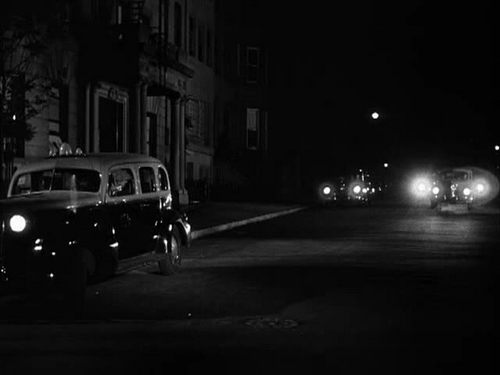
Human Comedy, The ***1/2 1943
http://www.answers.com/topic/the-human-comedy-film-1
http://www.tcm.com/this-month/article/12669|0/The-Human-Comedy.html
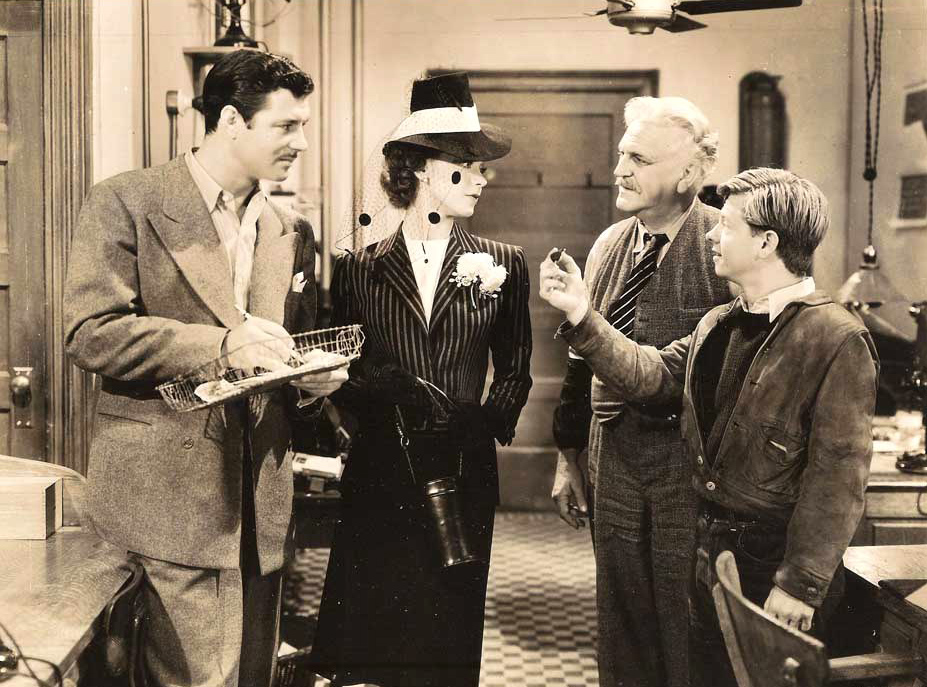
.jpg?timestamp=1333232022506)
Review: I am torn about this movie. On the one hand, I disliked its preachiness, its moral certitude, its life lessons disguised as drama,
and its creepy ending. On the other hand, it was certainly affecting; there were several scenes that were very moving, Mickey
Rooney gives a remarkably effortless performance, and I admired its attempt to be inclusive. Its shameless sentimentalism
presents a picture of and America that I don't think really existed anywhere, and its wide-eyed patriotism seems a little shrill
more than 50 years later. However, it shows considerable talent in direction and acting, and if viewers are able to put their
cynicism behind them, it is an enjoyable film that shows, if not how things used to be, at least how people thought things were.
The film centers on the Macauley family in small-town California. The father (Ray Collins) is dead, and he narrates the film from
beyond the grave, talking to the characters in the film in much the same way as authors used to address "dear reader." The
eldest son Marcus (Van Johnson) is away in Europe fighting World War II; he believes that it is his duty to defend his country
and fight fascism, but he's not so keen on dying, and he's remarkably philosophical about life and death. Since he's away at war,
the man of the house is his younger brother Homer (Mickey Rooney), the focus of the film. Homer is a responsible and
thoughtful young man who has taken a job as a messenger for the local telegraph office; he unselfishly gives his wages to his
mother (Fay Bainter). He also looks after the youngest in the family, Ulysses (Jackie Jenkins). The family is rounded out by Bess
(yes, that's Donna Reed, so you know this film is overly sentimental).
Homer's job gives him his first taste of the "real world." His boss is Tom Spanger (James Craig), a straight-talking and likeable
guy who believes in hard work but is humane enough to help out a penniless man. The other staff member, Willie Grogan (Frank
Morgan, the wizard from The Wizard of Oz), is one of those loveable drunks you see in movies of the 1930s and 1940s; he
instructs Homer on how to care for him if he should pass out (cold water and hot coffee), and he regales the young man with
stories of the old days, but he's also interested in what Homer thinks about life. The film is very patriotic—much screen time is
devoted to discussions of the duty of Americans to give up things, including their sons, for the cause—but it does not shrink
from the horrors of war. One of Homer's first assignments is a heartbreaking scene in which he has to deliver a telegram to a
Mexican woman telling her that her son is dead.
The film is presented in little vignettes, most of which teach some kind of lesson. One that is particularly funny occurs when
Homer and another boy are held after class for fighting. A lesson is taught about respect for elders and fellow classmates,
another is taught about how hard work is better than privilege, and the scene actually ends with Homer exclaiming that he hadn't
known that teachers were human beings like everyone else. It characterizes the movie pretty well: it is shamelessly sentimental,
but I still enjoyed it. I had the most problems with the subplot involving Marcus, the older brother, and his friend Tobey (John
Craven). Tobey is an orphan, and as Marcus regales him with stories about the simple life back home, Tobey begins to insert
himself into the stories. He even believes, without ever having met her, that he will come back to Ithaca and marry Bess—to
which Marcus replies in the affirmative. There's a weird undercurrent in the film about women's roles in wartime: the film
believes that Tobey's wish will come true, and it never stops to consider what Bess would want. The unspoken message delivered
in the final scenes is that it is her duty to take in this stranger as her husband, and she will do it without complaint. It doesn't
help matters that John Craven seems stoned most of the time, with a funny little smile on his face, the "reassuring" smile that
you usually see on madmen in the movies. The film is best when it concentrates on Mickey Rooney, who gives a pitch-perfect
performance. He has an almost preternatural self-assurance that must have come from doing more than five films a year since
1932. The pint-sized actor (who was 23 and playing a 15 year old, which would become a trend that he had difficulty escaping)
deservedly received his second Oscar nomination. http://goatdog.com/moviePage.php?movieID=305
Human Trafficking**** 2005
http://www.youtube.com/watch?v=QtVuPADpSdQ
http://en.wikipedia.org/wiki/Human_Trafficking_(TV_miniseries)
In Prague, Czech Republic, the single mother Helena is seduced by a successful handsome man and travels with him to spend a
weekend in Vienna, Austria; in Kiev, Ukraine, the sixteen-year-old Nadia is selected by a model agency and travels to the United
States with the other selected candidates; in Manila, Philippines, the twelve-year-old American tourist Annie Gray is abducted
in front of her parents. In common, the girls become victims of a powerful international network of sex traffickers leaded by the
powerful Sergei Karpovich. In New York, after the third death of young Eastern European prostitutes, the obstinate
Russian-American NYPD agent Kate Morozov convinces the Immigration and Customs Enforcement Chief Bill Meehan to hire her,
promising him that she would fight against this type of crime and that he would not regret.
Written by Claudio Carvalho, Rio de Janeiro, Brazil
